Odili: Fubara Has Taken Effective Control of Governance in Rivers









Sanusi takes over palace with kingmakers
Ado Beyero relocates to second palace, insists on justice Security chiefs insist on obeying court order stopping Sanusi’s reinstatement NSA denies involvement in return of deposed emir
Ahmad Sorondinki in KanoResidents of the ancient city of Kano were thrown into confusion yesterday as both the reinstated 16th Emir of Kano, Muhammadu Sanusi II, and the deposed 15th Emir, Aminu Ado Bayero, laid claim to the throne.
There was heavy security presence as Sanusi moved into the Emir’s Palace, better known as Nassarawa Palace and sat for the first traditional court session, called Zaman Fada in Hausa, in the midst of Kano kingmakers, comprising council members and some district heads.
Emir Sanusi II appeared in his full traditional regalia to perform his first traditional function at the Emir's house at Kofar Kudu inside the city.
Governor Abba Kabir Yusuf; his deputy, Aminu Abdulsalam, and thousands of supporters were also at the Emir’s palace in show

Mohammad Alhassan; Commander, 3 Brigade, Nigerian Army, Kano, Brigadier General Musa Abubakar Sadiq; state Commissioner of Police, Mr. Mohammed Usaini Gumel; and the deposed Emir of Kano, Alhaji Aminu Ado Bayero, during a meeting between the head of security agencies with the monarch in Kano…yesterday

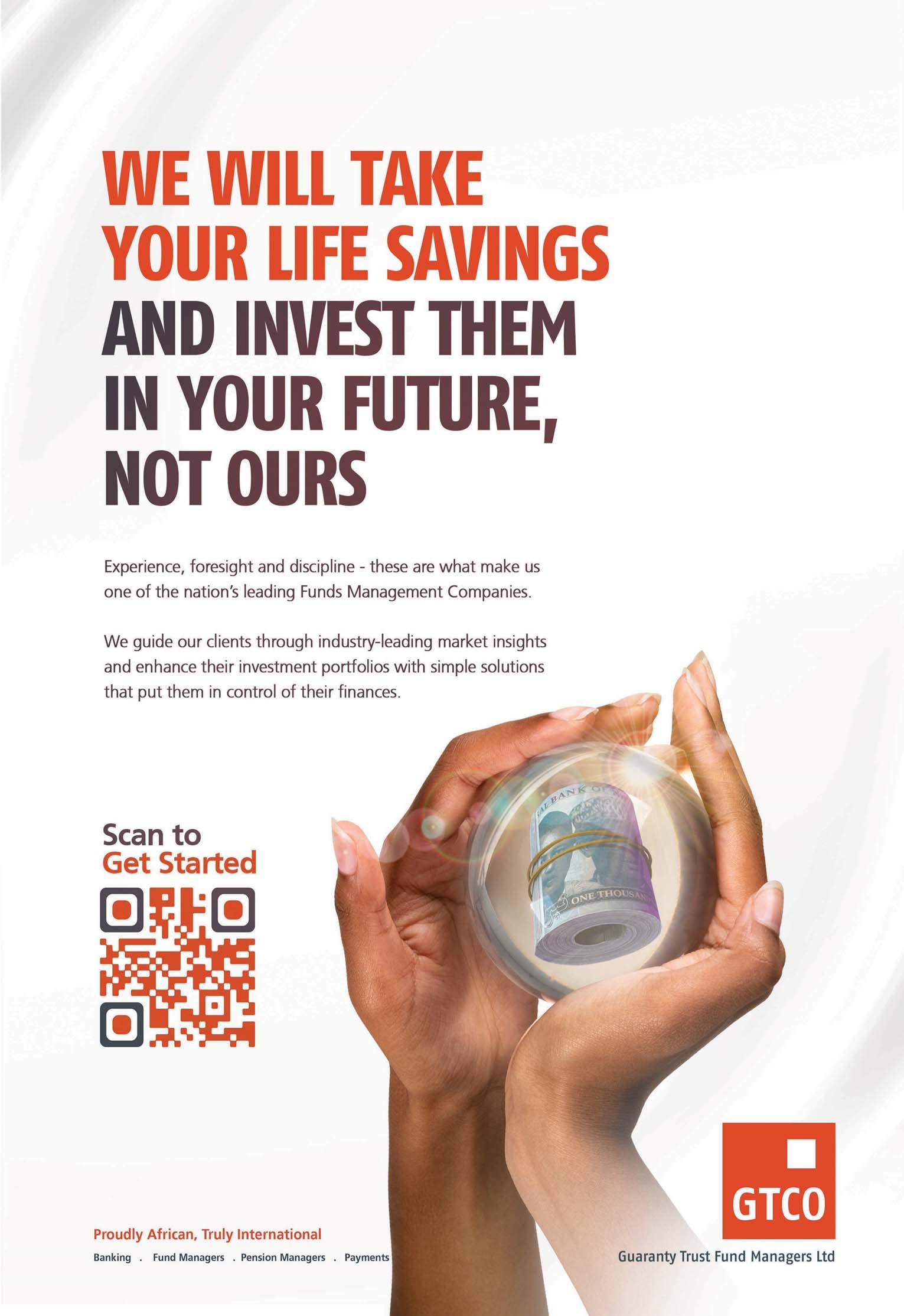


Olawale Ajimotokan in Abuja
President Bola Tinubu has arrived in Lagos ahead of the flag-off of the construction of the Lagos-Calabar highway scheduled for today.
The president was received by the Lagos State Governor, Babajide Sanwo-Olu, and other government officials at the Murtala Muhammed Airport.
The Minister of Work, Mr. Dave Umahi, had on Friday stated that Tinubu would kick off the road’s construction on May 26.
The Special Assistant on Social Media to the President, Olusegun Dada, said Tinubu would inaugurate some projects ahead of his first anniversary in office.
At a meeting with a delegation of Yoruba leaders of thought at the State House in Abuja on Friday, Tinubu said his administration would do all it takes for the average Nigerian to feel the impact of governance.
He said the country was no longer “bleeding” but moving into prosperity, adding that the last 12 months of his administration have been “fulfilling,” despite some challenges.
Meanwhile, the Presidency has released the completed projects President Tinubu will inaugurate in Lagos and Abuja as part activities to mark the first anniversary of his administration on May 29.
President Tinubu would today in Lagos inaugurate the concrete-paved road to the nation’s major ports in Apapa and Tin Can Island. The reconstructed road, which began under the Muhammadu Buhari administration, was financed by the Dangote Group, using its tax credits.
Also on the same day, the president will formally inaugurate, by virtual means, the renovated Third Mainland Bridge as well as, virtually, the rehabilitation of 330 roads and bridges across the country.
"The highpoint of the President’s
engagements on Sunday will be the inauguration of the iconic LagosCalabar Superhighway, estimated to cost about N15 trillion. Work has begun on the legacy project that will connect nine coastal states, with Section Two already awarded to Hitech Construction Limited.
"President Tinubu will return to Abuja on Tuesday to begin another round of commissioning. He will first inaugurate the Southern Parkway, which the Nyesom Wike-led FCT Administration named after him," Onanuga said.
He added that on Wednesday, the President will attend the National Assembly Dialogue Series, after which he will unveil the National Assembly Library Complex, named after him. Afterwards, he will head to the National Assembly to relaunch the commercialisation of Abuja Light Rail, also known as Abuja Metro. He will symbolically join a train ride to the city centre.
The Abuja Light Rail was completed in 2018 by the Buhari Administration and put into commercial use up till 2020. But
following the outbreak of the COVID-19 pandemic, the train service was abandoned and put out of use after its facilities were vandalised by criminals.
It was subsequently furbished and enabled for commercial service by the FCT Minister, Nyesom Wike, who spent over $15 million building access roads to the various stations. Onanuga stated further that after the train ride, President Tinubu will also inaugurate the Wuye-Wuse Flyover-Link Bridge and the Defence Intelligence Agency Headquarters.
A statement by the Special Adviser Information and Strategy to the President, Bayo Onanuga, said of solidarity.
The federal government has disclosed that a British mining and trading group, Glencore, is expected to pay Nigeria a $50 million penalty for its involvement in bribery.
The Attorney-General of the Federation and Minister of Justice, Mr. Lateef Fagbemi (SAN), made the disclosure in Abuja during the ministerial sectoral update for the present administration.
He said the resolution was reached after the federal government entered a settlement agreement with the firm.
“The ministry on behalf of the Federal Republic of Nigeria on April 25, 2024, concluded negotiation of a settlement agreement with Glencore International A.G. wherein Glencore is expected to pay the sum of $50 million as penalty and compensation for certain activities in Nigeria,” he said.
In May 2022, the United States Department of Justice said Glencore, and its United Kingdom subsidiaries, entered into multiple agreements to purchase crude oil and refined petroleum products from the NNPC Limited through shady deals.
In Nigeria alone, the department said Glencore and its subsidiaries paid more than $52 million to the intermediaries, alleging that part of the funds was used to pay bribes to Nigerian officials.
The firm had formally pleaded guilty on seven counts of bribery in connection with oil operations in Nigeria, Cameroon, Equatorial Guinea, Ivory Coast and South Sudan on Tuesday in Southwark Crown Court.
The Serious Fraud Office (SFO) said Glencore attempted to secure access to oil and make illicit profit across its oil operations in the five countries.
Odili made the assertion yesterday, while performing the inauguration of the dualised Omoku-Egbema Road project, in Ogba/Egbema/ Ndoni Local Government Area (ONELGA) of the state.
According to a statement issued by the Chief Press Secretary (CPS) to the governor, Nelson Chukwudi, the former Rivers State governor also commended Fubara for the project delivered in the area, and urged him to remain focused on the people, providing succour to the less-privileged.
"I can tell our people that the next election is very far, but what the governor has done so far, is enough to secure the support of Ogba/Egbema/Ndoni Local Government Area going forward.
"Thank you, Your Excellency,
The SFO found that bribes occurred from 2012 to 2016.
It found that bribes of over $28 million (£22.8 million) were paid via the Swiss-based firm's employees and agents.
The mining giant had also pleaded guilty to corruption charges in the US and Brazil.
Glencore also agreed to pay about $1.5 billion in total to resolve investigations in the US, United Kingdom and Brazil — of which $1.06 billion was payable to agencies in the US and Brazil.
A London court, In November 2022, ordered Glencore to pay a $310.6 million (£276.4 million) penalty for seven bribery offences in relation to its oil operations in Africa.
Glencore had pleaded guilty to five counts of bribery in relation to a total of $26.9 million, which was paid “primarily to officials in state-owned oil companies” in Cameroon, Ivory Coast and Nigeria.
The company also admitted to two charges of failing to prevent bribery over payments of approximately $1 million to agents in Equatorial Guinea and South Sudan, to secure “valuable oil contracts”.
Speaking further, Fagbemi said Nigeria was set to receive about £2.1million in corruption proceeds from the Bailiwick of Jersey.
“The ministry achieved the following successes under its international asset recovery and management efforts,” he added.
“The asset sharing agreement between the Federal Republic of Nigeria and the Bailiwick of Jersey was signed in February 2024 for the return of £2,125,944 proceeds of corruption.”
Fagbemi said the proceeds have been approved by President Bola Tinubu for the continuation of works on the Abuja-Kano Road project.
because the greatest assets of the state remain the people, not oil and gas. The people remain the greatest assets.
"So, once your focus remains with the people, especially the less-privileged, the poor, those who are struggling to feed everyday; once they remain your focus, I want to agree with you that the sky would become the take-off point of your administration," the former governor said.
Odili gave an assurance that the people of the state are behind Governor Fubara, "rallying support for him because they trust him, believing in what he says and convinced that he means whatever he says."
Also speaking, Governor Fubara, has stated that the delivery of development projects and social
Hundreds of hunters and youths stormed the palace last night to provide security for the reinstated emir.
However, Ado Bayero defied the governor, who ordered his arrest for causing tension, and moved into the second emir’s palace, known as Gidan Nassarawa, also in the metropolis, amid tight security.
This is as the state Commissioner for Police (CP), Mohammed Usaini Gumel and heads of other security agencies in the state have insisted on obeying the court order that stopped the governor from reinstating Sanusi.
The security chiefs met separately behind closed doors with the state governor, Sanusi and Bayero.
Justice Mohammed Liman of the Federal High Court sitting in Kano had issued an order seeking to stop Governor Yusuf from reinstating Sanusi and adjourned the case to June 3, for hearing.
The Office of the National Security Adviser (NSA) has however denied an allegation by the Deputy Governor of the state, Aminu Abdulsalam Gwarzo that the NSA, Mallam Nuhu Ribadu was behind the return of Bayero to the state.
Meanwhile, the 15th Emir of Kano, Ado Bayero, who was removed by Governor Yusuf, has defied the governor and returned to the second emir’s palace amid tight security.
Governor Yusuf had ordered the arrest of Bayero for causing tension in the state but security agencies ignored the order and provided the embattled monarch with heavy security.
Ado Bayero prayed for peace in the state amid the ongoing Emirship tussle and also stressed the principle of equality before the law.
He expressed confidence in the triumph of justice, pledging to abide by the dictates of the law, highlighting the significance of Kano as a vital state in Nigeria.
Speaking in Hausa language, the dethroned monarch appealed to the people to uphold the law and patiently await the resolution of this dispute through the legal process.
He said: “I call on the people to
services by his administration will not be politicised.
The governor explained that while every human and societal challenge cannot be solved in one swoop, every promise made would be fulfilled within available resources and delivered on schedule.
Governor Fubara said: "When the project was added to the list of projects to mark our one year in office, there was a challenge, but the contractor assured us of delivering it, which is a reality today.
"What are we doing today? We are here to tell our people that they are the most important thing to us. We are here to assure you that every part of this state will have a positive impact on our administration."
Governor Fubara further said: "If within this short period, we could
remain law-abiding while awaiting the outcome of the legal process in this tussle.
“We call on the authorities to do justice in this matter. Kano is a very influential state in Nigeria. Whatever affects Kano affects Nigeria. May peace reign in Kano. We pray for Allah to bless Kano with responsible and just leaders. Justice is the way to go on every issue. There will be justice. Nobody is above the law. We will accept whatever the law says. I appreciate all the people who have shown concern.
“As I said, justice will take its course. We will keep on praying for peace in Kano State. May Allah the Almighty protect us.”
In a joint press briefing at the Bompai Headquarters of the Kano State Police Command, CP Gumel insisted that all the law enforcement agencies were expressly obeying the court order in suit No: FHC/KN/ CS/182/2024, dated May 23, 2024. Justice Liman of the Federal High Court sitting in Kano had issued an order seeking to stop Governor Yusuf from reinstating Sanusi.
But the governor ignored the order, alleging that the judge was in America when the order was issued.
In the joint statement, CP Gumel said: “The police command is expressly obeying the court order in suit No: FHC/KN/CS/182/2024, dated May 23, 2024 issued by the Federal High Court sitting in Kano alongside all law enforcement agents in the state.
“Therefore, we are calling on members of the public to know that the Police in the State is working together with the military and other security agencies and are with full capacity for providing the adequate security to everyone as we are committed to carrying out our statutory duties as provided by the Constitution of the Federal Republic of Nigeria,” he added.
NSA Denies
deliver this to our people who were yearning for this road, crying and complaining, it is a sign that this government has the interest of the people of ONELGA at heart.
"So, I want to assure you: don't let anyone deceive you anywhere. This is the right boat to join. The captain of this boat, his own mantra is 'The People First'. So, I assure you, with your support, the sky is our beginning."
Fubara said it would be improper for him not to appreciate the people of ONELGA because the campaigns leading to his election kick-started in the area where their support was solicited.
He noted that they lived up to the commitment of giving electoral support, giving the required votes that had enabled his team to be where
Meanwhile, the Office of the NSA has denied an allegation by the Deputy Governor of the state, Gwarzo that the NSA, Ribadu, was behind the return of Bayero to the state.
Gwarzo had told journalists at Emir Sanusi’s palace that: “The National Security Adviser gave two jets to bring the dethroned emir to Kano and to bring him to the palace. We have not understood their intention.”
Gwarzo also accused a former governor of the state and National Chairman of APC, Dr. Abdullahi Ganduje, of allegedly using the office of the NSA to create chaos in the state by smuggling the deposed Emir into the state.
Reacting to the allegation, the spokesperson for the office of the NSA, Zakari Mijinyawa, described the allegation as ‘untrue’, stressing that Ribadu did not provide the aircraft that returned Ado-Bayero to the state.
“I read the comments on social media, it is untrue. The NSA did not provide air transport to anyone to Kano,” he said. He, however, implored politicians to exercise caution in their speech, saying it could potentially undermine the diligent efforts of security agencies in upholding peace within the state.
“Political actors should desist from misinforming the public as law enforcement officials in the state strive to maintain peace and order,” he added.
Meanwhile, former Vice-President Atiku Abubakar has blamed the federal government for deploying security forces to Kano, insisting that the dispute remains under the influence of the state governor.
Atiku recalled that Governor Yusuf enacted a law that repealed Kano State Emirate Council law, which consequently reinstated the deposed Sanusi as the current emir.
He said the action of the federal government contravenes the 1999 Constitution as amended.
Atiku, who made this known in
they are today in government.
Fubara explained the reason for inviting former Governor Odili to perform the inauguration, saying: "This is not politics. This is giving back to our people. So, I want somebody who understands the needs of our people, and what we are doing to come and speak to our people.
"I want somebody who has the direct interest of this LGA at heart to come and speak to his people, so that we will understand that when we are in position, what is important is not self, what is important is the people."
Providing the description of the road, Permanent Secretary, Rivers State Ministry of Works, Atemea Briggs, said: "The 21.6km dual carriageway project was awarded to
a statement by his media adviser, Paul Ibe, warned President Bola Tinubu-led administration not to make any attempt to destablise Kano which has been known for peace over the years.
“It is surprising that in the early hours of today, exactly at about 5:30 am the former Emir of Kano, His Majesty Aminu Ado Bayero backed by Federal might made their way into the Nasarawa Palace of the Kano Emirate while the reappointed Emir, Muhammadu Sanusi II was at the Gidan Dabo, which is the main residence of the Emir of Kano,” he said.
NBA Backs Gov Yusuf as Islamic Scholars Urge Tinubu to Intervene
Meanwhile, the Kano Branch of the Nigerian Bar Association (NBA) has backed Governor Yusuf and the state House of Assembly on the repeal of the Kano Emirate Council Law of 2019.
The association, in a statement by its chairman, Sagir Gezawa, called for adherence to legal and constitutional processes.
The NBA emphasised that it is within the constitutional duty of a state House of Assembly to legislate and once such legislation is passed, it becomes the governor’s role to assent to it.
“Once the governor assents, it becomes law and must be implemented by state apparatus and enforced by a competent court,” Gezawa said.
He condemned the use of men of the Nigerian Army to enforce court orders, calling it a “sad reminder of military dictatorship.”
On its part, the forum of Islamic clergy in Kano, Ulama, has urged President Bola Tinubu to intervene and prevent any actions that may lead to a disruption of law and order in the state.
In a statement signed by 18 members of the Ulama, the clergies expressed their concerns regarding the ongoing dispute over the emirship.
Ulama emphasised that it is important for Tinubu to take all necessary measures to uphold peace in the state.
Sectraco Nigeria Limited on April 28, 2023, by the previous administration at the sum of N7.597 billion but without funding. It has 7.3 meters carriageway on both sides and 8.2km length of drains.
"Before the award of this contract, this road had been abandoned for many years. The current administration led by our hardworking Governor Siminalayi Fubara approached the project with great determination and passion, and as a result, mobilisation was paid to the contractor and the contractor started work in July, 2023. "The scope of the project changed and due to the prevailing inflation rate, an additional N5.47billion was added to the contract, bringing the total value of the contract to N13.07billion."


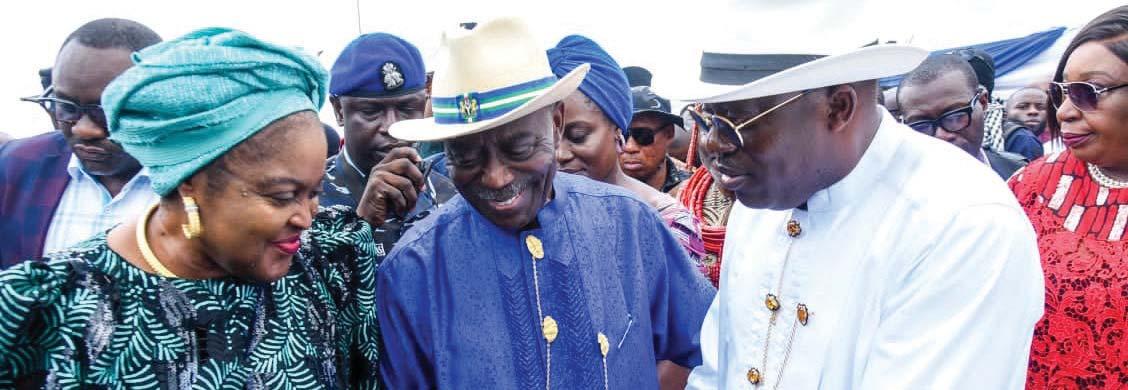
Vows to invest more in state-of-the-art aircraft, equipment to combat insecurity CDS: Security challenges have made the armed forces to evolve joint training
President Bola Tinubu has pledged his government's commitment to prioritising national security and the welfare of the armed forces.
The president also expressed committed to standing with the armed forces through challenges, triumphs, and grief, not as repayment but as an assurance of the nation's unwavering support.
This is just as the Chief of Defence Staff (CDS), General Christopher Musa, stated that the security challenges
confronting the nation has made the Armed Forces to evolve continuous joint training with emphasis on physical exercise and sports.
Speaking yesterday at the Ceremonial Parade to Commemorate the 60th Anniversary of the Nigerian Air Force (NAF) in Kaduna, Kaduna State, President Tinubu, who was represented by Vice President Kashim Shettima, reaffirmed his administration's commitment to prioritising security, noting that development cannot be guaranteed without a secure nation.
"In my inaugural address a year
ago, I noted that security would be the top priority of my administration because we can never guarantee the development we have proposed unless each part of this great nation is secure. This is why we have continued to support the modernization efforts of our Armed Forces to address national and sub-regional security challenges," he declared.
To address national and sub-regional security challenges, the president disclosed his administration's substantial investments in procuring state-of-the-art multi-role combat aircraft, attack helicopters, sensors,
and equipment to enhance the Nigerian Air Force's capabilities.
These acquisitions, including Beechcraft King Air 360 aircraft, Diamond 62 surveillance aircraft, T-129 ATAK helicopters, Agusta 109 trekker multi-role helicopters, and M-346 attack aircraft, aim to boost the nation's combat and airlift capabilities.
President Tinubu called for a whole-of-society approach to tackling Nigeria's security challenges, even as he acknowledged the socio-economic factors contributing to security challenges.
Chuks Okocha in Abuja
President Bola Tinubu, former Vice President Atiku Abubakar and Delta State Governor, Hon. Sheriff Oborevwori, yesterday congratulated elder statesman and foremost Ijaw leader, Chief Edwin Clark on the celebration of his 97th birthday anniversary.
Meanwhile, the Ijaw leader and former Federal Commissioner for Information yesterday again used the occasion of the birthday to reiterate his call for the restructuring of the country if the current security, socioeconomic and other challenges facing it must be nipped in the bud.
President Tinubu in a statement issued by his spokesman, Ajuri Ngelale, joined Clark’s family, friends, and well-wishers to celebrate what he described as an inimitable figure in Nigeria’s political evolution.
The president also saluted Clark for his contributions to the nation in many capacities, especially as a guide to various administrations and as a catalyst for critical discourses and causes in furtherance of national development.
As the elder statesman marked his birthday, Tinubu wished him many more years in good health.
On his part, Atiku, in a statement signed by his Media Adviser, Paul Ibe, described Clark as, “a significant pillar from the old order that fortifies our fortress.”
According to the statement, “Chief Clark has always been a vocal voice
that provides guidance and wise counsels to our national consciousness.
“On his attainment of a good old age of 97, it is only fitting that we join hands to congratulate him for this milestone and to appreciate him for the forthrightness he has always supported us with.”
Atiku further prayed that the Almighty God will continue to bless the elder statesman with more strength and vitality to keep serving Nigeria and humanity in general.
In his congratulatory message, Oborevwori, in a statement by his Chief Press Secretary, Sir Festus Ahon, praised the elder statesman for his dedication to the advancement of the Niger Delta and Nigeria.
The governor stated that leaders, at the national and sub-national levels, have continued to benefit from Clark's astute advice on matters, pertaining to the country and the Niger Delta.
According to the governor, "It is really admirable how much Chief Clark contributed to the resolution of conflicts in the Niger Delta," adding that the people of the region and the Country would remain thankful to the elder statesman.
He said that Clark was still a tenacious and ardent nationalist, with legendary zeal for his people's interests and the peaceful coexistence of Nigerians.
“On behalf of the government and people of Delta, I heartily rejoice with our father and leader, Chief Edwin Kiagbodo Clark, on the occasion of his 97th birth anniversary.
"I join your family and your global admirers in commemorating 97 years of outstanding achievements and enduring fulfillment," he said.
However, Clark reiterated his call for the restructuring of the country if the current security, socioeconomic and other challenges facing the country must be nipped in the bud.
He also called for a more united Nigeria where there would be more jobs created for the youths.
Speaking at his Asokoro Residence, Abuja during a church thanksgiving service held to mark his anniversary, the South-south leader who expressed delight and happiness to God for making him to attain the age of 97, stressed that as the National Assembly reviews the 1999 Constitution, it was necessary to consider restructuring.
He said: “This country must be restructured. President Tinubu should face the political problem of this country for the development of all regions.
“This country has to be restructured so that everybody will be equal; so that every Nigerian can aspire to the position he wants to be.”
Clark, who is the leader of PanNiger Delta Forum (PANDEF) said: “I feel very happy; very much reassured about my own life. I feel very much fulfilled and I give thanks to Almighty God that I am 97.
“I appreciate those who are taking care of my welfare and my security.
I thank Nigerians too.”
Earlier, the Assistant Priest of Saint James Anglican Church, Reverend Canon Bola Ogunyannwo, who
described the celebrant as an individual who has dedicated his life to serving God, said, “He is a very humble man who God has blessed to achieve a lot for our nation. Who has sponsored so many persons to rise to greater positions. Politically, he has done his bit.”
Ogunyannwo also said so far, President Tinubu has achieved a lot with the signing of people-centred bills adding that a lot of other progress has been realised.
He said: “Nigeria that we have today. We are divided, we are not equal. Jobs are been taken by those who think the country belongs to them. We are not united. There is no one country in this country now.
“When people are united, they believe they belong to one nation, they believe the country belongs to everybody and we are all equal. It is then we can say, let’s fight for independence but not today.
“It is too early to commend on the government of Tinubu because Buhari destroyed this country before he left. Nepotism, religion and corruption ruling this country.
“Whoever is the president of this country must realise he is Nigerian first. They are to see to the security and welfare of this country. Not to divide this. Not to feel that only his people are competent, others are not competent.
“Nigeria today is different. We don’t have a Nigeria that we should be proud. The Nigeria we had 1950 and 1966 is different completely.”
He hailed NAF's six decades of service, sacrifice, and patriotism.
He said: "I bear with me today the gratitude of a nation that has watched your transformation into a formidable and resilient organisation, vigilant of the dynamics and complexities of security threats within and outside our borders for this long".
President Tinubu praised the critical role played by the Nigerian Air Force in maintaining regional and sub-regional peace and security, expressing pride in the institution's formidable and resilient transformation over the years.
Expressing confidence in the country's eventual sound economic rebound, he said: "We are confident that this temporary sacrifice will come to an end soon, and the country will be on the sound economic footing we have promised the nation," he stated.
The President paid tribute to the surviving members of the first set of pioneer NAF personnel, veterans, and fallen comrades, acknowledging their bravery, commitment, and service to the nation.
Aligning with the event's theme, "Nigerian Air Force at 60: Leveraging Strategic Partnerships in Aerospace Innovations for Regional Security," President Tinubu welcomed the participation of various partners and air forces from around the world, particularly from Africa.
He stressed the need for collaboration and developing partnerships with friends and allies to collectively address shared threats in the sub-region and beyond.
Earlier, a representative of Courses 37 and 38 of the Nigerian Air Force who retired from the Force recently, Air Vice Marshal Charles Ohwo, recalled “with nostalgia, the moment they were enrolled into the Airforce about 38 years ago."
He noted that seeing the journey from then, he cannot but thank God, adding that many of them had gone unceremoniously from the service.
Meanwhile, the CDS, General Musa, has stated that the security challenges confronting the nation has made the Armed Forces to evolve continuous joint training with emphasis on
physical training and sports.
General Musa said sporting activities are critical to sharpening the physical fitness, mental alertness and skills of military personnel to ensure combat readiness.
He stated this in Abuja at the InterCommand Combat Sports Competition organised by the Nigerian Air Force (NAF) as part of the activities to commemorate its 60th Anniversary. The CDS said the sportsmanship exhibited during the keenly contested activities gave credence to the premium placed on sports by the Armed Forces towards enhancing the combat readiness of personnel.
“It is my belief, therefore, that the continuity and sustainability of this level of training and competition, coupled with the equipping of the Armed Forces will develop the required capacity to overcome these challenges.
“The Nigerian Air Force no doubt places high premium on sporting activities through the annual 10- kilometer walk, route matches, annual fitness test programme and the just concluded combat sports.
“This effort certainly underscored the value the service has given to the physical and mental health of its personnel.
“I encourage you to sustain your drive for personal development, taking cognizance of the fact that human capital remains the most critical component of any organisation, as many studies have shown,” he said. The CDS congratulated the participants for the display of resilience and spirit of sportsmanship.
He added that participants in the combat sports exhibited sacrifice, discipline, self-control, team spirit, tenacity, physical and moral courage, as well as the zeal to win.
“As Nigeria passes through this defining moment in its history, our Armed Forces are required more often than ever before, to deliver on its constitutional mandate of securing our dear country.
“I enjoy you all, therefore, to sustain and improve upon the ideals which you have displayed this evening,” he added.
Also speaking, the Chief of Air Staff (CAS), Air Marshal Hasan Abubakar, said having sound physical and mental health was imperative for the armed forces in discharging their constitutional responsibilities.

L-R: Chairman, Council of Legal Education, Chief Emeka Ngige (SAN); Executive Director, Operations, Nigerian Deposit Insurance Corporation, Mallam Mustapha Ibrahim; Administrative Judge, Federal High Court, Lagos Division, Justice Olayinka Faji; Executive Director, Corporate Services, NDIC, Mrs. Emily Osuji; and Managing Director, NDIC, Mr. Mustapha Bello, at the sensitisation seminar organised by the National Judicial Institute and NDIC in Lagos… recently
The Minister of Interior, Olubunmi Tunji-Ojo, yesterday inspected the newly-installed electronic gates (E-gates) at the new international terminal of the Murtala Muhammed Airport (MMIA) in Lagos, and also explained the importance of the data centre built by the federal government.
This is coming as the Comptroller-General of Nigeria Immigration Service (NIS), Mrs. Kemi Nandap has disclosed that about 107,000 passports were still in NIS offices not collected and urged Nigerians who applied
for the passports to come and collect them.
Tunji-Ojo, however, said by June, the home delivery of international passports would begin.
The e-gates allow automated entry to passengers at security checkpoints and identify individuals using either iris (eye) scanning, fingerprint scanning or facial scanning and also reduces the check-in time of passengers.
Speaking to journalists after the inspection, Tunji-Ojo expressed satisfaction with the ongoing installation and said that when completed, it would be as efficient as the one already completed at the Nnamdi Azikiwe International
Alex Enumah in Abuja
The Attorney-General of the Federation (AGF) and Minister of Justice, Mr. Lateef Fagbemi (SAN), has reacted to the renewed abductions of journalists, saying no one will be held outside the laws of the land.
Fagbemi spoke at the weekend at the ongoing ministerial sectoral briefing to commemorate the one-year anniversary of the President Bola Tinubu administration.
Speaking on what is being done about the renewed “abduction of journalists” from their homes, the minister said the Tinubu’s administration will always operate within the ambit of the rule of law and justice.
He said regardless of whether a journalist is involved or not, “no one will be held outside the laws of the country”.
“You don’t rationalise justice, you dispense it. If people deserve to be released, you release them,” Fagbemi said.
Security operatives have intensified attacks on journalists since the turn of the year.
In March, Segun Olatunji, a former editor of FirstNews, was abducted in Lagos.
On May 1, Daniel Ojukwu, a journalist with the Foundation for Investigative Journalism (FIJ), was detained by the police for 10 days after he was “abducted” by officers in Lagos.
On May 14, Jamil Mabai, a freelance journalist, was detained
by the Katsina Hisbah religious police after being invited to “interview their spokesperson”.
On Wednesday, Madu Onuorah, publisher and editor-in-chief of Globalupfront Newspaper was arrested by operatives of the Enugu State Police Command from his Abuja residence.
However, Fagbemi said the federal government secured 166 criminal convictions within the last one year.
He said his ministry, in collaboration with security and law enforcement agencies, has developed a framework for joint investigations and collaboration.
The AGF said “within the period under review, we secured 166 convictions of criminal cases”, adding that among them were 87 convictions for terrorism cases.
“I’m pleased to report that the ministry has resumed the trial of terrorism cases in conjunction with the Legal Aid Council and the National Human Rights Commission, and other critical stakeholders,” he said.
“The percentage of terrorism cases initiated and terrorism cases concluded within the period has been significant.”
Fagbemi said 13 convictions relating to terrorism financing were also secured within the last one year.
He also disclosed that 625 cases were initiated against the president, the federal government and its agencies before states, federal and ECOWAS courts within the same period.
Airport in Abuja.
“Lagos has three wings. This is Terminal 2. We have the D and E wings. Now you see that the gates have been installed. What they are doing now is called the User Acceptance Test (UAT) which is the last stage and by Monday morning (tomorrow), this wing would have been completed 100 per cent. As it is, it is already installed,” he said.
“In the next three weeks from now, Lagos will be 100 per cent good to go, then we will move to other airports like Kano, Enugu and Port Harcourt, which each have four gates. This will be faster. Lagos airport alone has 21 gates. Lagos is where you have the major traffic,” the minister said.
He identified the importance of the E-gate, which includes improving security, easy passenger facilitation and others.
“The electronic fares are important because of the enhancement of national security.
This is connected to all the databases all over the world. We are making life easier for Nigerians and at the same time securing the country. The passengers get more comfortable and it is more convenient but at the same time the nation is secured.
“Secondly, it enhances ease of doing business. It also helps with perception of the government. When you travel to New York and you get to JFK (Airport), as a foreigner, you are in the queue. The American carries his passport and goes in easily. That gives him lots of confidence that he is in his country. This is called sweet experience and this president is bent on giving Nigerians the sweet experience. It is about changing the narrative and telling us that things we see in other places can work in Nigeria,” the minister said.
On why passport delivery is still being delayed despite promises and assurances he
made, the minister explained that the government had completed the solution but realised that the Nigeria Immigration Service (NIS) data was not domiciled with the agency but in the hands of a private organisation.
“We have completed the whole solution but when we came onboard, we realised that the NIS, the data centre, was not really there. We were leveraging a private company data centre and we appreciate them for that assistance. We think that it is better to create a permanent solution to problems rather than quick fixes. We could have done it in February but we had to build our data centre from scratch to be able to keep the integrity of our data and national security intact. This is more important. It is about national security and I can assure you that we have completed the data centre, which is one of the biggest in Nigeria.”
“We have done all these and
by June we should be able to start,” he added.
“It is disgraceful that NIS is 61 years old and NIS is not custodian of biometric data of Nigeria and we believe that NIS should be in charge of the data of Nigeria. It is not acceptable that this data is domiciled in a third party and that is why we have been able to do this,” Tunji-Ojo said. He also disclosed that the final presentation of the e-visa was done yesterday, which would reduce the visa processing time from 72 hours to 48 hours and make it easier.
Also speaking, the ComptrollerGeneral of NIS, Mrs. Kemi Nandap has disclosed that about 107,000 passports were abandoned by applicants.
“If you have applied for passports, please go and pick your passports. We have over 107,000 passports that have been produced and applicants have not picked them up,” she added.
Chuks Okocha in Abuja
The Labour Party (LP) has dismissed the suspension of its National Chairman, Mr. Julius Abure, by the Edo State chapter of the party over alleged highhandedness and anti-party activities.
Abure was suspended by his Ward 3 in Arue-Uromi, in Esan North-East Local Government Area (LGA) of Edo State and the suspension was ratified by the LGA chapter of the party, and approved by the State Working Committee (SWC) of the party.
His suspension was said to be consequent upon a rigorous deliberation by members of the ward who cited his “highhandedness and anti-party activities in the administration of the party and other myriads of allegations of fraud” levelled him.
A letter of suspension by the Ward dated May 14, 2024, and another letter of ratification by the LGA dated May 15, 2024, were both ratified at a meeting of the state executive committee held on Friday night in Benin City.
According to the ratification letter, “while the suspension is with
immediate effect, you are advised to restrain from holding out or parading yourself as a member of Labour Party, Ward 3, Arue, Uromi in Esan North-East LGA, Edo State.”
The letter of suspension was signed by the Ward Chairman, Thompson Ehiguese and Ward Secretary, Stanley Usiomoh.
The letter of ratification of his suspension, was forwarded to the State Executive Committee of the party by the Local Government Chairman of the party in Esan North-East, Patrick Onogbeni and LGA Secretary, Ehikioya Eromosele.
The letter partly read: “The LGA executive met today, 15th of May, 2024 about 12 noon, to consider the matters presented on the suspension and accordingly found them weighty and the suspension ratified and upheld.”
The State Executive Committee endorsed the decisions of the Ward and Local Government Committee of the party at a well-attended meeting on Friday night in Benin City.
In a swift reaction, the National Publicity Secretary of the party, Mr. Obiora Ifoh, told THISDAY
that the party was not perturbed by the attempt to remove the Abure from office, adding that the suspension was a nullity, citing Article 17 subsection 1 of the party’s constitution, which stipulates that only the National Convention convened solely for the purpose of removal of the National Chairman with two-third majority can suspend or remove the chairman.
In a statement Ifoh later issued, he insisted that the ward, Local Government or even the state has no powers under the constitution to suspend the national chairman.
The statement said: “Against the fake news being disseminated in the media, the national chairman of the Labour Party, Mr. Julius Abure has not been suspended by the ward executive of Ward 3, Arue, Utomi, Esan North East of Edo State.
“The Chairman of the Ward, Thompson Ehiguese, has also in a viral video debunked the purported suspension, insisting that the Ward leadership is loyal to the chairman and also very much aware that it lacks the powers under the constitution
of the party to either remove or suspend a national chairman.
“In the Labour Party’s constitution, Article 17 subsection 1 (2019) is emphatic that only the National Convention convened solely for the purpose of removal or suspension of the National Chairman with two third majority can suspend or remove him. The ward, LG or even the state have no powers under the constitution to suspend the National Chairman.
“Court of Appeal, Benin Division on August 14, 2023, under the Presiding Justice Theresa Ngolika Orji-Abadua in a case brought before it by Lucky Shaibu and others against Julius Abure and others, corroborated with the judgment of the lower court in their ruling that the National Chairman of the Labour Party cannot be suspended or removed by the Ward executive.
“The leadership of the party is however investigating the source of the purported letter of suspension and will summarily act in accordance with the party rules in disciplining any officer of the party found guilty of contravening the rules of the party.”
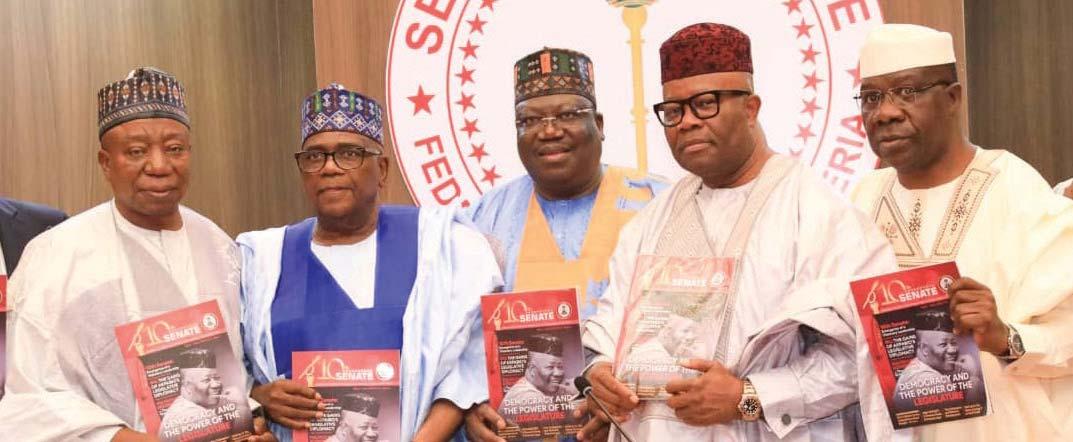
The parents of Joshua Daniel Ejigbo, a first-year student of Computer Science at Veritas University, Hon. Daniel Ejigbo and Mrs. Ifeoma Ejigbo, have strongly refuted claims by the management of the Catholic-owned institution, on the incidents leading to the death of their 17-year- old son, and vowed to seek justice.
The university located in Bwari, the Federal Capital Territory (FCT), has however accused the parents of the deceased of peddling falsehood, stressing that it would not record any gain by murdering its student.
The school also pointed out that it would not be swayed by speculations from what it described as a phantom autopsy.
While the institution, in a
statement by its spokesperson, Mr. Ben Agande, claimed that the student slumped and died during exercise in the gym, the certificate of cause of death as signed by Dr. Jubril Paul of the National Hospital in Abuja, revealed that the deceased died from spinal cord injury, broken neck, blunt trauma and asphyxiation.
The parents who recalled how the news of their son's death was broken to them in an unprofessional manner on April 20 at 11pm, said the Chief Medical Director of the university, who broke the news, informed them that the body had since been deposited at Fatima Hospital, a facility within Bwari.
They recalled that the Bwari Divisional Police Headquarters also reported that the Vice Chancellor of the school, Rev. Fr. Hyacinth Ichoku,
claimed that the corpse had been taken for funeral without meeting officially with the parents of the deceased.
The suspected foul play, the parents said, prompted investigations, with the results signed and released in the presence of the school's representative, as well as those of the family, police and a pathologist.
Hon. Ejigbo also raised concerns over what he referred to as threat to life after a text message from the VC, telling him not to speak with the press.
He said: "On our way to Bwari after being informed in an unprofessional way that my son was dead, I received a text from the CMD, saying that the corpse has been deposited at the Fatima Hospital as if my son was a chicken
and not a human being.
"In the school law, no one leaves the school without confirmation from the parents, which has been the practice since the boys gained admission into their school. Now, I don't know why they quickly took my son and dumped him in a morgue.
"I am a responsible Nigerian and I sent my son there because they said it is a Catholic university, but I think it is just deceit and completely different from what they are claiming. If your child is there, you better think twice because the next person might be your child. Nothing will bring Joshua back, but I must get justice for him.
"The school did not report the case to the police and that's how careless they were. The security personnel at
I Can’t Succeed Without Your Cooperation, Ganduje Tells North-central APC Stakeholders
Adedayo Akinwale in Abuja
The National Chairman of the All Progressives Congress (APC), Dr. Abdullahi Ganduje, has called for the support of all members of the party, particularly party stakeholders from the North-central, stressing that he can’t succeed without their cooperation.
Ganduje made the appeal yesterday while speaking at the APC North-central stakeholders meeting, held in Lafia, Nasarawa State.
The meeting had in attendance Governors of Kwara State, AbdulRazaq AbdulRahman; Nasarawa State, Sule Abdulahi; Kogi State, Usman Ododo; Benue
State, Hyacinth Alia and the Deputy Governor of Niger State.
Other stakeholders include: Immediate-past National Chairman of the APC, Senator Abdullahi Adamu; former Nasarawa State governor, Tanko Al-Makura; former Deputy Speaker of the House of Representatives, Hon. Idris Wase; Senator Banabas Gemade; Minister of Steel Development, Shaibu Audu, among others.
Ganduje said there was an urgent need for party stakeholders to engage in massive sensitisation of Nigerians to properly understand these challenges and the efforts and commitment of President Bola Tinubu towards addressing these challenges.
Ganduje stated: “I would like to reaffirm my commitment to the ideals of our great party to set new standards and benchmarks in the nation’s democratic sphere and ensure the sustenance and continuation of the APC government at all levels.
“Even though it is not yet an election period, we are reinvigorating the party to ensure that come 2027, we will retain and get new state governors, as well as Mr President to secure another mandate to continue with his government’s policies and programmes.
“On the party affair, you may recall that in my inaugural address, I made a commitment to strengthen unity in our party by working
hard individually and collectively. However, for me to succeed, I want to passionately appeal for the cooperation and support of all party members.
“While we are structuring our party into a truly grassroots progressive party, may I also appeal to our governors to support the state party leadership by ensuring that all the state party offices at the ward, local government and state levels are fully functional. This will enable our members across the country to have symbolic representation in their neighborhood. It will also facilitate party activities to roll out all year round, without necessarily waiting till during campaigns or elections.”
Emmanuel Addeh in Abuja
The federal government at the weekend disclosed that it was targeting the construction of about 50,000 housing units annually, stressing that it currently has 6,612 units being developed nationwide.
Speaking at a ministerial briefing held in Abuja, the Minister of Housing and Urban Development, Ahmed Dangiwa, said the projects
were ongoing in states where their governors had offered land to the ministry to build affordable houses for Nigerians.
“Our target since we assumed duty is to increase the availability of affordable housing units across different income segments by an additional 50,000 per year, initiate urban and slum upgrading programmes aimed at improving living conditions, infrastructure and
basic services in informal settlements.
“It will also lead to implementation of policies that promote inclusivity and address the needs of vulnerable and marginalised groups, including persons with disabilities, women, and the elderly,” he stated.
He noted that the ministry’s broad strategy was centred around three core pillars of President Bola Tinubu’s agenda, including growing the economy, lifting 100 million
Nigerians out of poverty, and creating an enabling environment for investments to thrive.
The minister added that the ministry has achieved significant success in the areas of affordable housing provision, slum upgrade, and the implementation of sectorwide reforms to position the housing and urban sector as a critical enabler of social and economic prosperity for Nigerians.
the police post were not aware that someone died and that a dead body was even taken out of the school.
"The next day, I went to the Bwari division to report the case myself officially. When I spoke to the DPO via my brother in-law’s phone, he said the Vice Chancellor, Rev. Fr. Hyacinth Ichoku told him that we are taking the corpse for a funeral. This is what prompted the issue of autopsy. I don't know why the VC whom I haven't met officially till this moment will say such a thing," he added.
In a swift reaction, the school's spokesperson, Agande, accused the parents of peddling false news, insisting that the school would not
be swayed by speculations from a phantom autopsy.
He said: "First of all we deeply sympathise with the parents of our late student over the unfortunate incident. May God console them.
"But let me state categorically that Veritas has no hand in the unfortunate incident as is being baselessly alleged.
"As a demonstration of our transparency, we cooperate fully with every authority, including the NPF that is investigating the circumstances surrounding the unfortunate death of our student. We even undertook to bear the cost of the autopsy that was ordered by the police but the family of our late student declined.
David-Chyddy Eleke in Awka
The federal government has called on businesses in the South-east region to take advantage of opportunities offered by the ECOWAS Free Trade Liberation Scheme (ETLS) to boost their businesses
Minister of the Foreign Affairs, Ambassador Yusuf Tuggar, made the call yesterday, during a workshop on ECOWAS Trade Liberalisation Scheme (ETLS) in Awka, Anambra State capital.
The workshop with the theme:
“Exploring the Benefit of ECOWAS Trade Liberalisation Scheme in the Region,” was organised by the Economic Community of West African States(ECOWAS) for manufacturers, importers, exporters, and, small, medium enterprises (SMEs) in the five states of the South-east region.
The minister who was represented by the Director, Department of International Organisation in the ministry, Ambassador Obinna Onowu, enumerated some of the benefits of gains and opportunities offered by the ETLS.
He said: "The primary goal is to establish a customs union among all member states (ECOWAS) with the ultimate objective of completely eliminating customs duties and implementing a unified customs policy.
"The ETLS represents an ideal opportunity to foster greater economic integration, and unlock the immense potential of intra-regional trade,” he explained.
He stated that the ministry had already organised similar sensitisation in Kano in 2020, and, in Lagos in 2023 for manufacturers, importers and exporters in the North-west and South-west zones, respectively.
The minister emphasised that the ministry viewed holding the programme in the South-east as very critical because of the huge number of the stakeholders in the region.
Another official of the ministry and Head of ECOWAS Unit, Trade, Mr. Yohanna Zacks, stated that ETLS synergises with the African Continent Free Trade Area (AFCTA), and that the relationship creates seamless gateway for free customs duties trade for bonafide manufacturers, and traders under ETLS.
Earlier, Anambra State governor, Professor Chukwuma Soludo, represented by his Chief of Staff, Mr. Ernest Ezeajughi commended the ministry of foreign affairs for the sensitisation workshop. He stated that the awareness being created among manufacturers and traders would help them improve their income and contribute to the boosting of the economy of the region.

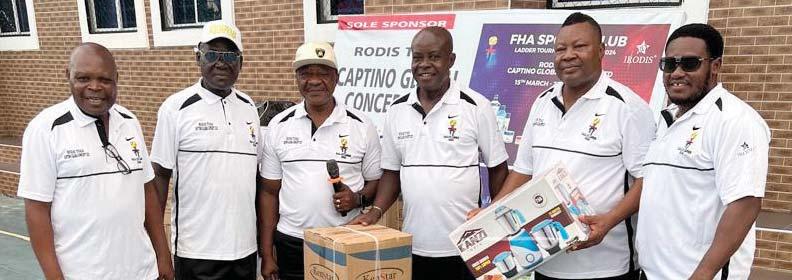
The Independent National Electoral Commission (INEC) has officially released the final list of candidates for the November 16, 2024 governorship election in Ondo State.
The list, which comprised the personal details of the 17
governorship candidates and their running mates was pasted yesterday at the headquarters and local government offices of the commission in the state.
The development implies that 17 political parties met the Monday, May 20, INEC deadline for the submission of candidates list by the participating political
Tinubu’s Administration will Exert Highest Influence on N’Assembly, Says OrderPaper
A new report by OrderPaper Nigeria has posited that the Presidency Bola Tinubu’s administration will exert the highest influence and impact on the National Assembly in the history of the country’s presidential democracy in a way that either strengthens the legislature or reinforces its widely perceived rubber stamp status.
The report, which focuses on the transition of politicians ‘From the Legislature to the Executive (FLEX), is a niche edition of OrderPaper’s Quarterly Policy Review (QPR) series.
The FLEX edition establishes that the character and composition of the Tinubu government are defining factors not only
of its relationship with the National Assembly but also the legacy of governance and democratic imprints the president will leave behind in office.
In a statement, Oke Epia, Founder/Executive Director of OrderPaper Nigeria, said the FLEX report delves into critical but hitherto unexplored facets of Nigeria’s governance architecture and sheds light on the intricate dynamics between the legislature and executive branches of government, adding that the work presents a challenge to academics and research institutions, policymakers, media practitioners and public analysts, among others, to deep dive into the phenomenon in a bid to enhance governance and democracy in Nigeria.
Dahiru Hammandikko Urges Patience, Faith in Tinubu-led Administration
The National Coordinator/ Convener Northern Region
Support Tinubu/Kashim, Hon. Dahiru Hammandikko, has asked people in the country to be patient and have faith in the President Bola Ahmed Tinubu-led administration.
parties.
However, the governorship candidates with their deputies include: All Progressives Congress (APC), Lucky Aiyedatiwa and his deputy, Olayide Adelami; Peoples Democratic Party (PDP), Agboola Ajayi; his deputy, Samuel Ogunmusi; Accord Party (AP), Ajibola Falaiye; his deputy, Samuel lkuyajolu;
Action Alliance (AA), Omolere Akinuli; deputy, Oluwatosin Adeyemi; African Action Congress (AAC), Oluwaseyi Ajayi; deputy, Abiodun Lijofi; All Progressive Grand Alliance (APGA), Olatunji Popoola; deputy, Ayorinde Adedeji, and Allied Peoples Movement (APM), lsaac Ogunfeyimi; deputy, Arowolo Afolabi.
Others are, Action Peoples
Party, (APP), Babatunde Fadoju; deputy, Olarewaju Ajagunna; African Democratic Congress (ADC), Adeyemi Nejo; deputy, Rasheed Ibrahim; Labour Party (LP), Ayodele Olorunfemi; deputy, Olabisi Adu; New Nigeria Peoples Party (NNPP), Oluwatosin Ayeni; deputy, Abike Omoyugbo; and Peoples Redem ption Party
(PRP), Babatunde Alli, deputy, Olusegun Famesa. Others are: Social Democratic Party (SDP), Olusegun Oyebolu; deputy, Gift Dada; Young Progressives Party (YPP), Otitoloju Akinmurele; deputy, Ayodele Obe; Youth Party (UP), Kehinde Adegoke; deputy, Otitoleke Olupitan; and Zenith Labour Party (ZLP), Abbas Mimiko; his deputy, Opeyemi Fadoju.
The Nigeria Civil Aviation Authority (NCAA) has met with travel agents and airline operators to find a lasting solution to issues of flight disruptions, and ticket refund complaints, among others.
The aviation stakeholders, who met at the NCAA office at the Murtala Muhammed Airport Lagos, discussed on issues affecting the sector and agreed on possible solutions.
At the meeting, the Director, Air Transport, NCAA, Mrs
Olayinka Babaoye, told the stakeholders that the meeting became necessary due to rising issues of flight disruptions and passenger complaints.
Babaoye said that it was paramount to strike a balance between the causes of flight disruptions and how messages were related to passengers.
She further added that it would help the agency to get the sides of the airlines, passengers and travel agents to agree on the way forward.
She said, “It is good to hear from both sides because we have called the airline on several occasions, both foreign and domestic airlines.
“To discuss the issue that we keep getting from passengers on disruption, on how cancellations and delays are being handled.
“And I know we worked very closely with NANTA because we were trying to make sure that passengers come first. But at the same time, it is also to balance between the passenger,
the airline, and the country as a whole.”
Also speaking at the meeting, Director, Public Affairs/ Consumer Protection, NCAA, Micheal Achimugu, said that the government through the agency was ready to dish out sanctions where necessary He said both local and international airlines should henceforth be cautious as the hammer could hit any operator, citing the case with the Turkish Airlines and NUATE saga.
Ejiofor Alike
A new professional organisation, Society of Energy Editors (SEE), has been established to promote excellence in energy journalism and strengthen the gatekeeping function of the media in the energy sector.
in the energy industry, which had been lacking in recent times.
With the increasing complexity of energy issues, the promoters of the new association said it was imperative that media professionals covering the sector have a deep understanding of its operations, government policies, and regulatory frameworks.
media professionals who have demonstrated a commitment to accurate and impactful reporting on energy issues.
actively engage in mentoring and knowledge sharing.
He noted that if they believe that tomorrow will be better, they can bear a hardship of today.
According to him, “Remember our human compassion binds us together to learn from the past, pray for today, and have more faith in the future, under the renewed hope agenda.
“However, in every hardship you go through today prepares you for a better and glorious tomorrow, so never stop believing tomorrow will be better than today.”
Hammandikko, who spoke in a statement, said it was nice to see that Nigerians have always held to the hope, the belief, the conviction that there’s a better life, a better world, beyond the horizon. He enjoined Nigerians to keep faith in the current administration, because hope is important, and it can make the present moment less-difficult to bear.
The society’s establishment, according to a statement issued by the Executive Secretary of the new body, Mr. Chuks Isiwu, is a response to the need for in-depth knowledge and nuanced reporting
The statement noted that membership into the body is open to experienced journalists, editors, producers, and
It added that members are expected to uphold the highest standards of journalistic ethics and professionalism, continually enhance their knowledge of the energy sector, which comprises oil, gas, power, solid minerals, community relations, renewable energy, labour relations, energy finance, freight, and technology and
The statement further said, “The Society will publish a quarterly, ‘Nigeria Energy Outlook’ starting from the third quarter of 2024, providing advisory and clarifications on energy-related matters based on available information.
“Additionally, the Society will offer training and retraining programmes for energy reporters and media executives to enhance the depth and quality of media coverage.
National Hajj Commission of Nigeria (NAHCON) has said a total of 18,906 pilgrims have been airlifted for the 2024/1445 Holy pilgrimage to Saudi Arabia.
The agency disclosed this yesterday in a Day 11 airlift update.
The airlifting of the afore-
mentioned number of pilgrims had taken place in 45 flights.
Twenty-three states in Nigeria have yet to commence the airlift of their pilgrims for the 2024 Hajj.
NAHCON on its X handle, #nigeriahajjcom gave the update. A post shared earlier gave a pictorial breakdown of
the total number of already airlifted pilgrims per state, flight and gender.
“Today, Air Peace flight APK7920 departed from Lagos to Madinah at 11:45hrs, carrying 298 pilgrims from Edo State. The group consists of 162 males and 136 females.
“This flight marks a signifi-
cant milestone in the ongoing pilgrimage airlift operations. To date, a total of 18,906 pilgrims have been transported across 45 flights,” it read. The information was confirmed by the National Hajj Commission of Nigeria Command and Control Center in Abuja.
Editor: Festus Akanbi
08038588469
Email:festus.akanbi@thisdaylive.com
As the frustration and disappointment of Nigerian electricity consumers get to a tipping point, Festus Akanbi, in this analysis says government excuses for the uninspiring performance of power sector operators cannot appease the Nigerian people who are incurring heavy losses due to the frequent power failure in the country
No matter which direction one turns to, the narration on the economy is dominated by cries of anger, disappointment, and frustration as Nigerians grapple with deterioration in the frequency of power
To many Nigerians, the nation’s power generation has slipped to the pre-privatisation level as blackouts persist in various parts of
national grid, which plunges the nation into darkness whenever it occurs, electricity consumers say that the failure of the various distribution companies to refurbish their assets has created a scenario where discussions at homes and
Sadly, despite several interventions in the power sector by the federal government, power sector operators have not been able to meet In response to the agitation for an upward the Nigerian Electricity Regulatory Commis-
Customers in this category are said to be
been heavily criticised by many Nigerians,
Business as Usual
experience of residents of high-brow areas of of Lagos, where generators noise disturb the
Speaking on the development, the Nigerian Electricity Regulatory Commission’s Commissioner for Planning Research and but also understandable the circumstances
“I think the current review is seen as part of reforms that are not so easy to accommodate
clear; the cost of producing electricity is always going to be there, the only question you have to around the world, three reviews in four years, considering the scale of the macroeconomic changes we’ve had in our economy, don’t go
From Hands to Mouth
However, critics of the arrangement in the power sector believe the problem started with
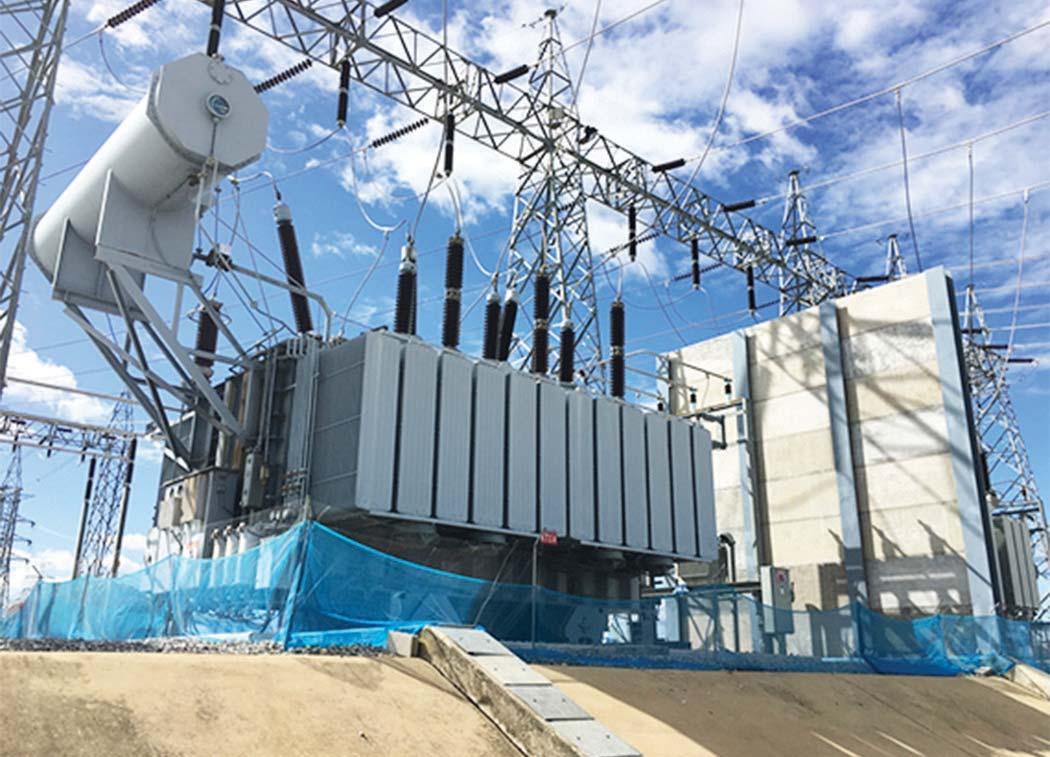
There is the argument that power distribution is falling as a result of the failure of the various
cided to rely on revenue from operations for the bring in money from investors but decided to plow the revenue from operation to the busi-
regular electricity supply by the Discos, the Chairman of the Nigerian Electricity Regulatory Commission (NERC), Sanusi Garba, last week argued that most of the Discos operating in the
To that extent, he noted Discos are unable to pay for invoices sent to them from the electricity
The NERC boss pointed out that the challenges facing the sector were a culmination of all past inactions and missteps by those saddled with the responsibility of managing the sector both
“Today, when you look at distribution companies, they are clearly and technically insolvent, and you also want them to raise capital in terms
“I also want to mention that implementing the power sector reform requires very strong political will to implement decisions that impact
intervention has been approved for the power sector beginning with the payment of about
The minister explained that the government was working to get the distribution companies operations along state boundaries, insisting that their areas of coverage were too large for
to defray the outstanding debts owed to the gas supply companies to power generation
“The payments are in two parts, the legacy debt, approval has been given to pay about
“The payment of the legacy debt will be made from future royalties in exchange for incomes in the gas subsector which is quite
you that we have the consent of the president are reconciled between the government and
“This we have successfully done and it is being
“The debt will be paid in two ways, immediate assures the companies that in the next three to
To cure Nigeria of its incessant electricity chal-
This means that today, only the transmission
segment is still tightly under government
But despite that action, including pumping money into the sector in trillions, there appears what has changed is perhaps the nomenclature
Consumers Rate Discos Low Consumers argued that rather than making excuses for the industry stakeholders, the regulators were supposed to have been hard on the Discos for transferring their responsibili-
consumers have continued to be responsible for the purchase of transformers, electric poles, There were also allegations that the management of a particular Disco deliberately turned down power from Gencos in an attempt to avoid payment whereas the consumers under the disco’s captured areas were expected to
The federal government has also recently acknowledged the drop in Nigeria’s total elec-
The Chairman of the board Of Directors of
be addressed to provide sustainable liquidity
But analysts insist that unless the government can step up regulation, the anticipated

There is a sense in which both Nigerians and Mr. Tinubu share a place in purgatory in the last one year. Both leader and people are dwelling a house of incendiary troubles in waiting for admission into either hell or heaven. To that extent, we all have been in purgatory for the last one year and still counting. The questions are mutually reinforcing: Will Nigerians emerge from here into greater anguish or splendid glory? In turn, will Mr. Tinubu emerge from this place into a place of glory and honour given his troublesome past and current travails at the helm?
Twenty five years of unbroken democracy in Nigeria has taught me something about presidential democracy. The four -year cycles between administrations resolves into three time segments. The first year is for learning the ropes, making mistakes and stumbling to establish an identity. The next two years are for effective governance and head -on confrontation with the promises that inspired a particular presidency. The final year is for succession politics , playing to be re elected if possible.
Effectively then, given this four year template, Tinubu has only the next two years of effective governance to tackle the myriad problems tormenting the nation. He has two years to ensure improved security and chase away all bandits, kidnappers, abductors and sundry criminal gangs from the face of the nation. He has two years to reduce the poverty population to a manageable level, There are only two years to fix dilapidated infrastructure, reduce the national debt burden, return the Naira exchange rate to Buhari levels at least. He has two years to reduce official corruption to an acceptable minimum and put away an accumulated crowd of previously indicted corrupt officials. That is not all. Tinubu and his team have just two years to find food for the hungry, jobs for the army of unemployed youth and reprieve for threatened businesses. Most important of all, Tinubu has to use the next three years at most to restore the hope of Nigerians and friends of Nigeria in the Nigerian promise of a free, diverse but prosperous and united nation.
This may sound like a tall order indeed. After all, the litany of problems that today define the Nigerian reality were not created by Mr.Tinubu. He may have inherited most of them. He succeeded a president who is easily the most unfortunate thing that has happened to the Nigerian nation since inception. Mr. Buhari literally ran the Nigerian state aground and destroyed the very basis of our national cohesion. An economic illiterate and bureaucratic nonentity, Mr. Buhari brought to bear on the affairs of the Nigerian state his trademark incompetence, epic ineptitude and cruel aloofness. His aloof indifference enshrined the idea that perhaps Nigeria did not need a president as the affairs of state and society went on to the exclusion of any perceptible executive responsibility. Worse of all, he reopened old wounds, reignited the hatred that led the nation to war and sought to invade the nation with armed jihadist monsters of his own creation. The dot in a circle president ! But Buhari and Tinubu share a common political ancestry and party platform, the APC. It remains one of the most baffling aspects of Nigeria’s democracy that a party that ruined the nation should be returned to power. Given the complicity of the APC in creating the crises that define today’s Nigeria and Mr. Tinubu’s reluctance to call his predecessor by his real names, he in turn is a co -architect of the present national disaster. Therefore, as President Tinubu prepares to graduate from the apprentice year in office, he cannot outsource the responsibility for the state of the nation. Democracy elects leaders to solve problems, not to read out an inventory of blames on previous dispensations. And we all are entitled to the stubborn hope that those we elect to rule over us will leave us in a better place than they found us. Buhari failed that most elementary demand of democracy, Arguably so far, in all fairness to the man, Tinubu may have given the job his best shot. Simultaneously, he has deployed the judiciary to wriggle out of a controversial electoral victory, assembled an inchoate collection of ministers and key officials and tried to give his presidency a character and a name. No one can as yet call the exact name. No one can accuse Tinubu of not trying so hard to lead and to be appreciated by
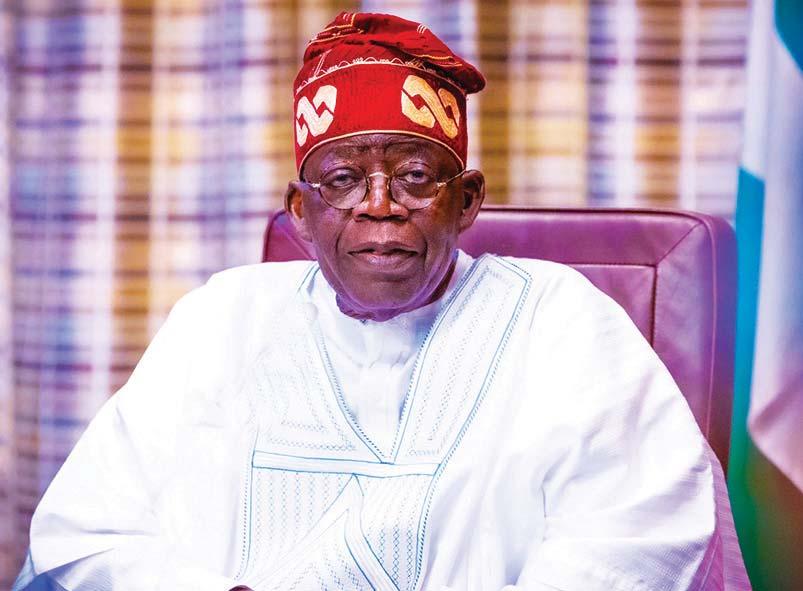
Nigerians.
He literally charged on to the presidential dais with a hell fire storm of controversial policies. He used his inauguration podium to withdraw a controversial gasoline subsidy. Shortly afterwards, he embarked on devaluation of the troubled Naira. Both policies set off a vortex of policy repercussions that have kept him busy ever since. Arguably both policies may end up defining what remains of his tenure and tenancy in Aso Villa because he failed to do one thing: he did not think them through before reaching for the mic.
In what is emerging as a basically reactive presidency, Tinubu has tried to address the yearnings of Nigerians mostly as they arise and not necessarily in any ordered and systematic prioritization format. He has tried to emplace an economic policy to ameliorate the impacts of his initial disruptive policies.
The Central Bank of Nigeria has literally engaged currency speculators in open street fights to dampen the deterioration of the exchange rate of the Naira to major currencies with minute success. The exchange rate continues to do a yo yo dance which has escalated inflation and made uncertainty a permanent feature of the economy in the last one year. An untidy students loan scheme is about to go into a trial run. But no one is sure that this populist scheme, desirable as it is, can in any way redress the decades long decay in the nation’s tertiary education sector. Similarly, an initial reaction to the spread of hardship in the land gave birth to efforts at palliatives. No one knows what has so far happened to earlier efforts to release grains or supply food or cash to the most vulnerable. The general hardship graduated into an epidemic of hunger across the nation. Food riots have occurred in major urban centres while efforts to increase access to food among the poor and vulnerable have been at best chaotic in places.
The president has fared poorly in heal-
ing the wounds of divisiveness in the nation that he inherited from his friend and predecessor, Mr. Buhari. His key appointments unfortunately drip of a sickening level of xenophobic sectionalism. Most strategic appointments have gone to Tinubu’s Yoruba ethnic home base: Army, Customs, CBN, Finance, Police, Power , Transportation, Internal Affairs, Marine economy etc. etc.
In a bizarre backlash, even among the Yoruba South West elite, there is discord. The most outspoken elite of the region accuse Tinubu of favouring mostly the Lagos, Osun and Ogun axis to the exclusion of other components. The core northern elite that helped him onto power have in recent times begun making threatening political noises. The South-east and South-south feel outflanked and excluded. If Tinubu fails as president, it would be deemed that the Yorubas ran the nation into another ditch.
If the current state of the Nigerian economy and society are anything to go by, then we are in a worse place than in the darker Buhari days. Gas station queues are back all over the country as routine supply and logistics planning seem to have overwhelmed the corrupt and inept NNPC. Healthcare costs have shot through the roof as the prices of essential drugs have reached for the skies. Prices of basic need goods are beyond the roof . To worsen a bad situation, we have become a virtual Federal Republic of Taxes as all manner of taxes, levies and tariffs are unleashed on the hapless and already impoverished populace. These range from astronomical electricity tariffs to proposed levies on phone calls, cyber security, increased custom duties and airport transit and car parking fees.
Tinubu has tried his hands at reaching out to the world through a plethora of foreign junkets. In particular, he has tried to deploy his Muslim identity to reach out to the economic powers of the Middle East for economic lifelines. He has visited Saudi Arabia, United Arab Emirates and Qatar. Promises of resuming normal diplomatic and citizen visitation relations with the UAE have been sugar coated but yet unfulfilled. Qatar has refused to play ball yet on investments. The Saudis remain skeptical but are reluctant to tell Tinubu to his face that they cannot trust Nigeria to abide by any lasting agreements as the nation is half Christian.
Europe and the United States remain reticent, knowing that Nigeria only needs to go home and fix its troubles through responsible governance, transparency and greater accountability. For whatever reasons that are only known to Tinubu, the CIA an the Department of State, I cannot see an imminent joint press conference at the White House lawns between Mr. Tinubu and any US president any time soon.
The attitude of the West to Nigeria’s need for economic bailout remains unchanged. If you need assistance, go through the World Ban, the IMF or enter into bilateral agreements with Western nations that trust you enough, Back in Africa, Nigeria remains something of a fading empire. Our influence and stature has been tested in the West African sub region with regrettable outcomes. As leader of ECOWAS, Tinubu failed woefully in containing the coup in Niger Republic. Our failure in that regard led to the eviction of France and the United States as security guarantors in the Sahel, thus opening up the nation to greater jihadist terror while shrinking Western hemispheric influence in the region to the advantage of an ambitious Putin’s Russia.
In terms of style and character, Tinubu has displayed the typical African modern political trait of mixing up constitutional republican democracy with elements of decadent monarchical absolutism. His motorcades are too long and rowdy. His immediate family is too conspicuous in the affairs of state including official delegations to important foreign countries. Worse still, the National Assembly has seemed all too eager to pass nearly every legislation emanating from the presidency while the judiciary is yet to recover from its perceived compromises in its verdicts on election cases that arose from the 2023 contests. In matters of governance, there is a disturbing lack of method in the ways of Tinubu’s maddening crowd. Sometimes the government speaks with too many voices. Communication between president and people is very often mismanaged as the all too frequent presidential absences and disappearances are conveyed through either eloquent silences or conflicting speculations. The road to the future is defined by the mood of the time: it is an interesting time to be alive in Nigeria if you are that lucky to survive till the morning after.
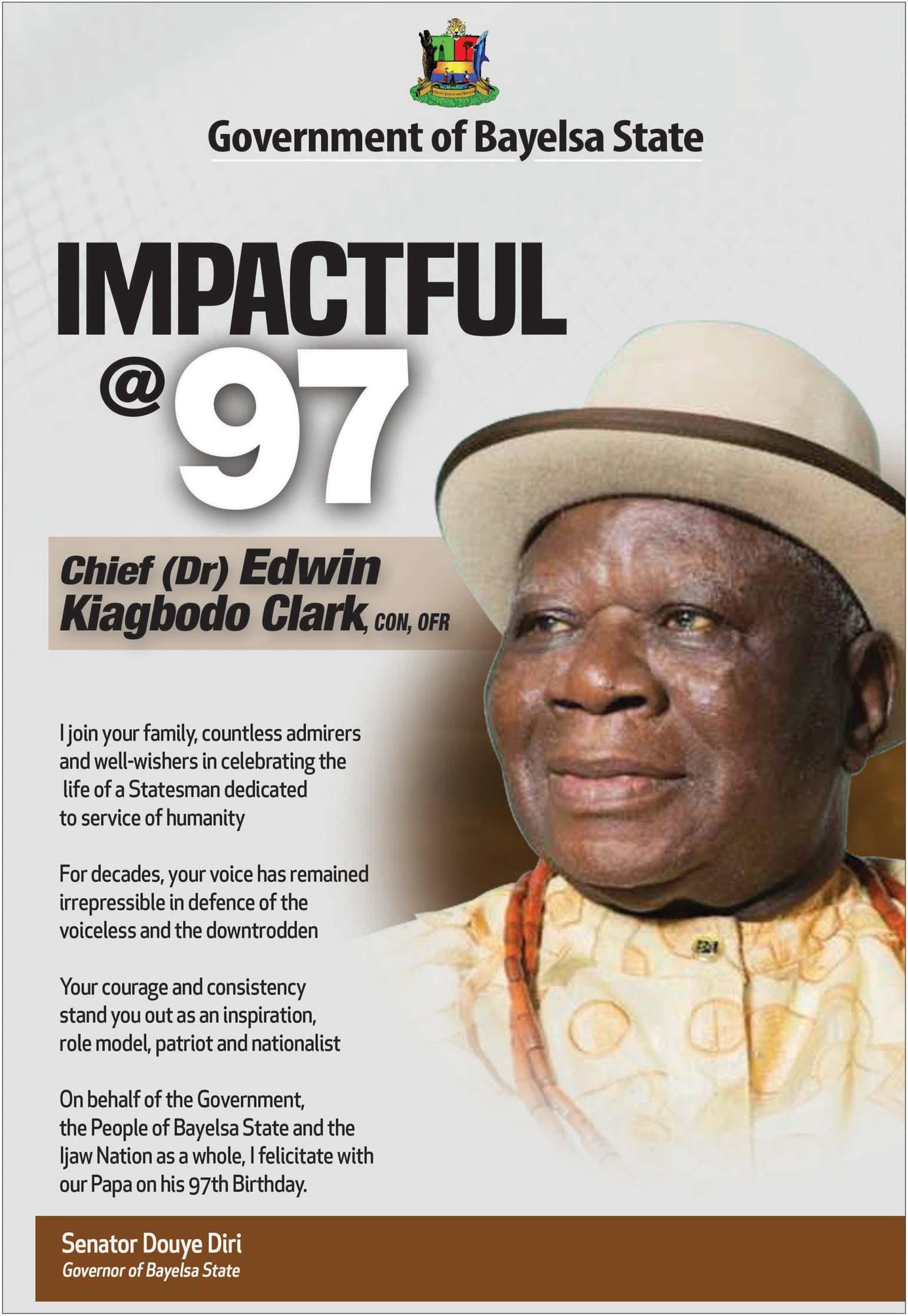

The administration is committed to the development of gas infrastructure to enhance energy supply and boost industrial growth, writes ABDULAZIZ ABDULAZIZ
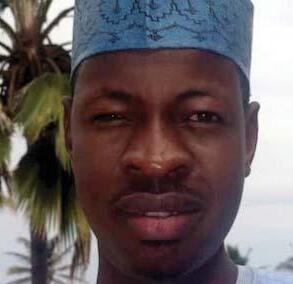
Three distinct events in the course of last week all point to the unmistakable direction of the Tinubu administration in sustainable energy path.
First was the order that government ministries and agencies must prioritise vehicles powered by Compressed Natural Gas (CNG) in their procurement.
The second was the commissioning by the President of three important gas projects through a virtual ceremony on Wednesday. The third in chronology was the announcement of the mass deployment of 530 CNG-powered buses nationwide followed by a heartwarming inspection tour by a federal government team to a company taking the lead in provision of CNG vehicles in Nigeria. We take them one at a time.
At the Federal Executive Council meeting on Monday a bold decision of the government to cease purchase of petrolpowered vehicles was announced. It was a move championed by no other person than President Bola Ahmed Tinubu himself. In considering a council memo for the proposed purchase of 200 Toyota Land Cruiser vehicles for use by the Nigeria Customs Service, the President made a deft move by drafting in his vision for Nigeria’s energy future into the prey. At the end the council agreed that it should be a policy that henceforth government money should not be used to purchase petrol-only vehicles.
The policy has far-reaching implications. With 209.5 trillion cubic feet of proven gas reserve, Nigeria ranks 9th in the world among gas-rich countries. Yet, the country is still far away from full utilization of this abundant natural resource for both domestic use and export. Since his coming, President Tinubu has shown his eagerness to change the Nigeria’s energy story using the potential of our gas deposits.
In driving the point to members of his cabinet, the President noted that Nigeria “will not progress if we continue to dance on the same spot. We have the will to drive the implementation of CNG adoption across the country, and we leading the way to that prosperous future that we are working to achieve for our people. It starts with us, and seeing that we are serious Nigerians will follow our lead.”
As if it were a planned sequel to that powerful statement, two days later, the President launched three salient gas projects with collective capacity to generate $500 million for Nigeria in the next 10 years.
The three milestone projects were the expanded AHL Gas Processing Plant; the ANOH Gas Processing Plant, and the 23.3km ANOH to Obiafu-ObrikomOben (OB3) Custody Transfer Metering Station Gas Pipeline.
Speaking during the virtual inauguration of the projects at the State House, President Tinubu assured citizens that his administration is stepping up its coordination of other landmark projects and initiatives that will ensure the earliest realization of gasfueled prosperity for Nigeria.
The President noted that the projects are fully in line with the Decade of Gas Initiative and his government’s vision to grow value from the nation’s abundant gas assets while concurrently industrialization.
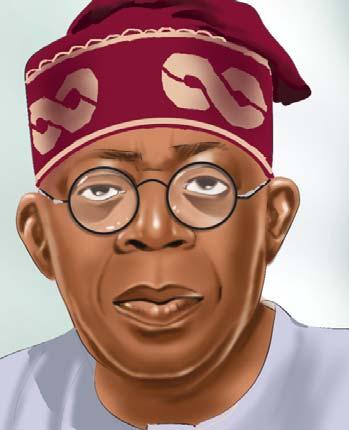
to our country as it demonstrates the administration’s concerted efforts to accelerate the development of critical enhancing the supply of energy to boost industrial growth and create employment opportunities.
“It is pleasing that when these projects become fully operational, approximately 500MMscf of gas in aggregate will be supplied to the domestic market from these two gas processing plants, which represents over 25% incremental growth in gas supply,” the President said in his remarks.
The new projects are purposed to bolster more gas to the power-generating sector, gas-based industries, and other critical segments of the economy which would build into the government’s bid to leverage the nation’s vast gas capacity to drive economic growth.
The president was, expectedly full of praises for the NNPC Ltd under the workaholic GCEO, Malam Mele Kyari, and its partners for heeding to the clarion call to ramp up efforts to accelerate investment and developments of projects in the gas sector on a win-win basis.
For President Tinubu the goals are clear: The government is ready to partner private sector in deepening domestic gas utilization, increase national power generation capacity, revitalize industries, and create multiple job opportunities for economic growth.
At another part of the country on the same day, excited transport sector stakeholders were taken through the governments agenda for CNG vehicles and the torrents of incentives targeted at investors in the new energy vista.
The event was a stakeholders’ engagement for the South West region organized by the Presidential Compressed Natural Gas Initiative (P-CNGi). It was a follow up to the major event held with stakeholders in Abuja to secure their buy in for the government’s vision for the cheaper and cleaner transport sector.
Launched last year, the P-NGi aims to midwife transition into gas-powered transportation in Nigeria. Aside working with private sector players to widen gas infrastructure nationwide, the programme has facilitated opening conversion centres and placed order for hundreds of buses for mass transport on campuses and cities to pilot this new energy source. Michael Oluwagbemi, P-CNGi project director said 530 of those buses would soon be rolled out on our roads.
Twenty five years into elective government, judicial reputation is at all time low, contends CHIDI ANSELM ODINKALU
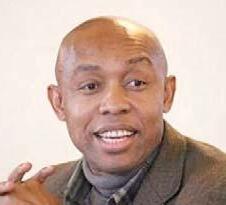
Mohammed Ladan Tsamiya probably believed he was a commodities trader who happened also to moonlight as a Justice of the Court of Appeal. To him, both vocations seemed to provide mutually reinforcing revenue streams. Sometimes, he transacted business as one while doing the other. In keeping with this tendency, it was an unsuccessful transaction in the sale of beans that brought his vocation as a judge to an untimely end.
The story began with the 2015 elections. In Abia State, south-east Nigeria, the parliamentary elections in 2015 were not without controversy. Nnamdi Iro Oji, a losing candidate in those elections, filed a petition with the National Judicial Council (NJC) in January 2016 levying serious allegations of misconduct against Ladan Tsamiya. What follows is from the 19-page report of the NJC Investigation Committee into these allegations. Sunday Akintan, a retired Supreme Court Justice, chaired the NJC’s investigation committee into Mr. Oji’s complaint. The other members of the Committee were Hakila Yalla Hemman, then Chief Judge of Gombe State; and Aloy Nweke Nwankwo, Chief Judge of Ebonyi State.
Mr. Oji complained that around 12 October 2015, after the conclusion of first instance proceedings in his case at the Abia State Election Petition Tribunal in Umuahia, the capital of Abia State, he got introduced to someone “who was in the system”, who took him to a house in Sokoto, north-west Nigeria, where they met with Ladan Tsamiya. After condemning the election petition tribunal as having been “influenced”, Ladan Tsamiya advised Mr. Oji to write a petition to the President of the Court of Appeal requesting a change in the composition of the Court of Appeal panel in Owerri. His application was granted but he was “shocked when he saw that Hon. Justice Mohammed Ladan Tsamiya was one of those sent to Owerri Judicial Division to handle the appeal.”
Over a sequence of encounters which occurred in Sokoto, Gwarinpa (Abuja), and Owerri in Imo State, according to Mr. Oji, Ladan Tsamiya requested him to provide N200 million “to enable him discuss with the three Justices who were to handle the appeal to influence the court’s decision in his favour.” When he seemed reluctant, the Justice of Appeal warned Mr. Oji that failure to deliver the requisitioned sum or a substantial part thereof “may bring a shocking outcome to the appeal.” Specifically, Ladan Tsamiya advised Mr. Oji that “the funds which should be in foreign currency should be brought to him in his private residence in Owerri, Imo State, which was where they met.” Despite having a strong case on the facts, the decision in Mr. Oji’s appeal went the way that Ladan Tsamiya had predicted after he failed to deliver the funds demanded.
These allegations may have been staggering in their substance, but Ladan Tsamiya’s response was not lacking in invention or audacity. According to him, this was a tale of a sale of beans gone awry. Sometime in November 2015, he said, three persons “one Hausa and his two Igbo friends met him in Sokoto and the Hausa man introduced himself as a buyer of beans and ginger which His Lordship said he had in commercial quantities.” He reportedly “assumed that the two Igbos were also interested in buying the commodities.” It was in the course of these conversations, according to Ladan Tsamiya, that “one of them” reportedly asked for his assistance in connection with a pending case at the Court of Appeal. He claimed he declined, telling them that he could not help because he was not their lawyer. The discussions over the sale of beans - according to Ladan Tsamiya - subsequently broke down and could not be consummated.
Unsurprisingly, Ladan Tsamiya’s story of mixing commodity trading with judging proved to be unconvincing. In their report delivered on 22 September 2016, the committee

of investigation found the case against Ladan Tsamiya to be “credible” and recommended sanctions against him. Eight days later, on 30 September 2016, the NJC announced its decision to compulsorily retire him from judicial service.
Twelve years earlier, it was arguably their inclination to do what Nigerians call “chopping alone” that ultimately ended the careers of two other senior Justices of Appeal, Okwuchukwu Opene and David Adeniji. In 2004, the NJC recommended the dismissal of both Justices of Appeal after they collected sundry items of bribery, including N15 million and N12 million respectively to award the contest for the Anambra South senatorial constituency in the 2003 general election to Ugochukwu Uba, who was not a candidate in the contest. James Ogebe, the senior Justice of Appeal then who headed the Court of Appeal panel drafted to Enugu to replace them after the scandal broke recalls in his memoirs that “there was clear evidence of bribery…. They brought a bag containing the money that was not properly closed. A cook who was cooking for them inside the official house even saw it. He was the one who carried the bag inside. They just gave him N10,000 from it.”
Eight years after the end of Ladan Tsamiya’s experiment in occupational crossdressing ended his career, in May 2024, the NJC announced that they “cautioned” Amina Shehu, a judge of the High Court of Yobe State “for issuing Writ of Possession Conferring Title on the Defendant in Suit No YBS/HC/NNR/1cv/2020 when there was no subsisting judgement (sic) of any Court to enable His Lordship issue the Writ.” In ordinary parlance, the issuing of a writ of possession in the absence of an underlying judgment would be a felony crime of burglary, theft, conversion, or stealing. If committed by an ordinary citizen, such a crime would almost certainly have an additional element of fraud. Any person who can commit such an act surely should have no place in any judicial service worth its name. By concluding that the appropriate sanction in such a case is a mere “caution”, the NJC makes it difficult to distinguish a judge from the criminals whom they are supposed to hold to account.
These three cases discussed here hardly differed in terms of gravity. Instead of accountability, the judiciary especially under the outgoing Chief Justice, Olukayode Ariwoola, has converted the myth of judicial independence into a charter for judicial impunity. In the case of Ladan Tsamiya, the Independent Corrupt Practices Commission (ICPC) did launch an investigation after the conclusion of the disciplinary process by the NJC, leading to his arrest. He was later arraigned for trial before the High Court of Imo State in Owerri in July 2019. Five months before the trial, however, in February 2019, the National Industrial Court of Nigeria (NICN) in Abuja presided over by the recently deceased Noelita Agbakoba as judge, set aside the decision of the NJC for having been reached in violation of relevant provisions of the Judicial Discipline Regulations.
T U S N
EDITORIAL BOARD
Chairman
Olusegun Adeniyi
Members
Kayode Komolafe
Chidi Amuta
Mahmud Jega
Johnson Olawumi
Waziri Adio
Okey Ikechukwu
Paul Nwabuikwu
Peter Ishaka
Kashim Ibrahim-Imam
Yemi Adamolekun
Bennth Oghifo
Sonny Aragba-Akpore
Ndubuisi Francis
Asiha Shuaibu
Monday Philips Ekpe
Iyobosa Uwugiaren
Contributing Former Members
Nasir El-Rufai, CON
Udoma Udo Udoma, CON
Maryam Uwais, MFR
Fafaa Dan Princewill
Isabella Okagbue
Aisha Hassan Baba, OON
Eddie Iroh, OON
Bashir Yusuf Ibrahim
Eugenia Abu
Angela Gbemisola Attah
Sonnie Ekwowusi
THISDAY NEWSPAPERS LIMITED
Editor-In-Chief/Chairman
Nduka Obaigbena
Group Executive Directors
Eniola Bello, Kayode Komolafe, Israel Iwegbu, Emmanuel Efeni
Divisional Directors
Shaka Momodu, Peter Iwegbu, Anthony Ogedengbe
Deputy Divisional Director
Ojogun Victor Danboyi
Snr. Associate Director Eric Ojeh
Associate Director
Patrick Eimiuhi
Controllers
Abimbola Taiwo, Uchenna Dibiagwu, Nduka Moseri
Director, Printing Production
Chuks Onwudinjo
To Send Email: First Name.surname@Thisdaylive.com

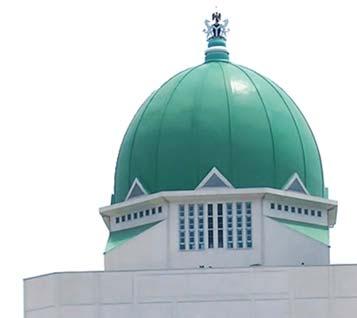
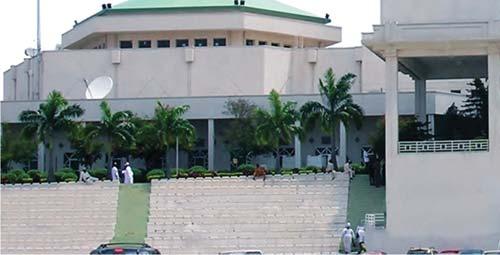
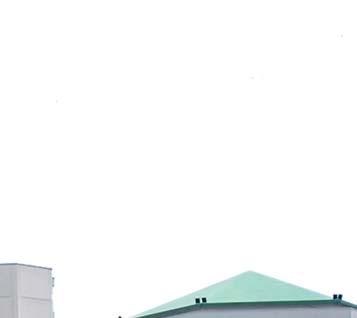
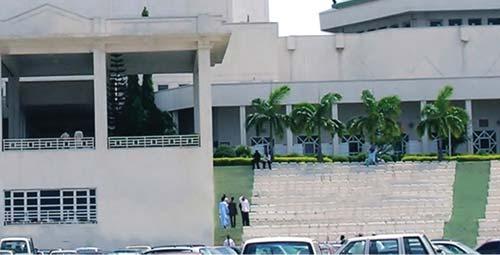


Although James Bennet was speaking about New York Times when he defined the editorial board as “an institutional voice, but not the voice of the institution as a whole”, one can also infer that he spoke to what the board is, or should be about, in any serious publication. For sure, that is what the THISDAY editorial board represents. For the past 14 years, I have been fortunate to share ideas with incredible Nigerians from diverse backgrounds and worldviews brought together to deploy their knowledge and expertise on burning national issues. Some have gone on to be governor, minister, commissioner, special adviser, federal lawmaker, and head of critical agencies, both at the centre and in the states. Although many of these respected citizens are no longer on the board, I have invited some to contribute to this special publication. And for good reasons too.
Whether in the life of an individual or a nation, a silver anniversary is a very significant milestone. It is even more so in this instance, given the political trajectory of our country. Nigeria’s first experiment in democracy lasted just six years. The second attempt was even shorter: Four years and three months. Meanwhile, the Third Republic was aborted before it was even inaugurated. That the current democratic dispensation in our country has lasted a quarter of a century is indeed remarkable.
As Nigeria therefore marks its 25 years of unbroken democracy, it is a time to reflect on the past, celebrate the present and look to the future with optimism. But as we have done on different occasions in the past 14 years that I have chaired THISDAY editorial board, we are pushing the envelope to go beyond the unsigned commentary which represents the newspaper’s position on contemporary issues either on the local scene or in the international arena. We are giving each member, including those that served in the past, a voice. That is what the times demand.
By most demographic projections, the percentage of Nigerians under the age of 25 is about 62 percent while those below 30 is put at about 71 percent. That means we have a generation whose members have only experienced the current democratic dispensation that started in 1999. These young Nigerians may therefore not appreciate the difference between the freedom they now enjoy, even with its imperfections, and the authoritarianism, oppression and the disdain and utter contempt for any form of accountability that defined the era gone by.
However, the contributions in this collection do not make excuses for our failures. Nor are they about the past. They represent the views of (former and current) members, including those who have also, at some point, been critical actors in the public arena. For instance, the imperative of the moment, according to NASIR EL-RUFAI, “is to restore a federal structure that challenges and rewards creative efforts by the states to build up their subnational economies and governance capacity.” For UDOMA UDO UDOMA, who described the failure of the ‘Third Term’ project in 2006 as one of the triumphs worth celebrating, “The effect of what the National Assembly did is that, in Nigeria, the power of incumbency cannot be used, as in some other African countries, to perpetuate anyone in office.”
However, despite whatever may be the benefits of democracy, the hangover of military rule is still very much with us, according to CHIDI AMUTA, who posits that “there is still a general intemperance in the attitude of the people to the value of forbearance as an attribute of democratic conduct.” Both BASHIR YUSUF IBRAHIM and EDDIE IROH take a pessimistic view of our democratic journey with the conclusion that it is not working for most Nigerians. “To be sure, Nigeria’s democracy has, over the last 25 years, been hijacked by imposters who promote personal and private interests at the expense of the nation’s viability and its future,” the former wrote. The latter’s thesis is on the structure of government and governance with the conclusion that “within the federal system exists a financial arrangement that has made the quest for the presidency a quinquennially do-or-die affair.” NDUBUISI FRANCIS is worried about the food crisis in Nigeria for which there seems to be no coherent solution.
Looking ahead, KAYODE KOMOLAFE argues that to develop, we must go back to the era of Development Plans. MONDAY PHILIPS EKPE whose intervention is on the current socio-economic situation in Nigeria concludes that “It’s difficult to comprehend how people are coping with the numerous troubles which undermine all known variables that safeguard their wellbeing.” In individual households, MARYAM UWAIS further argues, “the inability to make ends meet exacerbates social, physical, and mental problems, all of which undermine economic growth.” To address those challenges, AISHA SHUAIBU advocates for “policies that promote equitable access to education, healthcare, and socio-economic opportunities can bridge the gap between the different segments of our society.”
While the concerns of AISHA HASSAN BABA centres on the growing cases of suicides in the country, BENNETH OGHIFO speaks to the neglect of environmental issues by the federal government. Meanwhile, EUGENIA ABU uses what happens in traffic to illustrate the loss of civility in the country. PAUL NWABUIKWU sees a lesson for the country in the recent adoption of Ghana by American music star, Stevie Wonder. And despite different actions that have been adopted and implemented to foster national unity among different ethnic groups, according to IYOBOSA UWUGIAREN, “primitive sentiments have continued to pervade the political system.” While also projecting into the future, ANGELA GBEMISOLA ATTAH proposes that “Our foremost priority should be the preservation and promotion of these values. Let us reclaim our role as a village that nurtures resilient, compassionate, and morally grounded children.”
In the reflection of ISABELLA OKAGBUE, what we practice is “a democracy that does not live up to the dreams of those political and human rights crusaders that fought for the end of military rule all those many years ago.” Until we reinvent Nigerian democracy or refashion it to suit our peculiar circumstances, according to SONNIE EKWOWUSI, “we are simply wasting our time by creating opportunities for those who would steal political power and wreak havoc on the country.”
Taking a philosophical view of our current trajectory, OKEY IKECHUKWU argues that we may be “Tottering, wobbling and flip flopping,” but hope is not yet lost for Nigeria. On the way forward, WAZIRI ADIO contends that “We need to remove the binding constraints to good governance, deepen the democratic temperament of our politicians and citizens.” And FAFAA DAN PRINCEWILL sends a poignant message to the young generation of Nigerians: “You are the anchors of our aspirations, the custodians of our blood-stained legacy.”
By way of a reminder that democracy is still very much preferred to other forms of government, despite its own challenges, I recall my column of 6th January 2000, ‘Who Dares Impound AA375 SHA?’. Hilarious as the recollection may be, the message is important. Overall, notwithstanding the stand taken by each contributor, what we celebrate in this edition is the strength of a democracy in a country where many had long concluded that it is too frail a plant to survive. Now, we have journalists raising their voices without fear and government can be changed by ballots rather than bullets. But this collection is also not just that our democracy has endured a quarter of a century but also a reminder that freedom is never guaranteed. As we can see with the examples of neighbouring countries, sustaining our democracy is a collective responsibility.
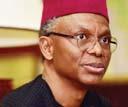
NASIR EL-RUFAI, CON A former Director General of the Bureau for Public Enterprise (BPE) and Minister of the Federal Capital Territory (FCT) between 2003 and 2007, El-Rufai served as governor of Kaduna State from May 2015 to May 2023. Before his foray into politics and public service, he was the founding CEO of El-Rufai & Partners, a quantity surveying consulting firm. He also held management positions with two international telecommunications companies, AT &T Network Systems International BV and Motorola Inc.
Ihad the privilege of chairing the All Progressives Congress (APC) Committee on True Federalism which submitted its report back in January 2018. This committee of distinguished Nigerians was established as part of our party’s attempt to put forward a position on federalism, an issue that has been intensely debated in recent decades. For the sake of our country and its people, we need to put as much passion into effecting what has been agreed, even as we further debate that which is awaiting consensus or resolution. We are in our 25th year of democratic governance, long enough for a panoply of deliberate actions to be taken to undo the distortions injected into our federalism by decades of military rule.
Propelled by ideology or driven by pragmatic desire for a working and dynamic country, many Nigerians see the merit in devolving powers and responsibility to the subnational level. It is seen as key to further unleashing the productive impulse, spurring creativity, rewarding the competitive instinct, and promoting better governance across the states. Devolution of powers will also free the Federal Government of some burdens and enable it to concentrate better on discharging its most consequential responsibilities in national defence and security, monetary and fiscal policy and foreign relations.
Some positive steps towards restoring and practicing federal ethos have recently been taken. The constitutional amendments passed by the 9th National Assembly in January 2023 included significant adjustments to the exclusive list, shifting some important responsibilities like electricity, railways and prisons to the concurrent list. This empowers state governments to regulate the generation, transmission and distribution of electricity, intra-state rail networks and establish correctional facilities. Happily, President Muhammadu Buhari assented to some of the constitutional reform bills enacted by the 9th Assembly. This step towards decentralisation has been reinforced by President Bola Tinubu who swiftly signed the Electricity Act 2023 that bestows on state governments powers to regulate electricity markets within their boundaries.
Some state governments have moved with admirable speed to actualise their newfound regulatory powers in the electricity supply industry. In compliance with the law, the Nigerian Electricity Regulatory Commission has also commendably ceded regulatory powers to such state governments. Given the well-known challenges in the electricity sector, there is much hope that the involvement of subnational actors and the private sector will help mobilise more resources to help address gaps in the sector. Efforts by the state governments to participate in the sector may also help to further build professional, technical and regulatory capacity across the states, to the benefit of all.
There is also renewed interest in decentralising the internal security structure,
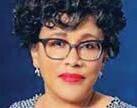
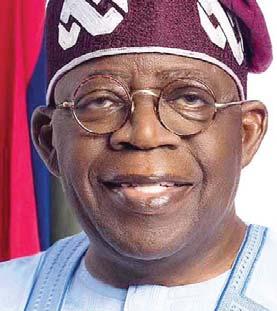

particularly policing. The weaknesses and inadequacy of a centralised police structure in a federation are painfully obvious. Government efforts to secure our people, their property, livelihoods and communities would be enhanced by introducing additional law enforcement footprint at the state, local government and community levels. Such subnational policing structures should be empowered with the necessary resources in personnel, training, equipment and technology to deter and prevent crime, protect citizens, businesses, and property, and to arrest and prosecute criminals. I hope that the conversations going on now would produce concrete measures in this regard, with strong nationwide regulation to address the concerns of those fearful of abuse or politicisation of policing powers by State Governments.
These welcome steps should spur us to complete the work that remains to be done towards reclaiming the federal in the official name of Nigeria. One of this is a conclusive clarification of the status of the local government councils. Nigeria’s federation is a union between its 36 states and the Federal Government. The APC Committee on True Federalism considered it an anomaly that the local government areas are named and listed in the Constitution and that they receive direct funding from the Federation Account. Our committee recommended that local government should be a matter for states which should decide on, legislate for, and fund the type of democratic local government system that best suits them.
As things stand, the contention over local government councils across the country stems largely from the funding that they receive from the Federation Account. In my view, a more prudent, and truly federal, option would be to let the Federation Account fund only the federal and the state governments, while the state governments should then fund and manage governance at the local level as they deem fit, and as reflected in the enabling laws that their respective Houses of Assembly shall enact to that effect. Every state can then have as many or as few local government councils as they may choose.
The APC Committee on True Federalism recommended that the federation be rebalanced, with more powers and responsibilities devolved to the states. Our federal system needs to strengthen the state governments to effectively deliver on the many human capital and infrastructural development responsibilities that are vested in them by the Constitution. Another pending issue is the question of restoring a federal structure in the judiciary. The powers of the National Judicial Council (NJC) should be limited to federal courts (and the Federal Capital Territory), while the state judiciaries should be vested in the State Judicial Councils to be created by constitutional amendment.
OKAGBUE A Professor of law with many publications, Okagbue is a recipient of several honours and awards, including the 1992/93 Fulbright African Senior Research Scholar Award at the Harvard Law School as a Fulbright Fellow, a Butterworths Fellowship from the London Institute of Advanced Legal Studies, and Best Student Prize Faculty of Law University of Nigeria (1977). She is an Honorary Fellow of the Nigerian Institute of Advanced Legal Studies.
Twenty-five years after the restoration of democracy in Nigeria the 2023 Freedom in the World Report rates Nigeria as ‘partly free’ with a score of 43/100 broken down into 20/40 for political rights and 23/60 for civil liberties. It’s not news to anybody following events in the country that Nigeria suffers from a ‘democracy deficit’. What we practice is a democracy that does not live up to the dreams of those political and human rights crusaders that fought for the end of military rule all those many years ago.
I do not intend to linger on the long litany of our many woes but would rather focus on the central underlying theme of normative collapse which we are fast approaching and the implications this might have for a functioning democracy. Every society has a system of norms, values and standards that guide, control or regulate human behaviour. Many of these may be embodied in laws – thou shalt not kill – while others may simply be expectations about proper and acceptable behaviour – curtsey when you greet your elders - for example. Normative collapse is a situation that occurs when there is no longer an authoritative standard that governs human behaviour. When the rules governing conduct are ignored and breached with impunity and dysfunction becomes the norm.
I will focus on one troubling example of dysfunction. The judiciary has been under the spotlight recently. Bizarre judicial pronouncements abound, conflicting decisions are rife, clear precedents set by the superior courts are ignored, law enforcement agencies are restrained from carrying out their statutory functions and electoral tribunals pronounce judgements that strain credulity. The very institution that is designed to protect and enforce the normative order appears itself to be mired in a sea of at worst corruption and at best incompetence that threatens the foundation of democracy – the rule of law.
While recognising the fact of many hardworking and honest judges on the bench a worrying trend has developed of nepotism in the appointment of judges. Professor Chidi Odinkalu in a recent newspaper article opined
BY ISABELLA OKAGBUE“Bizarre judicial pronouncements abound, conflicting decisions are rife, clear precedents set by the superior courts are ignored, law enforcement agencies are restrained from carrying out their statutory functions and electoral tribunals pronounce judgements that strain credulity.”
that there appears to be ‘a conspiracy by those responsible to subvert the rules governing judicial appointments in order to prefer members of their own families or intimate networks’. The Chief Justice of Nigeria for example is alleged to have ensured the appointment of his son, daughter-in-law and nephew as judges and of his own brother as auditor of the National Judicial Council (NJC) an institution which he heads.
It is difficult to fathom how the National Judicial Commission (NJC) appears not to understand the importance of transparency and ethical standards in the appointment of judges and the damage that is done to public confidence in the fair and impartial adjudication of their matters when this is not the case. That the apex authority for the enforcement of legal norms appears to have so badly lost its way is symptomatic of how deep and widespread the malaise is in the wider society. The likes of Justices Kayode Eso, Chukwudifu Oputa and Mohammed Bello (to mention but a few) who were among the leading lights of the judiciary under military rule must be turning in their graves!
The imminent collapse of the normative order invariably negatively impacts democracy. Institutions are hollowed out and weakened, justice for perceived wrongs cannot be achieved, economic development is stymied, the citizenry become disaffected and at the end of a long downward spiral, chaos and state collapse lie in wait. But is this what lies ahead? Nigeria has been described as a country of paradoxes. In the midst of grinding poverty, we have several people on the Forbes list of billionaires. While Nigerians are consistently among the most educated immigrant groups in foreign countries, here at home a staggering 20 million children are out of school, the highest number of out-of-school children in the world. And in the midst of the most rampant and egregious corruption and social dysfunction pockets of excellence exist.
The Independent National Electoral Commission (INEC) Commissioner who in the last elections refused to be bribed into changing the results of a
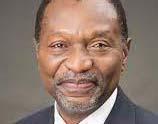
UDOMA UDO UDOMA, CON Lawyer, former Senate Chief Whip and Budget and National Planning Minister between 2015 and 2019, Udoma has also chaired boards of several private and public entities, including the UAC of Nigeria Plc, Union Bank of Nigeria Plc, Unilever Nigeria Plc, Nigerian Securities & Exchange Commission (SEC) etc. He is a recipient of the highest award to a non-Japanese national - ‘The Order of the Rising Sun, Gold and Silver Star’
When I was elected into the Senate at the return to democracy in May 1999, those of us who were greenhorns were full of excitement. However, our excitement was dampened by some of the veteran politicians who reminded us that this might yet be another experiment in democracy that would not last. But 25 years later, we are still going strong. We have been able to manage several crises, including the death of a president in office. A sitting president was defeated by an opposition party candidate, and he conceded without a fight. We have had Southern Presidents, and we have had Northern Presidents. We have had Christian Presidents, and we have had Muslim Presidents. We have even had a President from a minority ethnic group. Our democracy has also survived a number of economic recessions, the Covid 19 Pandemic, Boko Haram militants in the North, secessionist agitators in the Southeast, farmers/herders’ clashes in the middle belt, end-SARS youth discontent and unrest in many parts of the country and militant activity in the Niger Delta. For the last 25 years, despite concerns about Nigeria being turned into a one-party state, we have been able to sustain a competitive multi-party democracy. The Peoples’ Democratic Party (PDP) was the dominant party for the first 16 years, controlling the Presidency, the National Assembly, and the majority of States. Since 2015, for the last nine years, the All Progressives Congress (APC) has now become the dominant party, controlling the Presidency, the National Assembly, and the majority of States. The last presidential election was indeed the most competitive. The winner, Bola Ahmed Tinubu of the APC, won with a vote tally of 8,794,726 which was only 36.61% of the total. The runner up, Atiku Abubakar of the PDP secured 6,984,520 (29.07% of the total). Meanwhile, Peter Obi, who ran on the platform of a relatively unknown Labour Party, was able to garner a total of 6,101,533, which was 25.4% of the popular votes. This tells us that our electoral system is maturing and that there is a real contest for the votes of the people.
There is also no doubt that democracy has delivered on political freedoms. Unlike under the military governments, Nigerians generally feel free to express their views (as they often do without restraint on social media) and associate with whoever they please, without let or hindrance. We are also able to criticize our leaders freely and every Nigerian is free to run for any office, provided he or she meets the minimum qualification required for that office. The press, which was constantly harassed under the military, is also relatively free and extremely lively. Nigerians are proud and jealous of these freedoms. Notwithstanding these successes, there is no doubt that our democracy is still fragile. People complain that some of our political leaders display an extravagant and ostentatious lifestyle whilst many Nigerians are suffering. People also complain that whilst, unlike under the military, the courts are no longer controlled by the government, many of our judges are corrupt and sell judgements to the highest bidder. Many also feel that they are not seeing the economic dividends of democracy. I recall that when I was on the campaign trail there were constant demands for empowerment – both immediate, as in handouts and palliatives, and longer term, as in jobs.
With a population growing at about 2.4% per annum (UN projections) we need more and more jobs to meet the demands of the growing youth population. The slow jobs growth over the years, accentuated by the rising costs of living, is leading to rising dissatisfaction, forcing many of our young people to vote with their feet as they seek greener pastures elsewhere. There is no doubt that our leaders, particularly our Presidents, and our State Governors, have been under immense pressure from Nigerians to deliver better economic performance. We need greater economic success to assure the future of our democracy.
However, a very positive development which is playing a greater role than many realise in sustaining our democracy happened in 2006. One of the greatest triumphs of our democracy was in 2006 when the National
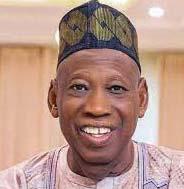
Assembly was able to muster the courage to stop a move supported by the presidency to amend the Constitution to remove term limits for governors and the president. That move was decisively killed on the floor of the Senate. Even now, looking back as a player in that act, I am amazed that we managed to resist the intense political pressure that was mounted on us. This shows that, when it matters, Nigerian politicians can stand up to defend democracy. The effect of what the National Assembly did is that, in Nigeria, the power of incumbency cannot be used, as in some other African countries, to perpetuate anyone in office. Our democracy is one in which we are guaranteed that every eight years, at the maximum, we will have new Governors, and a new President. This guarantee of constant renewal assures Nigerians that no leader will be with us forever. Therefore, as Nigerians, we know that if we don’t like a particular leader all we have to do is to exercise a little patience as we will have a change.
Indeed, a number of credible persons are put off by the process, particularly the party primaries. In many of the major political parties, it is becoming increasingly difficult for a candidate without substantial resources, or a major sponsor amongst the party chieftains, to win. This is an area that our political class will need to address.
However, I am worried that the process of leadership selection is too random. Whilst there is a guarantee of constant renewal, there is nothing to suggest that the general direction of movement is towards improvement in the quality of our leaders. We have had many good leaders in the different arms of Government, and in the States – but we have had many more bad ones. And when we have good leaders, it is by luck. Indeed, a number of credible persons are put off by the process, particularly the party primaries. In many of the major political parties, it is becoming increasingly difficult for a candidate without substantial resources, or a major sponsor amongst the party chieftains, to win. This is an area that our political class will need to address.
We must find a way of improving the party primaries process to encourage our best and brightest to take part in the process, including those with limited resources. A suggestion I made when I was the Senate Chief Whip was for political parties to approach their candidate selection process the same way successful major corporations fill vacancies when they occur. Political parties might wish to consider setting up candidate selection advisory boards in each constituency consisting of credible individuals who have made their names in the business world, in the professions, in academics, in the civil service or in politics. Whilst ruling themselves out of consideration, it should be the responsibility of the members of these advisory boards to seek out talented and promising candidates with established track records, to enrich the field for candidate selection. In addition to asking for applications, head-hunters may be retained to seek out good candidates.
The final shortlist should be prepared after a rigorous interview process and the rationale for each person selected should be set out and available to all members of the party, as well as the general public, for scrutiny. The purpose of the shortlist should be simply to enrich the field as the people who make this final shortlist will still be subjected to the party primaries – whether direct or indirect, depending on the choice of the political party. Ideally these primaries should be conducted either by some form of electronic voting, or, at the very least, voter accreditation should be by some electronic means to give the process credibility. However, no member of the party should be excluded from contesting the party primaries, even those who do not make this shortlist. In this way, we can avoid any abuse of the screening process by the advisory boards. And also, to ensure some continuity, incumbents, who have not reached their term limits, should have an automatic right to participate in the party primaries without being subjected to any selection process.
I am sure that there are other suggestions that can be made to improve the party primaries process. Political Parties should welcome and seek out these ideas. It is important that the political class treat the reform of the party primaries process as a priority because, in the long run, we can only sustain our democracy if we can find a way to ensure a continuous pipeline of talented people from which to elect our leaders.
Let me congratulate all Nigerians as we celebrate 25 years of democracy.
gubernatorial election. The Nigerian Centre for Disease Control (NCDC) that competently led Nigeria’s response during the Covid-19 pandemic and arguably saved millions of lives. The Nigerian Sovereign Investment Authority (NSIA) which has supported numerous projects in road infrastructure, health care, housing, agriculture, youth and education all while earning a substantial return on investment and with no whiff of scandal.
The Duty Solicitor Network (DSN) that organises young volunteer lawyers to visit police stations around the country to ensure that the rights of detained persons are protected. The EndSARS Movement which mobilised young people to vigorously protest police brutality. The Bring Back Our Girls (BBOG) campaign spearheaded by women to tirelessly keep the kidnapped Chibok girls at the forefront of national discourse. The stories of this cleaner here or that taxi driver there who returned lost sums of money which they had found with no expectation of reward. A list which is by no means exhaustive. These institutions and individuals are the little lights that shine
that give us cause to hope that we can find a way forward. What can be done to rebuild the norms and values in our society that are foundational to a successful democracy? The eradication of corruption which permeates every level of Nigerian society would be a good starting point. To achieve this the importance of leadership cannot be overstated. The iconic Singaporean statesman Lee Kuan Yew successfully implemented his vision of a corrupt free Singapore by implementing a top-down approach. His guiding philosophy was simple – a leader should not protect crooked subordinates. A position of zero tolerance for corruption coupled with impartial enforcement targeting both high ranking officials and ordinary citizens equally, carried the day.
In our Presidential system of governance, the body language that emanates from the top sets the tone for everyone else and the top does not just consist of the President but his entire team. The appointment of competent persons of proven integrity into key government positions and agencies is therefore one of the
foundational building blocks of a successful anti-corruption regime. The vigorous enforcement of anti-corruption legislation regardless of whose ox is gored is another. The impartial imposition of consequences for wrongful conduct is vital. When bad actors escape punishment or punishment only attaches to persons in the opposition party, bad actors throughout the system take their cue from that signal and impunity reigns. One must also point out that poverty, illiteracy, unemployment and the existential despair from lack of hope for a better future, if unaddressed, also lead to social anomie and the wide scale breakdown of the normative order. A top-down approach of combatting corruption must therefore also be accompanied by a bottom-up approach of addressing the education and welfare of Nigerian citizens.
We can only hope that 25 years from now we will be celebrating 50 unbroken years of democracy in Nigeria and that the little lights that shine today here and there will have become wildfires that burn brightly throughout the land.

CHIDI AMUTA With more than 30 years in reportorial and management journalism, Amuta has held senior editorial positions as foundation Member, Editorial Board, The Guardian; Chairman, Editorial Board and Editorial Adviser, The Daily Times Group and, until 1999, Chief Executive, The Post Express. Amuta holds a First Class Honours degree and a Doctorate of Philosophy from the University of Ife (now Obafemi Awolowo University), where he taught Literature and Communications Strategies for ten years before moving to the University of Port Harcourt.
Aquarter of a century down the path of democracy, Nigeria’s steps are still largely those of a toddler rather than the strident steps of a confident adult. Whatever gains democracy has made in this place are hard to acknowledge and tenuous in nature. Indeed, 25 years after the recovery of the country’s democratic heritage from the clutches of the military, the world now counts Nigeria as a democratic state. But many Nigerians will look at better democracies and argue that it is not yet Uhuru here. Of course, there are other Nigerians who would concede that given where we are coming from, some progress is on record.
Yes indeed, the outlines of formal democracy are everywhere now in evidence. Periodic elections have taken place every four years at federal, state and local government levels. All manner and levels of elected officials hold the reins of power and authority at the various levels of government. The pomp and festivity of state are on full display as well, giving the observer the assurance that indeed democracy is alive and well in Nigeria.
The vocabulary of public discourse has also come to feature the terminologies and manners of democratic society. People now insist on ‘constitutional rights’ and ‘due process’. The courts insist on the rule of law as the take off point for judicial interventions in most disputes especially those between the state and individuals and among arms of the state and their institutions. A younger generation of Nigerians that have gone to school in the past two and half decades are however ready to rehash their rights under the law and use this awareness to challenge the agencies of state in their daily dealings with the civil populace.
Twenty-five years of formal democracy is a commendable duration given the history of the country which went through over four decades of sporadic military despotism. This inglorious past has left lasting imprints on the disposition of the populace. People still expect governments to act with ‘immediate effect’, the dispatch of battle commanders. There is still a general intemperance in the attitude of the people to the value of forbearance as an attribute of democratic conduct. People are impatient with authority to bring about desirable goals. In relations between the military and the civil populace, violations of civil democratic rights are often not questioned legally. Civilians get beaten up in public places while persons in uniform tend to see themselves as higher in entitlements than their civilian compatriots. Of course, some progress has been made in relation to earlier years.
Yet in the global headcount of democratic states, Nigeria occupies a prominent position. And for many good reasons too. First, we are too many to be ignored. A nation of over 200 million people that opts for a democratic form of government should at least be acknowledged in a count of democratic states. We come after India in the ranks of populous democracies, slightly behind Brazil. We choose our leaders through a periodic electoral process, imperfect as it often is. The three arms of government are on full display with an implicit separation of powers that, in our case, very often entitles the executive to ride rough shod over the rest.
In addition, Nigerians are noisy by nature, which conveys the impression that we are a robustly free people. We are compellingly aggressive and very competitive which inevitably conveys a high degree of economic freedom on our society. We are diverse and have a permanent tendency to be chaotic and even unruly, which often justifies the recourse of governments to draconian methods. Therefore, governing Nigerians according to the rules of liberal democracy can be a nerve-wracking undertaking that constantly sends rulers back to the drawing board or exposes them to ridicule by a battering public opinion.
In spite of the outlines and appearances of a democratic polity, Nigerian democracy suffers four major setbacks that ought to occupy the attention of statecraft and scholars in the years ahead. Firstly, our democratic institutions do not have resilience and therefore are subject to bend to the whims and caprices of changing leaderships and power merchants. Presidents and governors have often privatized the police, the judiciary and even the apparatus of state bureaucracy to serve purely private ends. These institutions tend to yield to the manipulations of incumbents and, to that extent, fail to serve the wider needs of the nonpartisan populace. We have seen judges rule on the side of incumbents on matters of a political nature. We have seen the police commandeered into domestic chores of people in power or with excess money. A democracy in which the institutions of state are not sufficiently resilient to check the excesses of incumbent executives cannot serve the needs of a constitutional republic committed to equity. In such a state, the institutions exist to serve private needs while the commonwealth becomes an extension of the private fiefdom of politicians and moneyed oligarchs. Incidentally, of all the institutions of democratic society that ought to undergird democratic conduct, it is perhaps the presence of a fairly free and independent press that has tended to keep democracy on its feet. But Nigerian politicians have in recent times learnt to ignore journalists. As recently as the Tinubu government, there have been police and military abductions and detentions of journalists for no justifiable reasons. Secondly, because of the frailty of our democratic institutions, elected leaders tend to constitute themselves into laws unto themselves. In the contest between people in power and the institutions of state, we have tended to have a dominance of ‘strong men’ over feeble institutions. Our post -military democratic history has been mostly about strong men, some of whom were former generals, at the expense of institutions. It has been about Obasanjo, Buhari, Jonathan and now Tinubu. The tendency has been to allow the emergence of virtual kings and absolutist monarchs who bend the rules of the constitutional republic to amass powers, privileges and benefits to varying degrees of excess. This is made worse by the repeated emasculation of the legislature through material blackmail and partisan muzzling.
BY CHIDI AMUTA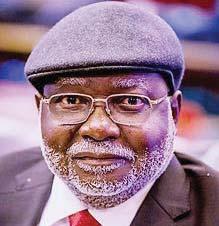
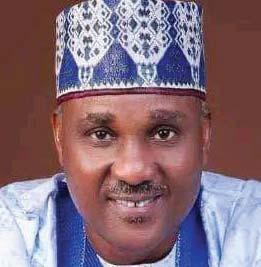
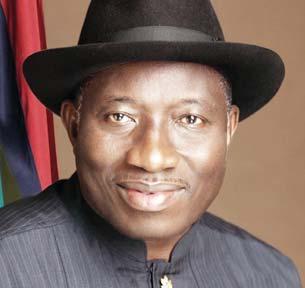
Unchallenged executive excesses have led to pseudo monarchical excesses. We have had presidents with interminable motorcades, where the first family becomes a virtual royal family with its members interfering with the functions of state and appropriating privileges that should ordinarily belong to either elected or duly appointed state officials. The consequent escalation of the cost of governance has led to inexcusable fiscal rascality that shows up annually in the abuse of the budget process. We have seen the allocation of scarce state resources to inessential costs like endless renovations of state residences and offices as well as the purchase and maintenance of fleets of expensive luxury vehicles, yachts and airplanes. Meanwhile schools, hospitals, social welfare programmes and poverty alleviation are starved of funds.
In the consolidation of the monarchical indecencies of the executive presidency, the republican essence of Nigerian presidential democracy is sacrificed. A president that was elected to be a fellow citizen becomes a man above laws, rules and norms. He becomes the law and rises above the common expectations of ordinary folk. Distance between the leader and the people is the greatest enemy of popular democracy. The direct communication between leader and people is replaced by the pompous pronouncements of glorified court minions empowered by the state.
Perhaps the third and most dangerous pitfall of our democracy so far is the failure of the system to invest in growing a culture of democracy among the general populace. A democratic country without a democractized populace is an empty shell. Form must be complemented by content in order to have that equilibrium that truly qualifies a state to be called really democratic. So far in Nigeria, popular awareness of democratic rights and norms tends to be limited to voter education during mostly election seasons. There is no systematic and continuous project for expanding citizen awareness of the major planks and rudiments of democratic behaviour.
The very constitution on which our democracy is anchored is a distant volume which is hardly read and understood by even the highly educated citizens. This contrasts sharply with what obtains in even the advanced democracies where citizen democratic rights are constantly in focus in schools, civil society organizations and daily life events. In such situations, awareness of democratic rights becomes part and parcel of daily living. People know, canvas and stoutly defend their democratic rights at every turn. And when those rights are transgressed, they go to court and expect justice instead of judgments as in most of our own case. Consequently, majority of Nigerians hardly know their rights in a democracy. People merely go out to vote when it is election season and then move on with their lives and wait for the next election season.
The final and perhaps most fatal flaw of Nigeria’s democracy to date is the unfortunate disconnect between the formal structures of democracy on the one hand and the more serious business of national development on the other. The essence of democracy ought to be the right of the people to choose their leaders with the corollary responsibility of those elected to deploy available resources to make the lives of the people livable and also advance the business of national development. The implicit dictum of every democracy is the obligation of those elected to leave the nation better than they met it through conscious policies and programmes. It also implies an obligation to further consolidate the state for it to safeguard the people in perpetuity.
A democracy in which the institutions of state are not sufficiently resilient to check the excesses of incumbent executives cannot serve the needs of a constitutional republic committed to equity. In such a state, the institutions exist to serve private needs while the commonwealth becomes an extension of the private fiefdom of politicians and moneyed oligarchs.
In the Nigerian instance in the last 25 years, we have had the unfortunate scenario that each successive democratic regime seems to leave the nation a bit more degraded than they found it. In this regard, we can identify administrations of both long dark nights as well as those of bright flashes in the last 25 years. We have had an efflorescence of hope, optimism and decisive progress under President Obasanjo’s administration from 1999 to 2007. We have had a brief season of hope and principled administration under the short lived Yar’Adua stint.
Similarly, President Jonathan is mostly remembered for his epic indecisions, his adolescent grade knowledge of national issues and fickle handling of issues of high-level public-sector corruption. When we get to the Buhari administration (2015-2023), we are confronted with an incubus of incompetence, inefficiency and state capture by and on behalf of a section of the polity. Governance became lackadaisical and mostly absent-minded. The apparatus of state was left adrift while an indifferent sovereign went about his personal welfare from long overseas medical vacations to needless junkets to places where Nigeria’s interests were hardly in question. A national economy was run aground as debts piled and the Central Bank printed as much worthless Naira notes as it deemed fit to keep the bubble bouncing.
It would seem that the more Nigeria’s democracy has lasted and expanded, the worse the country’s record on the indices that define a working state have fared. In all of this, Nigeria under successive democratic dispensations in the last 25 years has been sliding back on most development indices. In many respects- insecurity, poor population, high cost of governance, inflation, exchange rate, cost of living, educational regression, healthcare decay etc., Nigerians can hardly find anything to cheer. On many of these indices, Nigeria has become a measure of most things negative.
It does not mean that democracy is antithetical to national development and progress. I suspect that Nigeria’s problem is twofold. The sheer cost of the Washington-type democracy that we have chosen is too high for an economy that is highly undeveloped and consumption oriented. More importantly, it does seem that somehow, Nigerian democracy has yielded an elite that is most interested in the perks of high office and not in the hard work of using public office to develop the nation.
The overall outcome that stares us in the face is therefore a curious situation where the nation may be intact but the state is unraveling right before our eyes. One conclusion seems to tempt us: a bad democracy can degrade the nation and erode the state. When both are imperiled, the citizens become lost for words or speak about the tragedy in different tongues.
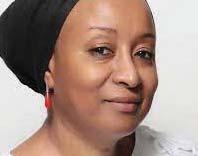 BY MARYAM UWAIS,
BY MARYAM UWAIS,
MFR Uwais is a lawyer, the Special Advisor on Social Investments to Muhammadu Buhari from 2015 till 2023. Appointed a member of the advisory group to accelerate progress of the sustainable development goals (SDG) by The Bill and Melinda Gates Foundation, Uwais is a recipient of National Human Rights Commission Awardee for Outstanding Contributions in the Advancement of the Rights of Women and Children in Nigeria, 2015 and the ‘Public Social Intrapreneur’ award by the Schwab Foundation for Social Entrepreneurship.
Despite having the largest economy and population in Africa, Nigeria has the 7th lowest human capital index in the world and is said to be the world’s second-largest poor population, after India. In individual households, the inability to make ends meet exacerbates social, physical, and mental problems, all of which undermine economic growth. These challenges manifest in poverty, unemployment, violence, poor education and public health outcomes, as well as insecurity.
After numerous attempts at poverty reduction, the Federal Government of Nigeria created the National Social Investment Office in November 2015, to promote a more equitable distribution of resources to vulnerable populations. Unfortunately, the efforts of that office have been characterised by turbulence in recent times. Political, constitutional, structural, and administrative challenges have continued to bedevil efforts to reduce poverty. Specific difficulties relate to the poor continuity of programmes; the dearth of data; as well as comprehensive information on actual expenditure on social interventions. Other issues that disrupt the best of intentions and planning include the territorial nature of the various Ministries and Agencies in program implementation, inevitably resulting in siloed outcomes or duplicity; unreliable reporting, insufficient resource allocation; overlapping and skewed donor funding; the lack of effective, inclusive coordinating governance platforms; as well as the dearth of transparent and effective initiatives engaging in research, monitoring and the measurement of progress.
Poverty remains endemic and pervading, irrespective of culture, religion, or political affiliation. Incongruously, social interventions in Nigeria have been characterized by a culture of entrenched partisanship, nepotism, and a sense of entitlement. Despite numerous initiatives targeting the poor, powerful individuals (often parading as politicians) frequently exploit social investment programs for personal political gain, rather than for supporting those in need. Sound political will is now necessary to ensure that only the truly deserving receive government support. The narrative in the Nigerian social space must shift towards insulating poverty reduction from politics. It is time to establish a fresh social contract between the government and its citizens. The powerful must focus on serving all Nigerians, not just their party or vested interests. With poverty affecting 63% of the population (133 million people) according to the 2022 multi-dimensional poverty index, authentic service must remain at the core of all government undertakings.
In Nigeria, Sub-National units (States and LGAs) are constitutionally mandated to provide primary education, primary healthcare, and empowerment to all citizens, including women, youth, children and the aged within their jurisdictions. However, aligning policies and priorities across all States has proved to be a complex and complicated task, leading to varying priorities, thereby hindering progress amongst the States. The FGN should consciously restrict itself to setting targets, coordination, advocacy, and monitoring, as well as analysis & research, without being directly involved in implementation. At best, the FGN should collaborate with and support States and LGAs on social interventions, for sustainable progress in the aspiration to achieve the SDGs within designated timelines.
The unique challenges of each Nigerian State require tailored targets to achieve specific SDG(s). States and LGAs have the competence and capacity that can be harnessed, incentivized, and strategically supported through a specialized Federal team established to focus on coordination, monitoring, and incentivizing compliance around mutually agreed targets, while continuously building capacity at all levels to meet specific needs and the peculiarities of each jurisdiction. Such a team should, however, have a direct reporting line to a compelling Sub-National authority, as well as to the human capital development-related Ministries, to ensure buy-in, continuous engagement with policy and alignment with those saddled with the relevant mandates for execution.
Mention should also be made of the tendency of elected leaders to focus more on the more ‘visible’ outcomes, whereas the intangible is just as important. For example, prioritising the construction of school infrastructure as part of the education budget, without addressing such other important factors as social protection (for the parents), maternal and child health, teacher training, and security concerns can undermine effective learning and full classrooms. These subtle intangible aspects require extensive data collation, continuous training, surveys, and analysis over a minimum of 3 to 4 years as evidence of verifiable performance, making these issues less appealing to politicians who are elected to serve a 4-year term. Interestingly, even private sector entities seem to be more focused on immediate returns on investment, and consequently, longer-term outcomes are often deprioritized, even where essential for wholesome impact. We must depart from the norm of focusing clinically on singular issues, without including other vital, interconnected elements.
It must be emphasised that whether manifest, or not, all inter-related factors must be prioritized and factored into implementation, to achieve the desired goals. A comprehensive strategy that involves all the vital components is key to
BY MARYAM UWAIS, MFR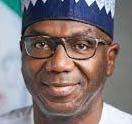
successfully addressing poverty, not only the palpable evidence of ‘brick and mortar legacies.’ Poverty is multidimensional, requiring a holistic approach that factors in relevant sectors due to the interwoven nature of the underlying issues. Thankfully, Nigeria has adopted the multi-dimensional poverty index for measuring poverty as it has proven to be a more accurate tool for measuring poverty.
To effectively address poverty concerns, dealing with population growth is essential. Effective planning and resource allocation for quality education and healthcare are impossible to achieve with unrestricted numbers. Nigerian politicians often avoid this topic due to political, religious, or cultural sensitivities, but no faith promotes having children beyond the parent's capacity to provide for and nurture them. Paradoxically, the poor tend to have more children than the well-off, for varying reasons. This critical but sensitive narrative needs to be handled with discretion at the highest levels, and also include our faith-based and community leaders.
The big elephant in the room relates to governance and corruption. Corruption is pervasive at all levels in Nigeria and often undermines poverty-related interventions. While sufficient resource allocation has been a struggle, the mismanagement of funds and the lack of transparency (including claims of ‘ownership’ by the appropriating arm) in government allocations can only result in ineffective execution. Innovative and integrated financing are critical, and the private sector, donors and development partners, philanthropists as well as impact investors should be encouraged to complement budgetary releases, especially because experience has shown that external finance has the effect of securing government resources in any given project, given the additional scrutiny. Addressing income inequalities requires targeted social investments for marginalized communities, while promoting economic empowerment and social inclusion across all government levels. Vested interests persist in disregarding or belittling the existence of reliable data (instead of interrogating same for updates), just so that they can sustain the subjectivity and influence as the pattern for targeting. Additionally, security challenges like insurgency, communal violence, and crime disrupt social investment activities and hinder progress. Developing painstaking guidelines linked to verifiable data, is a pre-requisite for measuring impact.
Despite numerous initiatives targeting the poor, powerful individuals (often parading as politicians) frequently exploit social investment programs for personal political gain, rather than for supporting those in need. Sound political will is now necessary to ensure that only the truly deserving receive government support.
For all of these initiatives, technology must be utilized to achieve scale and objectivity in poverty alleviation. Robust feedback and grievance redress mechanisms are essential to ensure continuous improvement across Nigeria's vast and diverse landscape. Authentic data is essential for measuring poverty reduction efforts, allowing for continuous monitoring and research. Strengthening data collection, analysis and research are an imperative for evidence-based decision-making, accountability and socio-economic growth. Beyond sound databases, technology offers hope in diverse areas, such as through the concerted efforts of social entrepreneurs and Fintechs working assiduously in this space. Despite strident efforts to improve access to education, healthcare, and livelihood opportunities, too many Nigerians lack quality services due to inadequate facilities, and the shortage of skilled personnel. To address youth employment and underemployment, sustainable livelihood opportunities, mentorship and the promotion of entrepreneurship are crucial. Governments must enhance financial inclusion and literacy, as the provision of financial services to the disadvantaged is the foundation for empowerment. Furthermore, Nigeria's vulnerability to climate change impact (such as droughts, floods, erosion and desertification) necessitates incorporating climate resilience strategies into social interventions to mitigate risks and enhance community adaptive capacity. In conclusion, investing in Nigeria’s voiceless populace faces numerous challenges that mirror the country's broader socio-economic issues. Key obstacles include the politicisation of initiatives and infrastructural deficiencies such as unreliable electricity, poor transportation networks, and inadequate communication systems. The media must commit to amplifying the voice of the poor by engaging them directly, although the messaging must be circumspect due to the cultural sensitivities. The Federal structure presents difficulties in terms of alignment, but this can be overcome through an innovative approach that does not attempt to usurp the mandate of States, LGAs and especially communities, where such interventions should commence from. Poverty reduction interventions must, however, acknowledge and navigate around these imperfections, as we can hardly wait for everything to be in place, before stridently working towards poverty alleviation.
Today, vested interests and a sense of entitlement remain prevalent, disrupting objective implementation through power and influence. Addressing these challenges requires a concerted and collective effort from governments, civil society, the media and the private sector. Strong political will, adequate resources, policy reforms, institutional strengthening, advocacy, close monitoring and enhanced collaboration among stakeholders are essential. We must prioritize comprehensive, efficient, objective, and transparent social interventions, to ensure security and stability in our dear country, Nigeria.
As a country, we also must develop consensus on the application of fiscal federalism and the control of mineral resources. Let us discuss and settle the question regarding whether the vesting of land in the states by the Constitution and the Land Use Act should be extended to include ownership and control of minerals below the land, including oil and gas resources. That scenario will see the Federal Government collecting royalties and taxes, while retaining control of all offshore minerals in the continental shelf and the recently enlarged extended economic zone, in accordance with public international law.
The APC Committee on True Federalism had worked in the hope that its report would help enhance nation-building. Our consultations and deliberations highlighted the enduring appeal
of federalism across the country. The patriots that negotiated our independence in the 1950s built a national consensus on federalism, with strong regions and a weak federal government. Federalism as a principle was made even more appealing over the decades by the evident distortions and clear limitations of military rule. The apparent failure of the creeping centralisation that set in after the tragic events of 1966 to build a strong Nigerian state and an efficient political and economic system has further reinforced the argument for federalism.
Excessive centralisation has neither strengthened national unity nor encouraged a productive instinct. As I observed during a Chatham House talk on restructuring in 2017, “unitarist and distributive impulses did not accelerate the evolution of national
unity nor encourage productive endeavour. Rather, it created a rentier economic structure.” A federal restoration will help correct this.
This country was birthed as a federation. The imperative of the moment is to restore a federal structure that challenges and rewards creative efforts by the states to build up their subnational economies and governance capacity and frees the Federal Government to better discharge its core responsibilities to secure the country, grow its economy and be the leading voice of the Black race in international relations. A unique opportunity beckons for the federal and state governments and the 10th National Assembly to further accelerate the evolution of a better functioning federation within the next 12 months.
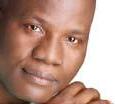
KAYODE KOMOLAFE A journalist with over 30 years’ experience, Komolafe has participated in numerous international conferences in Journalism, labour, democracy and development including the Leadership and Simulation program at J.Mac Robinson College of Business, Georgia State University, Atlanta, Georgia, USA. In 2013 he was inaugurated into the National Human Rights Commission Governing Council. Currently THISDAY Deputy Managing Director, Komolafe holds a first degree from the University of Calabar, Calabar, and a postgraduate certificate from the International Institute of Journalism Berlin, Germany.
Time was in Nigeria when planning was an indispensable part of economic management. That was long before the approval of the World Bank, International Monetary Fund (IMF) and the rating agencies became the most important source of legitimacy of policies. Even a colonial government put in place after World War II a 10-year development plan from 1946-1956. In the days of the Cold War, planning was regarded as a dirty word by some liberal bourgeois economists. This was because “centralised planning” was a distinguishing feature of the economies of the defunct Soviet bloc. In other words, economic planning was simplistically equated with socialism.
Yet, post-independence Nigeria valiantly put in place National Economic Development Plans. The ideas came from development economists from the universities and research institutions, experts in public finance and, of course, public servants who were devotees of planning and development. They were by no means communists. Those were the days when economic planners were thinking of how many children would be in school five years from the beginning of the plan and how many teachers and what infrastructure would be needed to ensure quality education for those students. If the culture of developments had not been destroyed Nigeria would, perhaps, not be bearing the shame of being the global capital of out-of-school children.
This policy tragedy is one of the most poignant consequences of the curious abandonment of planning as an instrument of socio-economic policy. As a result, random execution of projects (or what a former governor once aptly described as “governance by projects”) became a substitute for rational planning for development. The story of the four national development plans undertaken within the first two decades of independence would remain a matter of interest to future economic historians. They were the First National Development Plan (1962-1968); the Second National Development Plan (1970-1974); Third National Development Plan (1975-1980) and the Fourth National Development Plan (1981-86). They were not just federal government plans. They were plans for the development of Nigeria.
For instance, the objectives of the Second Plan included building a “self-reliant” nation; “a just and egalitarian society;” “full opportunities for all citizens” and fostering a “free and democratic society.” These plans were criticised from radical perspectives as reducing development to the Gross Domestic Product (GDP) and playing a growth-number game with human progress. The issue of the lack of planning discipline was also raised. The point, however, is that at least there were coherent and measurable plans in place for critics and popular forces to engage in policy discussions.
The arrival of the proponents of the Structural Adjustment Programme (SAP) in the policy arena put paid to the idea of the Fifth National Development (19861990). Since then, all manners of visions, agendas and strategies of development have been drafted for Nigeria. The sense of political economy which informed the earlier development plans even from a liberal perspective was lacking in the

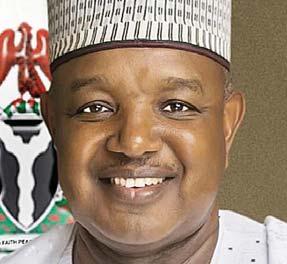
formulated visions of the last 40 years. Lacking was the commitment of those in power to make the dreams a reality. It is a conceptual error to imagine that planning could be discounted in modern economic management.
To be sure, capitalist economies are also planned to varying degrees and in different forms. So, the ideological prejudice against planning, as an essential element of policy, is grossly misplaced. This is more so for an economy that is yearning for development. Fiscal and monetary policies have planning components. These policies often go awry when the planning element is ignored. And that could be a recipe for a crisis.
Economic planning is squarely the job of government. It’s therefore methodologically wrong-headed to place economic planning in the hands of businessmen. Businessmen are competent in corporate planning for profit. That is a different task from that of a government elected to plan the economy for the welfare of the people. The objectives are different. A policy that could serve the public purpose of enhancing people’s welfare may not be profitable in the eyes of a businessman.
This policy tragedy is one of the most poignant consequences of the curious abandonment of planning as an instrument of socioeconomic policy. As a result, random execution of projects (or what a former governor once aptly described as ‘governance by projects’) became a substitute for rational planning for development.
However, a welcome departure from the neglect of planning may be on the horizon. The other day the minister of budget and economic planning, Senator Abubakar Atiku Bagudu, was in the economic team that appeared before the senate to explain the administration’s policies. Significantly, Bagudu prefaced his brilliant presentation with a reference to Chapter II of the 1999 Constitution. He quoted Section 16 (2a): “…The State shall direct its policy towards ensuring .. the promotion of a planned and balanced economic development”
That is the path to development.
One of the public servants who was involved in drawing up past development plans was Allison Ayida. He was Head of Service and Secretary to the Federal Government.
Bagudu and his colleagues in the economic management team may find some nuggets in Ayida’s views on economic planning. For instance, Ayida wrote: “In national economic planning, there can be no substitute for inadequate political leadership. Administrative leadership, however competent, cannot rise above the quality of political leadership.” In fact, Ayida’s perspectives on planning are distilled in a book entitled “Allison Akene Ayida: Nigeria’s Quintessential Public Servant.” The book is edited by Professors Femi Kayode and Dafe Otobo. The 10 principles of planning which Ayida professed are “the collective will of the people to plan and coordinate their resources; competent technical planning apparatus; collation and systematic analysis of statistical data on the economy; effective system of budgetary controls and sanctions that would not only relate expenditure to available resources, but also keep within plan allocations, targets and priorities and effective machinery for rational allocation of foreign exchange resources.” Other principles are “the management and coordination of external aid to reflect development priorities; tailoring research to meet planning requirements; continuous application by adaptation, transplantation or innovation of modern science and technology to economic development; provision of adequate manpower budgeting and continuous training of planners and accessibility to political power.” It's time Nigeria revived the governance culture of planning for development.
As Nigeria commemorates a quarter-century of unbroken democracy, it is essential to reflect on our journey and consider the path ahead. This milestone is particularly significant in the context of the military takeovers in Sudan, Gabon, Niger, Mali, Burkina Faso, and Guinea, highlighting Nigeria's resilience and commitment to its democratic principles. The stability of our democracy, despite a history of military coups, stand as a testament to our collective dedication to democratic governance.
In contrast to the absence of social media 25 years ago, today's digital landscape significantly influences democracy. Platforms like Twitter/X, Facebook, Instagram, and TikTok have revolutionized how information is disseminated, enabling real-time communication between the government and the populace. This transformation has made governance more transparent and accountable, as citizens now have a platform to voice their concerns and hold leaders accountable. The #EndSARS movement is a prime example of how social media can galvanize youth and push for political change. The recent debates on the need to ban social media in Nigeria demonstrates the widened generational gap that exists in terms of the perception of the pros and cons of using social media in a stable democratic society.
The increased participation of youth in government at the local and federal level is also a testament to the democratic growth in Nigeria, a development that is still some-what unwelcomed by the older political class. Young people are no longer passive observers but active participants in the political process as voter participation and social movements are actively promoted and advocated for online. This shift is crucial for the future of our democracy, as it ensures that the
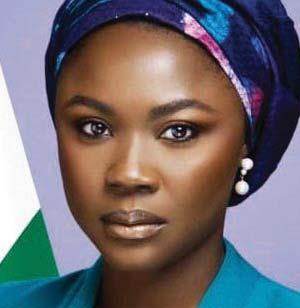 BY AISHA SHUAIBU Minister of Youth and Sports Development,
BY AISHA SHUAIBU Minister of Youth and Sports Development,
voices of the younger generation are heard and considered in policymaking. The "Not Too Young to Run" bill, led by the Youth Initiative for Advocacy, Growth and Advancement (YIAGA) and passed in 2018, is a significant milestone that lowered the age limit for running for elective positions, thus encouraging leadership from younger and sharper, more capable, innovative minds.
The quality of life of citizens is often a more critical measure of a country's success than the mere form of government. In a 2023 Al Jazeera article on democracy in Africa, President Paul Kagame was said to have gained the support of 95.05% of Rwandan voters in his first presidential election in 2003. Despite criticisms of authoritarianism, the quality of life of Rwandans, under Kagame’s leadership has improved significantly as the country has been described as “Africa’s success story”. With an increased life expectancy of its citizens, the Rwandan economy has also prioritised the development of its tourism sector, which makes up 11% of the country’s GDP. This raises important questions about the trade-offs between democratic freedoms and developmental outcomes.
In countries such as Togo, Cote d’Ivoire and Guinea, governments have manipulated their constitutions to extend the tenures of their presidents, which many have criticized as a “constitutional coup” which undermines the principles of democracy. This demonstrates that ‘democratic rule’ does not always constitute ‘good governance’. Similarly, other West African countries, despite being democracies, struggle with issues like poverty, corruption, and inadequate public services. This disparity underscores the need for a government that prioritizes the well-being of its citizens over the ‘appearance’
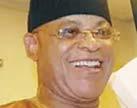
EDDIE IROH, OON A multi-media professional and award-winning novelist, Dr Iroh
It was not long after the return to ‘civilian’ democracy in 1999 that wags went to work. They named the new rule ‘DEMONCRAZY’. Another group of wags termed it "DEMALLCRAZY’. That of course had nothing to do with the fact that the President in the new dispensation was a retired five-star Army General. In any case, that was something the politicians judged to be a good bridge between the military on one hand and the civilian politicians and the populace on the other.
However, 25 years after the military relinquished power, democracy has been on a very rocky and dangerous path. Fortunately, the recklessness of the political class has not led to yearnings for return to military rule even though there are some who might prefer the devil they know in military fatigues to the one who hides his carnivorous claws behind a civilian robe. Meanwhile, the problem with Nigerian Democracy can easily be traced back to its foundation--the Constitution. This is a document skewered to benefit some and displease the others. In a country with 250 ‘tribes and tongues’, the Constitutions lamely agreed on the recognition of the Federal Character of the country and the establishment of Federal Character Commission which is for all intents and purposes a toothless bulldog.
The drafters of the constitution appeared to have focused attention on the presidency and thus gave it more power than is appropriate in a true federation. The most attractive of these is presiding over the money collected by the national oil corporation from crude oil sales of which Nigeria is the eighth largest producer in the world. The principle of derivation, which would mean that a state controls what is produced from their backyard with them paying an agreed amount to the centre is not the case thus negating one of core principles of true federalism. Thereby within the federal system exists financial arrangement which has made the quest for the presidency a quinquennially do-or-die affair.
Only once in the 25-year history of the current dispensation has the losing candidate, who was the incumbent president, vowed that he would not go to court because his continuing in office was not worth the death of a single Nigerian! He gracefully bowed out and urged his supporters to keep the peace. Thus, the president-elect who had vowed on behalf of monkeys
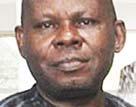
Nothing underscored the stark reality that hunger stalks the land than a valedictory session for Mrs. Zainab Ahmed, the last Minister of Finance under former President Muhammadu Buhari, barely a year ago. Venue was the Congress Hall of the highbrow Transcorp Hotel, Abuja where the high and mighty converged to bid her farewell after about five years overseeing the nation’s treasury. I watched with utter disbelief the scramble for food at an occasion that had in attendance such an assemblage of otherwise more privileged people. As of the time this happened, food inflation was 24.68 per cent. Fast forward to 2024 when macroeconomic indices, following the reform policies of the current administration, have taken a precipitous slide to the south, further eroding the standard of living of most Nigerians. Food inflation is currently at 40.53 per cent. And what has made the crisis scary is that Nigerians cannot improvise with cheaper alternatives. There is no "poor man's food" anymore. Garri which once occupied that derogatory status has walked its way to the elite club, rubbing shoulders with food classes that were considered the preserve of the rich and middle class. How did we get here?
The food crisis currently ravaging the land is clearly not the making of the Tinubu administration, although some of its policies exacerbated the situation. The seeming intractable security problem, lack of visionary leadership, misplaced priorities, corruption and laissez-faire approach to governance, among others, combined to make Nigeria one of the top
BY EDDIE IROH, OONTime was when Nigeria's supreme court boasted of men of character like Justice Adetokunbo Ademola and Justice Anthony Aniagolu who placed the law above thing else. Alas that era is gone. The wags now regard the judiciary as ‘JUDISHARING’ where the cases are decided before they reach the Bench! No judgement by the judiciary has gone against the Executive, or ‘EXECUTHIEF’, as the wags would name it.
and gorillas would rise in their thousands to fight for him was left carrying the empty can.
That was the only time in 25 years the presidential election was not decided by the courts that have also become part of the problem. Time was when Nigeria's supreme court boasted of men of character like Justice Adetokunbo Ademola and Justice Anthony Aniagolu who placed the law above thing else. Alas that era is gone. The wags now regard the judiciary as ‘JUDISHARING’ where the cases are decided before they reach the Bench! No judgement by the judiciary has gone against the Executive, or ‘EXECUTHIEF’, as the wags would name it.
But I explain this with what foreign observer felt about African political rulership in general. He said: "African governments has fallen into the hand of elite politicians who have succeeded the colonial masters and pretty much sucks the life out of the wealth of the countries and about 70 to 80 percent of these lie in banks in the capitals of Western countries."
In the Legislative arm they did not escape from the tongue lashing of the wags who nicknamed them the ‘LEGISLATHIEVES’. And the Senate President Godswill Akpabio was caught red handed announcing to the whole house on the eve of departure for their Christmas break that the Clerk of the National Assembly has put some ‘little amount’ in their bank accounts to enable them a full enjoyment in the festive season. On his desk as he was speaking were microphones of several radio and television services carrying his announcement to millions of hapless Nigerians who were wondering where the Naira would be found for their next cup of garri!
This brings to my mind a Second Republic cartoon by Owolabi, aka Owoblow. He drew a man who had stepped out of a Lagos bank carrying a sack of money. He was suddenly confronted by an armed robber. The armed thug pointed his gun at the head of the man with the sack of money and snarled "Give me that money or I’ll blow your brains out"! The man with the money looked at the gun and looked at his sack of money and said to the armed man "Listen you can live in this country without brains but not without money. So, if you want to shoot, shoot!"
So, as the inimitable Chief Zebrudaya Okoroigwe Nwogbo of ‘The New Masquerade’ would say, ‘Take your choose’!

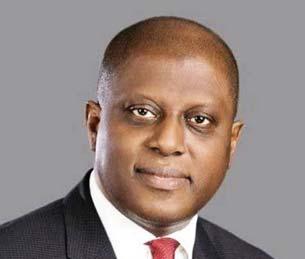
countries with the highest number of hungry citizens.
A nation that has the full potential to be a net exporter of food now harbours millions of hungry and angry citizens who can barely afford a square meal a day. And many of those who can afford to feed are least bothered by the nutritional quality of what they consume.
Nigeria's hunger situation worsened in 2023, dropping six places in the Global Hunger Index to 109th out of 125 countries, compared to 103rd in 2022. The UN Food and Agriculture Organisation (FAO) has projected that 26.5 million Nigerians are at the risk of hunger in 2024. Also, according to the recent report by the World Food Programme (WFP), the number of food insecure people in Nigeria was the second highest globally, with 24.8 million inhabitants facing hunger at crisis or worse levels.
Before the present administration came on board, President of the African Development Bank (AfDB), Dr. Akinwumi Adesina had raised the alarm, urging Nigeria to expedite action to avert food crisis in the country. He was exasperated that the country was yet to sign and utilise a $244 million fund for emergency food production approved by the Pan-African bank since July 2022. The fund was part of $1.5 billion African Emergency Food Production Facility launched by the bank to support 20 million farmers to access climate-resilient agricultural technologies and produce 38 million metric tons of food valued at $12 billion, in a bid to help prevent a food crisis arising from the Russian war in Ukraine.
Yet, such an incentive that needed urgent action by purpose-driven leadership was not swiftly grabbed. Now, the food crisis is upon us. How do we come out of it?
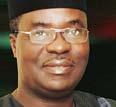
Fellow of the Nigeria Leadership Initiative (NLI) and a member of the Aspen Global Leadership
There is something ironic, almost out of place, about the idea and the practice of democracy in Africa. After nearly seven decades of trying, it is difficult to identify a single nation on the continent that could be considered a successful model. Elections after elections, African nations have ended up with a considerably declining quality of political leaders who exhibit a criminal poverty of vision and an unusual appetite for destruction. This combination of systemic incongruence and visionless leaders has kept the continent in a prolonged state of political and economic paralysis and its people wondering if democracy is an elaborate system of elite deception.
What passes for democracy in Africa is a mere agglomeration of ruinous political parties, sham elections, weak and corrupt institutions, unaccountable and non-responsive governments, presided over by incompetent and unconscionable individuals. It is only in Africa that holding elections becomes a national emergency, requiring the mobilization of the national army and the temporary cessation of the normal rhythm of life. In much of Africa, elections have become a meaningless ritual, a veritable threat to law and order, often culminating in tragic loss of lives, and the very antithesis of the true will of the people. In the rare cases where elections reflect the will of the people, the beneficiaries have been known to suddenly morph into little beasts and monsters, turn against the people and brazenly commence the plot to stay in power beyond their constitutional limit.
In Nigeria, as in much of Africa, the average citizen relates to democracy only as something that is remote and external, which state institutions and politicians manufacture and hand down to citizens. Like most Africans, the average Nigerian does not see himself as part of the democratic process or as an important actor with rights and obligations, mainly because he does not relate to the idea of a system that does not deliver on his basic needs and general well-being, a system that manages to create higher rates of poverty, inequality, prebendalism as well as a tiny class of super citizens in the midst of progressively falling standards of living. Many would argue these are aberrations and not part of the essential nature of democracy in Africa but such argument would be academic in the face of the realities that manifest in the daily lives of ordinary citizens.
To be sure, Nigeria’s democracy has, over the last 25 years, been hijacked by imposters who promote personal and private interests at the expense of the nation’s viability and its future. These imposters consist of a coterie of party officials, senior public office holders at various levels as well as private and highly placed traditional friends of power who are obsessed with and locked in a ceaseless competition for influence and wealth accumulation. Those keenly observing this phenomenon will recognize it as approximating the classical Hobbesian State of Nature of war of all against all in which life itself becomes “solitary, poor, nasty, brutish and short” and in which the dramatis parsonae are at once in competition against each other on the one hand and, on the other, united against the legitimate interests of ordinary citizens.
Let us look at some numbers. In 1999 the budget for Nigeria’s general elections was N1.5 billion but by 2023 the overall budget had ballooned to a whopping N355 billion, which the nation is still paying for, one year after the elections. Relying on data and estimates obtained from various sources, the direct cost of general, local council and off-season elections to the central and sub-national governments, political parties and candidates in Nigeria from 1999 and 2023 may well have been in the region of N8 trillion. This does not factor in the indirect costs of virtual cessation of economic activities, thinning out of foreign direct investment, capital flight, pressure on foreign exchange occasioned by the massive acquisition of dollars by politicians during elections, etc. One informed estimate put forward by the respected economist, Mr. Bismarck Rewane of Financial Derivatives Company Ltd, put the direct and indirect costs of the 2023 general elections alone at N6 trillion.
The picture worsens when it comes to the more straightforward issue of cost of governance. Nearly everyone agrees, supported by credible data, that Nigeria’s democracy is the most expensive in the world, not just in terms of the size, function and questionable relevance of its sprawling institutions but also in terms of the quality of service delivery and the massive corruption involved in maintaining those institutions. All that is necessary to substantiate this assertion is to undertake an analysis of the budgets of the three tiers of government, on both the capital and recurrent sides. Given the constraints of space, it suffices to say, on average, 70% of all public expenditure in Nigeria
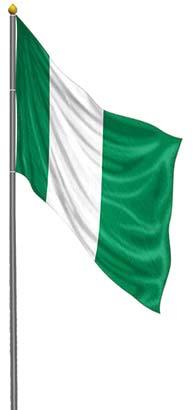
in the last 25 years had been earmarked to fund the cost of governance. For context, the National Assembly alone costs the nation a whopping N3.132 trillion to maintain in the last 25 years, at the average cost of nearly N4 billion for every one of the 816 bills it passed into law over the same period. Why are these numbers important? The numbers illustrate the uneven cost and benefit of democratic governance in a country with roughly ten million out of school children, 33 % unemployment and average poverty rate of 70% over the last 25 years. To make matters worse, almost all the indices of human development with which the well-being of nations are measured are not showing up for a large majority of Nigerians. A significant number of citizens are living in fear due to spiraling violence and widespread insecurity, with 30 out of the 36 States of the Federation and FCT under one form of internal security operation or another, for as long as we can remember. High cost of living and devaluation of the local currency have continued to pauperize all categories of Nigerians, including the wealthy. The ever-shrinking rank of the nation’s middle class, in particular, never had it so bad.
In place of democracy, Nigeria is operating a revolving door patronage system where politicians, once in power, coalesce and perpetuate themselves and their interests either directly or through cronies. A system which has become hostage to personal and private interests is broken and cannot deliver good governance. The revolving door patronage system which Nigeria’s democracy has become has its roots in Nigeria’s (large and small) political parties. Party officials, public office holders and their private sector proxies have formed an unholy but undeclared alliance to hold Nigeria hostage. For Nigeria to begin to move in the right direction, the grip of these groups and the patronage system they have enthroned must be dismantled. Keeping it in place is not an option because that would mean keeping Nigeria running in a viscous cycle.
The current wielders of the levers of power and influence, at various levels, have a choice to make before they run out of options. They have the rare, unique and historic opportunity to push the reset button and roll back the massive resentment that is building up the among citizens by embarking on a sincere, deliberate and transparent effort at course correction.
One of the ways to dismantle the patronage system is for citizens to organize popular resistance. Unfortunately, the history of most popular uprisings is unpleasant and unenviable. Uprisings tend to be chaotic and they come at enormous cost to life, property and public order. Often, they get hijacked by smart but equally vicious and power-grabbing politicians. Another is to allow the system to correct itself through trial and error until it evolves into the ideal model. However, evolutionary change is too slow, too uncertain and, often, takes a turn in the wrong direction. If the last seven decades have taught us any lesson, it is that democracy lacks the internal mechanism for self-correction, which is probably the reason it is often punctuated by military intervention.
The more realistic and least disruptive path to salvaging Nigeria’s democracy is through organized middle-class intervention. A new crop of conscientious middle-class citizens, driven only by values, enlightened self-interest and patriotism, who do not depend on politics and public office for their sustenance must begin to actively participate in partisan politics in an organized manner. This new crop of organized citizens must set as one of its cardinal objectives, the dismantling of the grip of party officials, political office holders, godfathers and private proxies on Nigerian politics.
Members of this group must seek the leadership of political parties and use the parties as platforms for the recruitment of credible leaders. They must also use their professional and organizational skills to institutionalize the parties and take them away from godfathers. They must contest elections to capture power at both national and sub-national levels, in the executive branch and in the legislature. Finally, this group must address the issue of the lucrative nature and the attractiveness of political office. It is the main reason elections in Nigeria have assumed the character of the Hobbesian State of Nature alluded to earlier in which politicians are so desperate to occupy positions of power by whatever means necessary.
In the meantime, the current wielders of the levers of power and influence, at various levels, have a choice to make before they run out of options. They have the rare, unique and historic opportunity to push the reset button and roll back the massive resentment that is building up the among citizens by embarking on a sincere, deliberate and transparent effort at course correction. Nigeria could be standing on the edge of a dangerous cliff at the moment and it is in the enlightened self-interest of those who have the means to pull it back to do so… Conference
of democratic values.
Past African leaders have often emphasised the essence of good governance through profound statements. Nelson Mandela once said, "Education is the most powerful weapon which you can use to change the world." This quote resonates with Nigeria's youth, who recognize that quality education is vital for personal and national development. Similarly, Kwame Nkrumah's assertion that "the independence of Ghana is meaningless unless it is linked with the total liberation of Africa", highlights the interconnectedness of African nations in their democratic pursuits. Nigeria's commitment to democracy is further demonstrated by its coupe-free status in recent years, despite a tumultuous history and the recent return of authoritarianism across the Sahelian belt. This stability can be attributed to the strengthening of democratic institutions like the Independent National Electoral Commission (INEC), the judicial system, and the legislature. These bodies must maintain their
independence to ensure free and fair elections, uphold the rule of law, and provide checks and balances on the Executive.
Tackling corruption remains paramount as it has remained the root cause of many issues weakening our democracy. Transparency International's Corruption Perceptions Index consistently ranks Nigeria low, indicating the need for robust anti-corruption measures. Efforts to combat corruption must be comprehensive, involving not just punitive actions but also preventive measures such as public education and institutional reforms.
Several other steps are necessary in tackling our existing issues. First, continuing to support and strengthen the democratic institutions insulating them from political interference to function effectively. Second, expanding civic education to empower citizens in understanding the constitution, their rights and responsibilities. Lastly, leveraging technology and innovation to enhance transparency and accountability in governance to build public trust. Platforms
for e-governance should be developed, promoted and maintained to ensure that government actions are visible and open to scrutiny. Addressing socio-economic inequalities will place us on the road to greater inclusion. Policies that promote equitable access to education, healthcare, and socio-economic opportunities can bridge the gap between the different segments of our society. As Mandela emphasized, "Overcoming poverty is not a gesture of charity. It is an act of justice." 25 years of democracy should be recognised and celebrated as a significant achievement, especially in a region where democratic backsliding is becoming more common. By embracing the power of social media, fostering youth participation, ensuring the independence of democratic institutions, and tackling corruption, Nigeria can strengthen its foundations. As we look to the future, let us commit to building a democracy that prioritizes the quality of life of its citizens and remains resilient in the face of challenges.
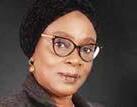
AISHA HASSAN BABA, OON A lawyer of over four decades, Ms. Aisha Hassan Baba, OON, has served in very senior and sensitive positions in both federal and state public service, notably as Deputy Director Public Prosecution, Director, Legal Services under the Federal Ministry of Justice, Federal Ministry of Education, Federal Ministry of Industry, Trade & Investment, Chief Executive Officer (CEO) of the Federal Legal Aid Council (now Commission), Executive Secretary, Nigerian Investment Promotion Commission (NIPC), and as the Attorney General and Commissioner for Justice, Anambra State.
An old Latin legal term for suicide “Felo de se” (Felon on himself) paints a grim picture of eternal condemnation! Attitudes to suicide and suicidal behaviors have changed over time and at different times, in different places. In Nigeria, the Suicide Research and Prevention Initiative (SURPIN) which partners with the Association of Psychiatrists in Nigeria (APN), has found that about one-fifth of suicide cases seen at its affiliate institution are those aged 13-19 years of age and that the majority of the callers were aged 20-39 years, and 63.5% of them were having thoughts of suicide at the time of calling. 28.2% were students.
These are grim statistics highlighting the crisis point we have reached in Nigeria. As we commemorate 25 years of uninterrupted civilian governance, and for the purpose of my thoughts on the subject at hand, I will focus on our nation’s social development as it pertains to the promotion of social health in Nigeria. This social challenge is, in recent years, being stimulated by global and national concerns on the burden of mental health and mental illness on the society.
I am a strong proponent that the role of democracy is a foundational determinant of social health and on mental health in particular. Democracy should give every citizen of Nigeria the feelings of social inclusion and support. The repeal of the Lunacy Act 1958 is a starting point. Its provisions did not promote the mental health of Nigerians. The National Mental Health Act 2021 now places human rights protections on the front burner for those suffering from mental health conditions.
The National Suicide Prevention Strategic Framework 2023-2030 and the National Mental Health Policy 2023 provide roadmap for reducing the prevalence of suicide in Nigeria. The new law and policies shine the spotlight on access to mental health care and the rights of people living with mental illness… However, these lofty objectives cannot be attained so long as attempted suicide remains entrenched as a criminal offence in our statute books and resides within the provisions of section 327 of the Criminal code and section 231 of the Penal code. In this regard It is my fervent hope that within the parameter of the declared commitment of the Attorney General of the Federation last April in his support for the implementation of the FMOH laws and policies, there will be a corresponding commitment towards the decriminalization of attempted suicide in Nigeria to achieve the objectives of the Mental Health Act and its policies.
In March 2024, I was invited by Professor Taiwo Lateef Sheik, professor of Psychiatrist/Psychopharmacology, Ahmadu Bello University, to join the
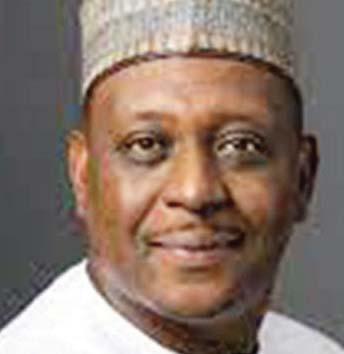
“Suicide prevention advocacy working group” platform as an advocate for suicide prevention in Nigeria along with 84 members selected from across different professional disciplines and social hierarchy across the country and the diaspora. In his welcoming statement, Professor Sheik stated: “The purpose of the advocacy platform is to deepen awareness about the scourge of suicide in our society, bring to the fore the futility of making suicide attempt a crime towards addressing the “ suicide crisis” ( especially among the youth) and pursue the decriminalization of attempted suicide in Nigeria” The group experience is reminiscent of my access to justice days as the Director General of the Legal Aid Council of Nigeria.
Nigeria is at a legislative reform crossroad where significant debate and advocacy, nationally and globally is championing the notion that criminalization of attempted suicide is retrogressive, calling for change in attitude that is no longer regarded as being relevant or is at odds with evidence-based prognosis that mental health assessment and support and not legal deterrent is needed.
Up until 60 years ago suicide was a crime in England and Wales and people were persecuted and prosecuted for attempted suicide. Now it would be unthinkable to punish someone for attempting suicide because in 1961, the Suicide Act of the UK parliament decriminalized the act of attempted suicide. What an irony of history! The Lunacy Act of 1958 (as amended by the National Mental Health Act 2021 was the first mental health legislation in Nigeria) was a sad legacy of British colonial administration that foisted criminalization of attempted suicide in Nigeria. Nigeria is at a legislative reform crossroad where significant debate and advocacy, nationally and globally is championing the notion that criminalization of attempted suicide is retrogressive, calling for change in attitude that is no longer regarded as being relevant or is at odds with evidence-based prognosis that mental health assessment and support and not legal deterrent is needed.
In my long sojourn as a government legal practitioner in both state and federal ministries of justice, I do recognize the difficulties government faced and still faces in matters of law reform and repeal in criminal cases, the reform of which is predicated on moral or religious validation. The law is the law if it satisfies the formal requirement of validity though repugnant to the evidence- based assertions of those that advocate for change. Happily, the above personal observation is not in tandem with the current global and national advocacy ambassadors strategies that reflects and emphasizes that the true intentions of the clarion call to decriminalize the offence of attempted suicide, stem from the premise and recognition of the need of government to transfer responsibility for the control of a deviant behavior, from the criminal justice jurisdiction to a medical jurisdiction in the interest of establishing a more effective remedial intervention, prevention and support. In this regard, the engagement, and views of members of our national and state Assemblies, their collective stance on the decriminalization of attempted suicide must be elicited within their legislative competences as set out in the 1999 Constitution (as amended). Their views are evidently mute!!
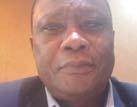
The critical milestone that has been reached during these 25 years of civil rule is that Nigeria, a major producer of crude oil from which it derives a large chunk of its revenue, has yielded to international pressure to stop the use of its crude oil for economic development, as an initiative designed to lower the earth’s temperature as agreed at the Paris climate change conference. The Paris Agreement, in seeking to strengthen the global response to climate change, reinforced the goal of limiting global temperature increase to well below 2 degrees Celsius, while pursuing efforts to limit the increase to 1.5 degrees Celsius.
Thus, the federal government is vigorously pursuing its plan to transition from the use of fossil fuels to cleaner fuels, intensifying the use of gas as its transition fuel.
Nigeria’s Energy Transition Plan (ETP) was produced in 2021 with the federal government committing to net-zero emission of carbon by 2060.
The energy transition plan could reduce Nigeria’s greenhouse gas emissions by up to 45% by 2030 and up to 90% by 2050, according to the federal government. President Bola Tinubu recently pledged to wean Nigeria from overdependence on petrol and diesel to utilise the more efficient natural gas resources. The president, who commissioned the expansion of the Ashtavinayak Hydrocarbon Limited (AHL) Gas Processing Plant in Kwale, Delta State, the Assa North-Ohaji (ANOH) Gas Processing Plant in Ohaji-Egbema and the 23.3km ANOH to Obiafu-Obrikom-Oben (OB3) Custody Transfer Metering Station Gas Pipeline Projects, said the projects were good for Nigeria’s transition to cleaner and more efficient fuels. He also directed government agencies to buy vehicles powered by Compressed Natural Gas (CNG).
Regardless, environmentalists are gravely concerned that the federal government has neglected other more pressing issues of the environment that directly put the lives of Nigerians at risk. They are worried about these disturbing issues that were carried over from the military era, which the democratic leaders ought to attend to promptly but which, regrettably, they
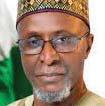
have neglected. It is a broad spectrum that includes dumping of electronic waste all over the country, soot/ash generated by illegal refining of crude oil or incomplete burning of organic matter, burning of seized crude by government officials and uncapping of crude oil well-heads by thieves, with its attendant pollution of freshwater mangroves and rivers in the Niger Delta, as well as coastal erosion in the South-west and the Niger Delta, unchecked gully erosion in the South-east, obliteration of villages and towns in the North by the ever-moving desert sand dunes, among others, are still not addressed effectively.
There is also no active plan to mitigate imminent flooding across the nation. People are only told to seek high ground or are lodged in refugee camps when they are caught in the cross-current, as the only adaptation plan, because politicians like to be seen as doing something for the people. Agencies of the government that should provide early warning to the people are poorly funded and cannot install early warning systems or visit communities to educate people on how to avoid impending flooding.
There is also no active plan to mitigate imminent flooding across the nation. People are only told to seek high ground or are lodged in refugee camps when they are caught in the cross-current, as the only adaptation plan, because politicians like to be seen as doing something for the people.
A report by the United Nations Collaborative Programme on Reducing Emissions from Deforestation and Forest Degradation in Developing Countries (UN-REDD+), said Nigeria is rapidly losing its forest cover. This prompted the revered conservationist, Izoma Phillip Asiodu to call on the federal government, recently, to keep a promise it made in the 1980s to return Nigeria “to a situation where 25% of our area is covered by forests.” Izoma Asiodu CFR, who is the President Board of Trustees of the Nigerian Conservation Foundation (NCF), noted that Nigeria’s forest cover “Was 35% plus, at Independence. It is 3% now. Forests have been destroyed and there’s a world campaign, because until we get back to that recommendation of 25% of forest cover, the environment is in danger. Let us not be part of those who destroy the environment.”
Regardless of these woes, Nigeria has come a long way since the advent of democratic rule in 1999. Meanwhile, environmental issues in Nigeria first
Continued on page 51

ANGELA GBEMISOLA ATTAH An economist and strategy consultant with over two decades of practice, Attah is CEO of the Sandust Tincan Water Project, a pivotal public-private partnership aimed at overhauling the water treatment infrastructure at the Lagos ports. She is also chairman of the boards of Simplified Credit Ltd and Royal Family Academy and a Partner at AGPartnerships where she drives strategic growth and innovation.
Nigeria, a land of striking contrasts, where nature’s gifts intertwine with a vibrant cultural tapestry. From your Wikki warm springs to the breathtaking majestic Obudu Mountain Resort, from the ancient caves of Idanre Hill to the cozy interconnected chambers of the Ogbunike caves, this nation’s beauty knows no bounds. Home to over 200 million people, stretching from the Gulf of Guinea to the arid Sahel. With more than 500 different languages spoken and a shared rich cultural heritage.
Nigeria, of all the beauty and splendor that you exude, when I say I am yours, people cringe. When I declare, “I am Nigerian,” misconceptions abound. I grapple with stereotypes - seen as late, loud, aggressive, subpar, an illegal migrant, a fraudster, poor, uneducated and I appear to practice loud empty religion, which bears no fruit. But beneath these superficial labels lies a resilient spirit, a legacy of acclaimed authors, Nobel laureates, Afrobeat stars, sports protégés, leading specialists, hardworking, diligent, intelligent, and dedicated economic contributors. How did our identity become so tarnished? What can we do to recast the narrative?
The African proverb “it takes a village to raise a child” underscores the collective responsibility and communal care necessary for proper upbringing. Within this proverbial “village,” which includes family, neighbors, and friends, everyone plays a role in shaping children’s behaviors, attitudes, and choices. Shared values bind the community together, fostering a sense of mutual responsibility. At the heart of this model lies the assumption that everyone genuinely cares about the child’s well-being and is aligned on what is right, acceptable, and decent. It also presupposes a shared understanding of what is wrong. Elders, as custodians of wisdom, deserve respect. The youth are encouraged to greet them, absorb their insight, and learn from their experiences. However, our streets today reveal a stark contrast. Instances of fraud, glorification of indecency and the pursuit of ill-gotten wealth are rife. It seems our values, history, self-worth, and national pride have not transcended generations. The village that once raised children now finds itself fragmented. However, it is imperative that the village reunites to ensure that moral standards are realigned and maintained. What is inherently wrong remains so; thus, we must collectively advocate for truth, fairness, integrity, decency, accountability, diligence, respect, and adherence to the law. Our foremost priority should be the preservation and promotion of these values. Let us reclaim our role as a village that nurtures resilient, compassionate, and morally grounded children.
What more led to the erosion of values? Perhaps it’s the false narrative that foreign ideals are superior. Or maybe it’s our failure to document and share our own history. As examples, what do we know about the Great Wall of Benin, a monumental feat of engineering, which is recorded as the second-largest man-made structure by length and was built between 800AD and 1460AD in what is now Edo State? Or what is recorded and taught of the superiority of the indigenous technology of production within the leather industry in Kano in the 19th century and its significance to trans-Saharan trade? To preserve our values, we must learn about our history, tell our unique stories, sing our soulful songs, and embrace our exceptional heritage.
Our heritage will thrive when we support local initiatives, celebrate our achievements, and patronize homegrown products. It expands when we develop a taste for locally produced items and actively promote local manufacturing, no matter what their scale is. Producing, wearing, and promoting traditional textiles like adire and aso-oke, exploring our native landscapes and investing in the preservation of local historical sites are additional ways of fortifying
BY ANGELA GBEMISOLA ATTAH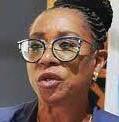
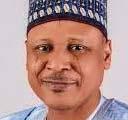
our cultural identity. For instance, Kenya’s growth is significantly attributed to its domestic coffee and tea industries, and the populace’s recognition and patronage of these homegrown commodities. Let us adopt a culture of “Buy Local.”
During my childhood, linguistic diversity was a given; my friends and I effortlessly switched between languages. I spoke Yoruba – my mother tongue, Hausa – the language of my birthplace and first nanny, and English – the language of my education. I even dabbled in a few other languages, acquiring a functional grasp. My father, too, is multilingual: he speaks Hausa – the language of his birthplace, Yoruba – his mother tongue, Igbo – the language of the Owerri neighbors with whom he grew up, English – the language of his education and French. However, times have changed.
Today, my children primarily speak English, and our common excuse is that their father and I do not share the same language. Yet, when I reflect on my own childhood, I realize that children from mixed backgrounds had the privilege of speaking even more languages. Speaking various languages improves cross-cultural understanding, broadens our perspectives, and increases our adaptability. It is through indigenous languages that we transmit cultural values and fully exercise our rights and human dignity. Therefore, teaching our children local languages is not just about linguistic proficiency but also about restoring the dignity and the integrity of our heritage.
In our interconnected world, where globalization blurs borders, distinct patterns of our local cultures remain pivotal. These unique strands not only shape our perceptions but also impact on our shared future. Considering our present circumstances, prioritizing national re-orientation becomes imperative, and it must extend across the entire nation. We cannot rely solely on institutions like the National Orientation Agency, which has made limited progress in reshaping our mindset. Instead, we must take ownership of our identity. Loving ourselves and embracing with pride, our heritage are essential steps. The biblical injunction to “love your neighbor as yourself” presupposes selflove as a foundation. Our perceptions of fellow citizens need improvement. Rather than favoring foreigners, we must extend the hand of opportunity to our brethren.
While Nigeria, like any other nation, has its share of unscrupulous individuals, we must not allow them to define our collective identity. After all, which country is completely free from imperfections?
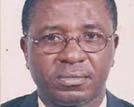
As a collective, we should uphold excellence as our benchmark, seizing opportunities when they arise and giving our best effort. The seeds of reorientation are sown at home, nurtured by the conversations we engage in, the standards we esteem, the rules we set, and the examples we provide for our young ones. Our places of worship, too, play a vital role. Let us preach holiness, purity, kindness, gentleness, and love, rather than fixating on material wealth and personal breakthroughs. In our schools, values should prevail over pressure. We must stand firm against unruly behavior and undue influence, whether from students or parents. And finally, the Government must provide an enabling, secure, and safe environment for local industries to grow. It must promote and patronize indigenous products with the “Buy Local” mantra. Together, through deliberate re-orientation, we can reclaim our national values and forge a brighter future.
While Nigeria, like any other nation, has its share of unscrupulous individuals, we must not allow them to define our collective identity. After all, which country is completely free from imperfections? Our narrative should not be confined to our challenges but should highlight our strengths, creativity, and potential. By focusing on virtues, we can reshape perceptions both within and outside our borders. The journey toward positive change may be steep, but it is a path we can tread together. Let our actions, innovations, and shared commitment to excellence positively recast the global narrative of Nigerians.
It is sad that Nigerian democracy has been churning out undisciplined rabble and entrusting them with the sacred duty of governing the affairs of their fellow men and women. Whether we admit it or not, Kakistocracy (government by the least suitable or incompetent citizens) has triumphed in the land. This tragedy cannot lead to human flourishing. Until we reinvent Nigerian democracy or refashion it to suit our peculiar circumstances, we are simply wasting our time by creating opportunities for those who would steal political power and wreak havoc on the country.
If Nigerian democracy must yield the so-called democratic dividend, then it must have a national character that establishes the parameters and moral high ground on which it should operate to promote the well-being of the people. Devoid of character, politics and political activities in Nigeria, in the words of Frederic Bastiat, the French political economist and philosopher, are legalized plunder. In all democracies, especially in presidential democracies, sovereignty resides with the people. At periodic elections and through other intervening periods, the people determine who should govern them and how they should be governed. Unfortunately, in Nigerian democracy, the reverse is the case: the
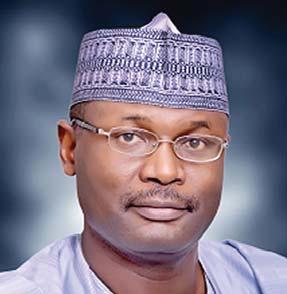
people are at the receiving end, and mostly unfit leaders determine how they should be governed. Worse still, the people's votes do not always count at periodic elections.
Democracy rests on many assumptions. One of those assumptions is that men have enough wisdom and virtue to pursue the promotion of the welfare of the people. However, viewed against the backdrop of history, men often lack the necessary wisdom and virtue to achieve this goal. Democracy is challenged from within by sheer ignorance and the pursuit of personal interests at the expense of the common good and welfare of the people.
Plato, in particular, was hostile to democracy because he feared that such powers and institutions would be imperiled under the watch of men with unruly passions and appetites. In his often-cited classic work, ‘Democracy in America’, French political scientist, historian, and diplomat. Alexis de Tocqueville writes that democracy bereft of equality of conditions is bound to gravitate towards despotism. To these thinkers, democracy is not synonymous with instant political and economic prosperity. That democracy liberates all men assumes that there are political leaders with high moral principles ready to navigate

MONDAY PHILIP EKPE Currently an adjunct lecturer at the University of Abuja, Ekpe was at various times editorial page editor, features editor and general editor at THISDAY. A brilliant writer with special interest in human stories, Ekpe obtained his first degree in English and Literature from the University of Benin and a master's in Communication and Language Arts from the University of Ibadan where he completed his Ph. D in 2015.
No formal surveys are needed to determine how disillusioned many Nigerians have become with the affairs of their country. There is hardly any sector that is protected from the forces of retrogression, retardation or defeat. Very religion-conscious, most Nigerian citizens are quick to saddle God with the same challenges that he has already given them the abilities to solve. Elections, for instance. The persons and organisations involved in their prosecution, though aware of the centrality of polls to democracy, often fail to demonstrate commensurate commitment before, during and after the exercises. The populace also sometimes undermines them through compromises that can only yield fleeting satisfaction.
The result of this socio-political disequilibrium is a situation in which the blames for the nation’s current gross underperformance are multidimensional. It’s been a chequered journey into the present quagmire. By the time soldiers returned to their barracks in 1999 after many years of their self-appointed rescue mission in the nation’s political life, most Nigerians felt a huge relief. They had witnessed a catalogue of recklessness on virtually all fronts.
The tortuous trip from the first coup in 1966 to the day General Abdulsalami Abubakar handed power over to President Olusegun Obasanjo in Abuja was a bag of mixed fortunes at various levels. That the military fought to keep Nigeria together, at least physically, during the civil war was, arguably, one of its most outstanding achievements.
But, apart from the systemic disruptions, high-handedness and brutality that characterised the incursions into politics, the successive change of baton at the seat of government and the serially broken promises made discontentment among the people inevitable. The dawn of democracy in the Fourth Republic was, therefore, naturally received with great expectations. Nigerians had hoped that their political leaders, having tasted the aberrations of the previous era, would have learnt enough lessons that could reposition them for a more purpose-driven leadership.
The fact that Obasanjo, a retired general and former head of state, was the first on the driver’s seat at the commencement of the present dispensation appeared to have set the right tone, serving as a bridge between the old khaki and new civilian periods. Even with its own flaws, that administration didn’t disappoint in setting the pace. One of its major accomplishments was the drastic reduction of the nation’s heavy external debt profile which freed up some capital for redeployment to critical areas of development. The management of that opportunity may not have been optimal but it is to the shame of the political class, the pain of citizens and the bewilderment of lovers of Nigeria everywhere that no government since 2007 can confidently boast of being better than Obasanjo’s.
Sadly, the inexorable slide in the country’s corporate achievements without
BY MONDAY PHILIPS EKPEThe tortuous trip from the first coup in 1966 to the day General Abdulsalami Abubakar handed power over to President Olusegun Obasanjo in Abuja was a bag of mixed fortunes at various levels. That the military fought to keep Nigeria together, at least physically, during the civil war was, arguably, one of its most outstanding achievements.
visible signs of going north soon is beginning to take the form of a jinx. And the corresponding dwindling of the citizens’ capacity and readiness to believe in their own country’s recovery has continued with no meaningful indications that the leaders truly care about this despondent atmosphere. The quest to seek salvation elsewhere has also taken hold of many Nigerians, more than any other moment in the nation’s history.
It’s difficult to comprehend how people are coping with the numerous troubles which undermine all known variables that safeguard their wellbeing. Unfortunately, even in the face of these stark realities, the twin monsters of poverty and hunger have seriously weakened the capability of Nigerians to protest. The position is that pathetic. Out there are lamentations against clueless and greedy leaders but there’s also another argument that the led are equally guilty. Political office holders are constantly under pressure from their constituents to meet subsistent and other needs. It’s the chicken and egg debate, actually. In the midst of this predicament, Nigerians should listen to the admonitions of thinkers like George Bernard Shaw, a foremost Irish writer, critic and political activist, who once declared: “I am of the opinion that my life belongs to the whole community and as long as I live it is my privilege to do for it whatever I can. I want to be thoroughly used up when I die…. It's a sort of splendid torch which I've got to hold up for the moment, and I want to make it burn as brightly as possible before handing it on to future generations.” That resolve wasn’t grounded in his sensuous self but a part of him which yearned for the sort of immortality only made possible by elevated legacies.
Shaw’s choice - to exist principally for the common good and play that role as if his very life depended on it - won’t be an easy act to follow in an environment that is increasingly being defined by the paradox of lack in the midst of plenty and the deliberate flaunting of ill-gotten wealth by a privileged few. But it points to the sublime practice of first looking inwards in search of solutions to general difficulties.
Albert Schweitzer, 1952 Nobel Peace Prize winner, corroborated this stance. According to him, “it is not enough to merely exist…. Seek always to do some good, somewhere…. You must give some time to your fellow man. Even if it's a little thing, do something for those who have need of a man's help, something for which you get no pay but the privilege of doing it. For, remember, you don't live in a world all your own.” A clear counsel to break free from self-indulgence in the pursuit of public goals.
True, the trust deficit between government and citizens has widened substantially. And the words - change and hope - that should ordinarily endear democratic governance to the people have lost their meanings largely due to the glaring insincerity of politicians. Deliberate introspection as a tool for re-igniting inner survival and communal energies has, therefore, become a national imperative. Succumbing to the skepticism and despair that walk our streets isn’t a viable option.
came to the fore in 1988 when whistleblowers in Italy alerted the federal military government that toxic waste in drums had been dumped in Koko, a coastal town in Delta State. The frenzy that followed that ugly event eventually led to the establishment of the Federal Environment Protection Agency (FEPA), which metamorphosed into the Federal Ministry of Environment at the dawn of democratic rule in 1999. Thereafter, all the states and the Federal Capital Territory set up their own environment ministries.
Some environmentalists do not see this as amounting to much. According to the Director, Health of Mother Earth Foundation (HOMEF), Nnimmo Bassey, “after 25 years into civilian rule, the Nigerian environment remains comatose with the Niger Delta earning the dubious reputation of being among the top 10 most polluted regions in the world. The tin and coal mines of Jos and Enugu remain open sores in the land without decommissioning and proper closure.” He said deforestation, desertification, gully and coastal erosion, water pollution and
sanitation issues remain huge challenges. While climate change is a major contributor to these challenges, sufficient efforts are not being made to build resilience, ensure mitigation, and enhance adaptation.
The proposed 700km Lagos-Calabar Coastal Highway, he said, “is one project that will have serious socio-ecological consequences – especially because of its probable lack of environmental impact assessment with inputs by communities and relevant stakeholders.”
The poor consideration for communities is also highlighted by the Petroleum Industry Act of 2021 that criminalises host communities by holding them responsible for third party interferences on oil facilities. Further, the unwillingness of the government to prevent divestment of international oil companies from onshore oil fields without their taking full responsibility for almost 70 years of egregious ecological devastation of the Niger Delta is a serious concern that portends intergenerational harms.
A conservationist, Paddy Ezeala bemoaned the loss of about
94 per cent to 95 per cent of its original forest cover- only 3% to 4% left at the time democratic governance began, stating that illegal logging is going on unchecked. Ezeala said the desert has been encroaching at the speed of 0.6 kilometres every year into the country. “The current speed is not known for lack of data, but it can be gleaned from the silting of Lake Chad. What was the size of the lake before democracy and what is the size now? Democracy has not put us where we ought to be.”
However, he said it is not all gloom, as Nigeria has been able to put up respectable representation at the international level. The government has been able to domesticate all the agreements and take environmental conferences seriously. There is even a Presidential Committee on Climate Change, another Presidential Committee on Energy Transition. We have a leadership now that understands the international dynamics.”
At home, the government can do well to enforce environmental laws and regulations to stem illegal wildlife trade and prevent the use of the nation as a hub in this illicit trade.
democracy to a safe harbor. Unfortunately, most democracies, including the Nigerian democracy, are not run by men with high ethical principles.
If Nigerian democracy is to yield democratic dividends, those communally binding ideals must hold sway. Alexis de Tocqueville once stated that a country cannot escape destruction if the moral tie is not strengthened in proportion to the political tie. Simply put, if we want to strengthen our democracy in Nigeria, we must first strengthen the moral tie because the latter gives rise to the former. In her essay, ‘A Disposition of Delight,’ Elizabeth Covey, an assistant professor of political science in the Honors College at Baylor University, writes that when the religious and social traditions of society wither, we are left “with nothing but a dry and gritty residue.”
We should understand that the political enterprise is not an
end in itself; it is a process to render service to the people and promote the common good. The separation of culture from politics or public life in Nigeria has led to a palpable moral bankruptcy that has been hindering progress over the years. We say we are a democratic society, yet we have been steadily excluding from our policies those cherished values that make democracy thrive and lead to human flourishing. Gradually, we are building a country of people who may be materially rich but who are culturally very poor.
Totalitarianism is present in constitutional democracy as much as it is in military despotism. Simply put, constitutional democracy is not a guarantee of freedom. If constitutional democracy must lead to true human development and human flourishing, it must transcend political experimentation. In his book, ‘The Moral Mandate for Freedom,’ Prof. Rocco Buttiglione shares the views of Plato,
Cicero, James Madison, and Alexis de Tocqueville, who argue that democracy not led by highly principled political leaders is bound to collapse. No democracy in which wrongs and social injustices are intentionally committed and perpetuated can save a country. No democracy in which the political leaders intentionally commit wrongs against the country can save it. If you take away freedom and justice, all that remains in a country are open robberies. Therefore, we must work out our democracy in Nigeria. The surest way to be ruined by democracy is to take it for granted. We can no longer take our democracy for granted; we must envision a democracy that guarantees freedom. If there are no liberating principles to guide political activity, then political ideas and convictions can easily be manipulated or corrupted for reasons of power.
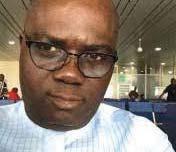
IYOBOSA UWUGIAREN With over three decades of journalism practice, Iyobosa Uwugiaren holds a Ph.D. in Journalism/Media Studies. He currently the Nigerian Guild of Editors (NGE) General Secretary and the Editor, Nation’s Capital, THISDAY Newspapers Group.
Twenty-five years after Nigeria returned to civilian government, issues of ethno-religious/political conflict, national integration, and the best possible way to fix them, remain a burning conversation in our country. For President Bola Tinubu, who promised during his campaign to address the challenges, his policies and programmes don’t seem to be addressing the issues. Indeed, for many political observers, his unfolding policies, especially in the areas of allocation of resources and appointment in key positions, are a sharp departure from what he promised Nigerians a year ago.
While some diverse countries of the world with similar challenges are seen to have taken advantage of their diversity, that has not been the case in Nigeria. And despite different actions that have been adopted and implemented to foster national unity among different ethnic groups, primitive sentiments have continued to pervade the political system, festering like a ‘malignant tumor’ with related projections.
For sure, since the First Republic ethnic politics has continued to be one of the contentious issues affecting national integration in the country. With an ethnicity as a compelling tool for mobilizing access to power and resources in Nigeria, it has not only affected nation-building, but has also constituted security and governance challenges - threatening national integration. These ethnic differences - as prominent tools for political mobilization since the return of democracy in 1999, became very clear in the 2023 general election. Each of the three major ethnic groups had a presidential candidate and this swiftly divided the nation into ethnic empathies.
Expectedly, religion also played a noticeable role in the election. The APC ran on Muslim/Muslim ticket - both the president and the running-mate, which went against the tradition of running a Muslim and a Christian on the same ticket to attract voters from across the spectrum. The candidates campaigned directly in churches and mosques to encourage voting on religious grounds. And managing the outcome – after the election, was expected to pose a serious challenge, and this is what Tinubu promised to deal with during his inaugural speech.
However, a year into his four-year tenure, many political observers have started knocking Tinubu – like his predecessor, for favouritism in the distribution of opportunities. And as usual, the issue of marginalization has become a major conversation in the land. The question, again, is: Why should diversity in culture in Nigeria been a breeding ground for the country’s misfortune, which is in turn dragging the country backwards. A country of over 500 ethnic groups and estimated population of 250 million people, these problems, which emanated because of ethnicity, are negatively affecting the political, economic, social, and cultural growth of the country.
Check it out: In the last two decades, the penetrating communal and religious conflicts in the country have led to the formation of several militia groups,
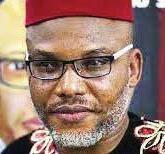
like the Bakassi Boys, Movement for the Actualization of the Sovereign State of Biafra (MASOP), Odua People's Congress (OPC), Egbesu Boys, IPOB, Boko Haram and others. This has largely impacted negatively on our economy and national security.
Although many might argue that Nigeria as “a multi-ethnic, multi-religious and multi-cultural state cannot be devoid of conflict” - an inevitable friction in every society, but while other countries with similar challenges are making progress in dealing with their issues, it has continued to constitute one of the greatest challenges to human relations and development in Nigeria.
From the look of things, the country’s landscape will require thoughtful efforts to strengthen a greater level of national unity by President Tinubu. And if the government is going to stimulate the country to collectively pursue development, it must start by being fair to all the diversities. While there were past efforts to address the issues, politicians have continued to be a major obstacle. A situation where sharing of resources and appointment to key national offices is based on religion/ethnic considerations, will not help the situation.
While some countries with similar challenges are seen to have taken advantage of their diversity, that has not been the case in Nigeria. And despite different actions that have been adopted and implemented to foster national unity among different ethnic groups, primitive sentiments have continued to pervade the political system
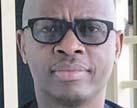
President Tinubu must deviate from the past and start promoting inclusive citizenship by fostering a sense of belonging among all citizens, regardless of ethnicity, religion, or political affiliations. The President must start developing a shared national vision, values and symbols that unite citizens, and facilitate open discussion and listening among various groups to address grievances and build trust. The time to address social and economic disparities – implementing policies to reduce inequality and promote equal opportunities is now. Because when there is lack of national integration, it can hinder economic development, investment, and growth. A divided society may create fertile ground for extremist ideologies and groups, just like we currently have today. And weak national integration can lead to erosion of trust, empathy, and social bonds among citizens.
Like many people have observed, “unity has not completely failed” in Nigeria. There are many ways Nigerians from all tribes, religious groups, geographies, ages, and gender have united - independently of direct government intervention. Indeed, many Southerners have moved to the north such that southerners are now major businessmen and women in Kano, Kaduna, Borno states and other part of the north. In turn, many northerners now live and work in the south, making huge progress in trade and commerce.
These may be clear signs of unity: that people from the North and the South can grow to trust another on issues important to their lives and livelihoods. This is an important factor that the Tinubu–led government must build upon, in a sharp departure from the past. And he can’t afford to fail Nigeria. If there are men and women in his team who don’t share his sense of nation build, the president should relieve them of their jobs now. A divided nation may be more susceptible to external interference and exploitation. So, by addressing national integration question, a nation can mitigate this danger and build a more united, prosperous, and resilient society.
PAUL NWABUIKWU A pioneer THISDAY Editorial Board member, Paul Nwabuikwu, who has also served on The Guardian’s Editorial Board, is a respected public intellectual with decades of experience in journalism, advertising, and public communication. A winner of the DAME Awards for Informed Commentary, Nwabuikwu served twice as Special Adviser to former Finance Minister and current DG, World Trade Organisation (WTO), Dr Ngozi Okonjo-Iweala. Nwabuikwu holds a first degree in Mass Communication from the University of Nigeria, Nsukka and MBA from the University of Jos.
Last week, global music icon Stevie Wonder became a Ghanaian citizen. The multi-Grammy-winning singer, born Steveland Morris, celebrated this milestone with heartfelt exuberance and joy. In a video shared on social media, the blind genius beamed as he danced and played the drum amidst a joyous crowd while a troupe of his new compatriots danced energetically around him. Considering the brutal history of the Slave Trade, which forever separated Wonder’s ancestors from their native communities, the event was tinged with both unspeakable tragedy and a defiant, triumphant joy.
Mr. Wonder is, of course, not the first son of Africa to return, centuries after that infernal journey across the Middle Passage. For generations, African Americans have seen the pilgrimage to Africa as a rite of passage. Some, like Wonder, have taken it further by becoming official citizens of their chosen African countries. The reasons are obvious: Ghana’s status as a Pan-African hub, the enduring legacy of Kwame Nkrumah, and the country’s robust policies have made it a favorite among African descendants worldwide. However, not all descendants are created equal. Wonder’s profile as one of the world’s most accomplished musicians, with 25 Grammy Awards—the highest for a male artist—sets him apart. He is one of those rare artists who bridged the gap between critical acclaim and mass popularity, including winning three Albums of the Year at the Grammys within four years during the 1970s. So, it is no surprise that his “homecoming” has become another PR coup for Ghana’s PanAfricanist tourism. He is part of a larger trend, with an estimated five thousand African Americans and four thousand Jamaicans having settled in Ghana over the past few decades. This wave was paved by notable figures like Martin Luther King, George Padmore, Malcolm X, Muhammad Ali, Maya Angelou, and other famous Americans of color who visited Ghana during the exciting period following its independence in 1957. W.E.B. Du Bois, the
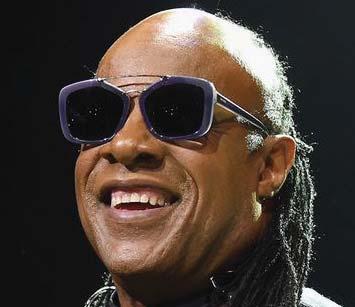
It’s clear why Nigeria was not an option for Stevie Wonder and thousands of other Black descendants before him. They have no welcome mat into the world’s largest Black nation. The question is: going forward, how can Nigeria do better?
famous scholar and activist, first African American to earn a Harvard PhD in 1895 did not just pay a pilgrimage and felicitate with Nkrumah. He stayed back. Stokely Carmichael, a founder of the revolutionary Black Panther Party, moved to Ghana and then Guinea in the late sixties, eventually changing his name to Kwame Ture in honor of his heroes—Nkrumah and Sekou Touré, the first president of Guinea. Rita Marley, a celebrated musician and wife of Bob Marley, is another celebrity who relocated to Ghana. She has been a Ghanaian citizen since 2013 and has lived in the country for over twenty years. Her foundation provides scholarships and meals to indigent schoolchildren and builds and refurbishes school buildings in impoverished areas.
Notably, South Africa currently hosts about three thousand African Americans, while Ethiopia is home to between six hundred and eight hundred African American residents.
Stevie Wonder’s decision at 74 to journey to Africa and become a citizen of a neighboring West African country is an inspirational tale of history, blood, suffering, resilience, and ultimate triumph. It is also a reminder to those of us who can easily trace our lineage that millions of our kinsmen were denied this privilege under horrific circumstances. We have a responsibility to remember, honor, and support their descendants who have embarked on the journey home—moving in the opposite direction from the Middle Passage. It is also a reminder that Nigeria, the largest collection of Black people on the planet and possibly the territory which lost the most people to slavery, a nation located just over a thousand kilometers away from Ghana, is missing in action. This excerpt from “Religion and Public Life”, a publication by Harvard Divinity School captures the central role that the territory known today as Nigeria played in the Transatlantic Slave Trade: “The Transatlantic Slave Trade began in the late 15th century in Nigeria. By 1471, Portuguese navigators hoping to
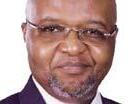
OKEY IKECHUKWU With three decades of hands-on experience in the university system, the media and government at the highest levels, Ikechukwu, mni, is the Executive Director of Development Specs Academy, an internationally certified management consultancy and training partner of several institutions and organizations. Ikechukwu was, at various times, Lecturer at the University of Lagos, Acting Editorial Page Editor, and acting chairman of the editorial board of The Guardian Newspapers. He holds a doctorate degree in philosophy from the University of Lagos.
Many sceptics had their doubts about the sincerity of the military when the regime announced a transition to civil rule programme in 1999. Even more sceptics looked on with misgivings when details of the process that would lead to the “threatened” hand over to a democratically elected government were rolled out. 25 years later, out democracy has seen all manner of highs and lows. But we are making progress all the same.
Our progress is coming through bitter, mind boggling, morally disorienting and psychologically devastating lessons. The lessons are apparently unscripted, and the teachers are teaching away without Lesson Notes and conventional teaching certificates. And they are exacting and merciless – these teachers. The names of the teachers include the following: (1) Dishonest politicians, (2) Broken promises, (3) The consequences of citizen gullibility, (4) The results of supporting the wrong candidates, (5) The progressive denudation of the capacities of our national defense and security forces, and (6) The increasing inability of the ruling elite to protect itself from its own depredations.
President Olusegun Obasanjo, coming in as the first to hoist the flag of democratic rule after the military, was a quasi-military-civilian president. He did his best to craft good policies and establish institutions that would aid good governance. He was also very attentive to best global practices in many ways. He tried to assemble, and work with, a team of competent persons and listened to good counsel on many important issues.
It was the Third Term Project, real or imagined, that became his undoing in many ways. But since the jury is still out on that alleged gambit and given the trajectory of the Yar’Adua government immediately after Obasanjo, it is perhaps best to leave the matter here for now and look more closely at the further fallouts of the historical events of our nationhood, going much further back; beyond Obasanjo and those who handed over to him. So, let us properly situate Nigeria’s current profile and the trajectory of its democratic enterprise guided by a deep sense of history.
Presidents Goodluck Jonathan and Muhammadu Buhari, for instance, were the circumstantial by-products of a system of elite myopia that had been prevailed in the land for over 50 years now. They were not entirely responsible for the problems they inherited. They were not entirely responsible for their approach to the problems they tried to solve. They were also not entirely responsible for all the wrong things that happened under them.
Their parties, the PDP the APC, were, again, not entirely responsible for everything wrong with Nigeria today. Without denying the shortcoming of all the political leaders and their parties, we must look much more closely at the basic conceptual framework with which the political elite approaches leadership and leadership positions, in order to see very clearly how the entrenched dysfunctionalities of our benighted nationhood has thrust upon us generations of leaders and followers who do not know how to really lead, or how to really follow.
The Nigerian State was taken hostage long ago. For over 50 years now, many powerful individuals and groups have succeeded in pushing personal and limited group interests into the front row of national consciousness; such that, today, 25 years into a now-unsettling experience with a fledgling democracy, we are not sure where we really are as a nation. Those whose interests are at variance with wider and deeper national interests have become the real enemies of Nigeria. They may well have actually constituted themselves into a team of highway men and women who waylay everything that could rescue Nigeria and consolidate our current democratic experiment.
This 25 years old democracy is being bombarded from all sides by (1) A fundamentally distorted eldership recruitment process, (2) Skewed values, (3) A largely dysfunctional educational system, (4) A flawed national psyche and (5) A youth bulge that is increasingly becoming the biggest unaddressed national crisis. With every passing day, these problems morph into new, and self-replicating, societal challenges.
Our nascent 25 years old democracy has thrown up leaders with sudden stupendous wealth from questionable sources. Their wealth has mostly impacted their immediate and extended families, of less than 15 persons, and a few friends. Their local communities, members of their religious congregations, most of their friends and even members of their extended families know how poor or rich they were a few years before they went into politics. The priests, traditional rulers and other supposed custodians of public conscience ask no questions. And that is one major difference between these pillars of value of yore and those of today. The traditional rules, the religious leaders, the family heads, uncles and aunts used to ask anyone of sudden wealth his means of income and livelihood. Not anymore! No more “My son, I hope you have not gone into strange and possibly evil ways.” You become an “illustrious” son or daughter, and a great pillar of faith in your place of worship once your cash value moves up. And this is while almost everyone, including their kith and kin, silently regard them as thieves
BY OKEY IKECHUKWU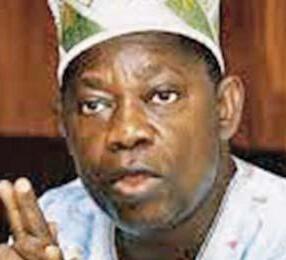

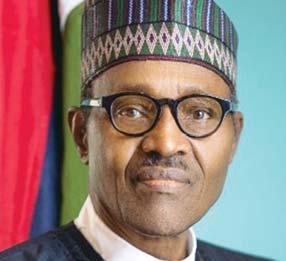
The Nigerian State was taken hostage long ago. For over 50 years now, many powerful individuals and groups have succeeded in pushing personal and limited group interests into the front row of national consciousness; such that, today, 25 years into a now-unsettling experience with a fledgling democracy, we are not sure where we really are as a nation.
who got away with their loot!
The Jonathan Presidency could have done much better than it did, but it allowed itself to be ruined by avoidable blunders, indecisiveness, image deficits, and a consistent failure to present an inspiring comportment. The Buhari Presidency, too, could have done everything it did very differently. But it chose to be appallingly nepotic, shamelessly insular and roundly impervious to everything a government should do to promote inclusivity, genuine national development and sustainable national values. It is the decades-long effects of the overlooked fundamentals of true patriotism and nationhood that are creeping out from the woodwork to haunt us today. The absence of truth, deep knowledge, nobility of soul, propriety in public affairs, dignity in self-presentation, competence and decency in leadership have all come calling. They are all under the table as I write, shaking the table on which our democracy is standing in discomfort.
The nation blew its chance for a rebirth offered by the undeclared results of the June 12, 1993 presidential elections. The presidential candidate and his running mate were Muslims, but that did not matter to anyone. The electoral body put up an impressive performance, in preparing for the elections. The voters put up their best behaviour on the day of election. Electoral materials arrived on time. The voters queued up to exercise their franchise. The results, announced or not, were obvious. Chief Moshood Kashimawo Abiola was going to become the next president of the Federal Republic of Nigeria by popular choice, after Gen Ibrahim Babangida.
Then, inexplicably, a malodourous stench began to envelop the entire exercise. It was subtle at first. A sort of vague, but silently menacing, spectre. Or so it seemed at first. Then, to everyone’s horror, it began to gain solidity. Yes! The electoral body just wouldn’t announce the obvious results. As minutes turned to hours and hours turned to days and weeks, concerns mounted. Then there was an announcement: The outcome of elections had been annulled. It put the nation in a mood that is best captured in the Lamentations of David in the Bible thus: “The beauty of Israel is slain upon the high places. How art the mighty fallen? Tell it not in Garth, publish it not in the streets of Ashkelon, lest the daughters of the philistines rejoice…exalt”. For Nigeria, it was this: “The proof that Nigerians can rally and speak with one voice, in response to someone they consider their own, irrespective of ethnic roots and religious loyalties, is murdered by an ethnocentric cabal that has inflicted a desperate stranglehold on the nation.”
But, unlike the biblical David, who called on his people not to voice the great calamity, to avoid ridicule by perceived enemies who never wished them well, Nigerians were urged to go to town. “On June 12 we stand” became the most popular war cry all over the country in 1993, immediately after the annulment of that near-flawless election results. Sections of the elite, traders and tradesmen/women, workers, business owners, and many retired military officers spoke up and acted up. The international community was invited to say “no” to such travesty. Then, and very sadly, this national battle cry, born of true patriotism and a sense of brotherhood among Nigerians, began to wane in a section of the country. A disengagement from one Nigeria, not from Abiola, was fanned and made to crystalize even further. The federation created by Abiola began to recede. The strikes, sit-at-homes and protests achieved nothing. A nation had just been buried. Then came a not-very-surprising wonder: Many who were initially standing on June 12 out of genuine conviction began to lose their enthusiasm; for various reasons. Some moved from “On June 12 we stand” to “On June 12 we sit”. Many who were standing on June 12, including those who had moved from standing to sitting, joined a new, “On June twelve we feed” group. “On June 12, and from June 12 shenanigans, we get our daily bread” was born. But that was after General Sani Abacha had displaced the Interim National Government (ING) put in place by Babangida. Abacha met three categories of June Twelvers, namely: (1) Those who stuck to their guns on the need to announce the results and declare Abiola President Elect and (2) Others, including Abiola himself, who were in league with Abacha on his coup on the naïve understanding that the foxy soldier would hand them political power after displacing the ING. If only there was a law against delusions and reckless dreaming!
The message for us today, and especially for President Bola Tinubu, is that honest pursuit of our long-term national interest is the greatest investment anyone can make in Nigeria today. This democracy is threatened by elite irresponsibility, grave security challenges, declining national productivity, and unparalleled grand larceny in the form of institutional and personal corrupt practices.
What have we gained in the last 25 years? A lot, in terms of the lessons of life. Tottering, wobbling and flip flopping, we are being taken on a path of growth which many great nations of today have gone through. It is not yet time for the ideal, because the profane is still tolerated and celebrated. A time will come when that will also not be possible. Meanwhile, flip flopping is real. But so is the forward movement – for those who see the wood despite the trees. There will be a day of reckoning, not the same for all the bad actors. Each in his own time and turn. We are on course, strange as this may sound!
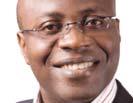
WAZIRI ADIO is the founder of Agora Policy, an Abuja-based policy think tank. He had stints as the Executive Secretary of the Nigeria Extractive Industries Transparency Initiative (NEITI), THISDAY editorial page editor, special adviser to the senate president, communication specialist at UNDP etc. He obtained his first degree in Mass Communication from the University of Lagos, Ms. in Journalism from Columbia University and another and Master in Public Administration from Harvard University, where he was, at different times, a Fellow of the Neiman Foundation for Journalism, and an Edward S. Mason Fellow in public policy and management.
Aquarter of a century of civil rule is, unquestionably, no mean achievement for Nigeria. Combined, our first three attempts at democracy didn’t last up to ten years: the First Republic fell apart after five years, three and a half months; the Second Republic unravelled after four years and three months; and the Third Republic came out of the delivery room as a stillbirth. Until the current dispensation, it could be argued—and it was indeed widely argued—that democracy was jinxed in Nigeria. Not anymore.
Elected officials have now ruled the country for 34 of our 63 years of independence or for 54% of the time. This is a sharp contrast to the pre-1999 period when military rule was the overwhelmingly dominant form of government in Nigeria. Today, more than half of Nigerians, according to official estimates, were born after the 1999 transition. This means that a majority of Nigerians, including a sizeable number of those currently qualified to vote, have never experienced military rule. This is quite significant.
Many jinxes have been broken on the way to the silver jubilee of our current democracy. The records that have been shattered include: seven successive elections, against the previous record of two apiece in the first and second republics; peaceful transfers of power from one elected administration to the other thrice, against the previous record of zero; two elections in which incumbent presidents were term-barred after serving out the constitutionally allowed limits of eight years, against the earlier record of zero; and the defeat of an incumbent party and president, hitherto thought totally impossible in Nigeria.
Based on these and other parameters, as well as the longevity of the current republic, it can be argued that democracy has finally taken root in Nigeria. It has not all been smooth-sailing though. We have had nasty elections and testy moments and elected leaders with autocratic impulses. But through it all, democracy has managed to emerge as the ‘only game in town,’ that phase that scholars and students of democracy and democratisation call ‘democratic consolidation.’ On that score, there is reason to cheer, even if cautiously.
But longevity is not necessarily the same as maturity or growth. Likewise, endurance is not necessarily an insurance against backsliding or reversal. While we should celebrate how far we have come in our democratic journey, we should see this jubilee as an opportunity to examine the quality of our democracy and as a reminder of the need to get democracy to live up to its promise. This approach should take us back to philosophical and practical debates about the value of democracy and the link between democracy and development.
As Amartya Sen and others have argued, democracy has both intrinsic and instrumental worth. The freedom to choose and change who governs you and to benefit from other suites of freedoms/rights that should be taken as a given under civil rule represents the intrinsic worth of democracy. Those rights and freedoms extend the God-given rights of individuals and enhance their agency to function as complete human beings and full citizens. As someone who grew up and worked as a journalist for some years under military rule, I do not need to be persuaded that democracy has an intrinsic value or that this dimension is indeed valuable beyond the symbolic.
But when many Nigerians clamour and put their lives at risk for democracy, they expect to enjoy more than just a bundle of rights and freedoms (which even a benevolent dictator may permit). They expect democracy to translate to visible and sustained improvements in their lives. They expect democracy to be beyond an end by itself, but also a means to a higher end. This is the instrumental value of democracy, which in everyday parlance is called dividends of democracy.
There is an old argument that there is no automatic link between democracy and development and shared prosperity, which is the higher and ultimate end-goal. This is still a valid argument. However, it is equally a valid point
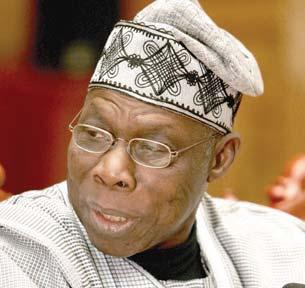
that democracy has an edge over autocracy because of the option of choice embedded in regular, free and fair elections. It is this implicit threat that a non-performing government can be peacefully thrown out of office that should serve as an incentive for good governance.
The expectation of a much better life for Nigerians under civil rule was well captured by Mr. Segun Babatunde in a story published by the Pan African News Agency (PANA) on 31st May 1999, two days after the transfer of power to President Olusegun Obasanjo. "It is a new beginning,” Babatunde said, echoing the sentiments many Nigerians who had lived for almost 16 years under the jackboots of the military. “It is like we have just won independence from the military."
A quarter of a century after, not many Nigerians remain giddy with excitement about democracy birthing a new beginning or signifying another independence. Without a doubt, some gains have been made in the last 25 years. We can easily point to roads, bridges, rail lines, airports, telephones lines, schools, hospitals and others that didn’t exist 25 years ago. Equally, there is the eight-fold increase in gross domestic products (boosted by rebasing, of course, and a few episodes of soft oil booms). Then, there is a slew of public financial management and other reforms that have been undertaken and have made governance comparatively more transparent and accountable.
But overall, more could have been done with the time and resources available. The quality of leadership and governance has been patchy. Despite restraining mechanisms, the level of state capture and official perfidy has multiplied. There are many areas we have not moved the needle much like electricity supply and the management of our oil and gas sector and on reduction of poverty and inequality. Also, there are some critical areas where we have actually regressed like security of life and property. Understandably, these areas of gaps play high on citizens’ minds when they assess the performance of our democracy.
We have had nasty elections and testy moments and elected leaders with autocratic impulses. But through it all, democracy has managed to emerge as the ‘only game in town,’ that phase that scholars and students of democracy and democratisation call ‘democratic consolidation.’
According to a 2022 survey by Afrobarometer, 70% of Nigerians preferred democracy as a form of government but most of them took issues with the quality of Nigeria’s democracy. A whopping 77% of Nigerians expressed dissatisfaction with the quality of our democracy in 2022, up from 57% in 2017. Also, 64% of Nigerians described our variant of democracy as a democracy with major problems or not a democracy in 2022 up from 48% in 2017. The takeaway here is that most Nigerians believe that the quality of their democracy is deteriorating at an age the democracy should be maturing. This should get us worried.
Relatedly, Nigeria has posted a spotty record on major measures of democracy, governance and development in the last 25 years. In its 2024 report, Freedom House ranked Nigeria as ‘partly free’, with a score of 44 out of 100. (Ghana, one of the five African countries ranked as free, scored 80 over 100). On the 2023 Democracy Index of the Economist Intelligence Unit, Nigeria is still categorised as a ‘hybrid regime,’ with a score of 4.23 out of 10, and ranked at number 104 out of 167 countries. On the Varieties of Democracy (V-Dem) Index of Liberal Democracy, Nigeria is scored 0.33 out of 1.
In 2021, Nigeria was ranked 30 out of 54 African countries on the Ibrahim Index of African Governance with a total score of 47.7 out of 100. Transparency International, in 2023, ranked Nigeria145th out 180 countries on its Corruption Perception Index, with a score of 25 out of 100. On its part, UNDP still categorises Nigeria as low on human development, with a score of 0.55 out of 1 and a ranking of 163 out of 191 countries on the 2023/2024 Human Development Index, a composite index of income, health and education. All round, these are abysmal scores. The point here is not a clamour for a return to autocracy, or a manifestation
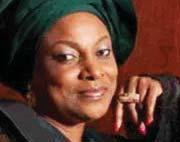
EUGENIA ABU A former Executive Director at the Nigerian Television Authority (NTA), Mrs Abu is a veteran Nigerian Broadcaster and award-winning writer. She is currently the Managing partner/ CEO of The Eugenia Abu Media. She is on the board of several international and national organisations, including the Savannah Centre for Diplomacy, Democracy and Development, and Veritas University. Mrs Abu is an external advisor for the On Nigeria programme of MacArthur Foundation
Iwas travelling in the Gambia many years ago when a taxi driver in whose car my friend and I were riding stopped suddenly and asked us to disembark. He had taken umbrage to the suggestion by my friend that the then Gambian President, the self-styled herbal curer of HIV aids, Yahaya Jammeh was a strange man who had built a tower in self-aggrandisement. I had previously explained to my friend that a poisoned arrow of words aimed at the president of a country was not what tourists did. The taxi driver forgave her after much pleas and we went on our merry way.
While she was entitled to her opinion, my friend had been an ungracious tourist displaying a high level of incivility. Her approach, her language, and her bombastic nature got the goat of the taxi driver. A debatable issue in democracies is around what is advisory and what is mandatory for citizens. So, should we insult a president in traffic or even closer home should we insult each other in traffic? It is certainly cliché but still a much needed one, to say that one must treat a fellow world traveller the way they wish to be treated. And certainly, with freedom comes responsibility. In Nigeria, a president, and it does not matter which one, is cannon fodder for citizens and whoever is giving them a commercial ride. From regular taxi drivers to the new app drivers, there is no limit to what you can say about the leadership of Africa’s most populous nation or anyone for that matter. It is unlikely that a
It is time to ponder whether our road rage, reckless driving, drunk driving, over speeding, overloading, juvenile driving and use of cell phones while driving is meant to be on the rise within a democratic system.
Nigerian taxi driver would be so offended by a tourist insulting their leader that he would pull up and politely ask him to disembark. Often, they would in fact join in the fray and invent new invectives and give the tourist some sneak peek to undo his nation’s leader.
Many years ago, when I was still active as a national television anchor, I had taken a ride from the famous Balogun market back home. I was in disguise, sunglasses, face cap etc. If you did not know me prior, I was unrecognisable. The taxi driver had spent 3/4 of the ride completely stripping my fellow anchor. He was travelling with his brother and had pleaded that he rode along which I obliged. Upon arrival, I identified myself. He knew the game was up and ran for dear life. He did not know my colleague well enough to disembody her so badly.
Professor of law and author Stephen Carter in his famous article, ‘The Etiquette of Democracy’, posits that his point is not to tell us how to speak, “my point is to argue that how we speak is simply one point on the continuum of right and wrong ways to treat one another. And how we treat one another is what civility. As Carter rightly puts it, saying hello to a stranger on the street or driving with a bit more care are acts of generosity. Moving into this new cycle of democracy, what
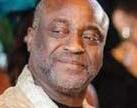
FAFAA DAN-PRINCEWILL A lawyer and
Half the nation is seventeen years old or younger. A staggering 70% of Nigerians are 30 or younger, while only a mere 3% have crossed 65 years. Nigeria is pulsating with youthful energy and promise with some risk of too many not knowing relevant basics. This youthfulness formed the backdrop for my thoughts as I got a call to contribute to the commemoration of Nigeria's record 25 years of unbroken democratic governance.
The call sparked a torrent of memories – the arduous struggle for democracy, the relentless fight for a voice. I listened intently as the caller's persuasion grew, weaving a compelling narrative.
The timing, however, was far from ideal. Fuel scarcity had reared its ugly head once more, inflation galloped forward, and the chorus of job seekers and pleas for financial help swelled. Adding to this weight, another close friend, a former classmate and two close relatives by marriage all passed away in quick succession. The stark reality of Nigeria's 56-year life expectancy settled heavily upon me. My caller insisted that I should write on any topic of my choice. I wondered if Nigerian journalists among others, those who stood in the trenches of the democratic struggle, have been lauded for their courage, patriotism and labour of love? Those foot soldiers, the ones who confronted national issues head-on, who took a stand and gave voice to the voiceless.
As a young lawyer brimming with idealism and a budding entrepreneur my dedication to public service entailed significant sacrifice too, at the time. I had donated a day each week, for over a decade to this very cause. My Wednesdays were spent as part of the editorial board at THISDAY and another day at another leading paper. It was a crucible that added spice and character to my developing worldview – a time of confronting critical issues, taking decisive stances, and shaping viewpoints. It was an education, a constant exchange of ideas, a space where we envisioned a better Nigeria together.
These experiences, these conversations woven within the journalist community, gifted me with an enduring understanding of our nation. I pledged to write a piece, but the question remained – what to write about? What narrative had yet to be woven? Should it dwell on the shortcomings, the unfulfilled dreams, the crippling debt, or the fractured political landscape? Or perhaps a call to our youth, urging them to stay or to leave, to Japa or not to Japa? Should I delve into the philosophical, explore the meaning, essence and promises of democracy or talk about Nigerian identity or unrelenting spirit?
Twenty-five years of democracy – our third attempt, and by far the longest. A democracy like some of those noisy, undying and rickety vehicles moving slowly in a slant but still covering miles. 25 years is less than a speck in the grand scheme of a nation's life, yet an eternity for a nation so young, with citizens so young that only a tiny select few hold vivid memories of a time before democracy.
Clarity emerged – the focus would be on our youth. As a former youth leader and activist, now one of the under 3%, I decided to address what information, knowledge, and understanding our youth need to have, that could constitute the very foundation that every Nigerian youth should possess. Education, training, honed skills, and in addition a global awareness, a consciousness – these are the weapons we must equip them with. Awake, Nigeria!
Our story transcends mere colonialism – it stretches back to the ancient identity of the black people along the Niger River. But what truly defines a Nigerian? This piece is not a history lesson, but history holds undeniable weight. We must grasp the interconnectedness of our past, present, and future. The lessons learned from the past illuminate the path forward. Let us march onward, not in bitterness or but with a resolve to learn from past mistakes, a commitment not to repeat the errors
Across the globe, Nigerians have carved their names into the fabric of human achievement. Carry that torch with unwavering confidence and pride. As you march forward, the world will recognize your brilliance, creativity and courage, making room for you to claim your rightful place.
and failures of the past,
The British ‘amalgamated’ Nigeria in 1914, a loaded term in itself, a term dripping with colonial arrogance. The initial military force, ‘The Hausa Constabulary,’ later evolved into the ‘Hausa, Yoruba, Mohammedan Constabulary.’ It is instructive to note that the first officer corps, the first 50 individuals, included 38 from the present-day Southeast and South South), only eight Yoruba Christians. Interestingly, the Fulani, while positioned as political leaders, were excluded from the military, especially the officer corps, making their grip of power isolated and dependent. This historical ethnicised military and the imbalances were reflected in the two coups of 1966 and continue to cast a long shadow.
We cannot as a nation seem to get away from these imperfections handed to us. In a recent debate in the National Assembly, we are still talking about recruitment by state quota into the military. The automatic admission of graduates from military schools into the Nigerian Defence Academy and the officer Cadre is still coloured by this uneven distribution handed to us. 25 years of democracy should usher in a military that is neither ethnic or politicised.
Understanding our past is crucial. Nigerians must not be prisoners of amnesia; Nigeria's narrative must not be lost to the fog of forgetfulness. The elders have a solemn duty to pass the torch of our history to the youth. Woven into the tapestry of our struggles and sorrows lies the bedrock of our resilience, our unwavering endurance, and the echoes of hard-won victories. This is the saga of a people brimming with vibrancy and imagination, a nation forever poised to contribute its unique talents across every horizon.
The global landscape is shifting dramatically. Our beloved ECOWAS, a natural economic community, fractures under the strain of tensions between France and its former colonies. Shockingly, evidence has surfaced of a secret agreement between France and its colonies to essentially maintain a colonial relationship even after "independence."
The British may not have left such a clear blueprint, but questions linger. Nigerians deserve to know the full story. As a people we need to equip ourselves for the emerging new world. As Nigeria celebrates its democratic anniversary, we must confront the layers of challenges we face. True freedom lies in breaking free from the mental shackles that hold us back.
The fight for a better Nigeria is far from over. Let us embrace our shared heritage, understand and accept our history, never be afraid to rethink, correct or reform while building towards a future that fulfils the immense potential of our great nation.
On this 25th anniversary of democracy let me, as it is said across the land, use as a point of contact my mystery caller, Olusegun Adeniyi, a well decorated journalist, serial author, served meritoriously in government and still serving the nation in Journalism, to salute all Nigerian Journalists that have contributed to the enthronement of democracy in Nigeria. A special toast to all the old men today who were part of that brimming pulsation of energetic youth whose sacrifices bequeathed democracy, never mind the warts and all.
In closing, let us raise a toast to Nigeria's youth. You stand blameless amidst the nation's struggles yet bear the weight of both its burdens and its triumphs. You are the anchors of our aspirations, the custodians of our blood-stained legacy. Nigeria is your inheritance, a tapestry woven with both challenges and opportunities. While the path may not be clear, your potential knows no bounds. Across the globe, Nigerians have carved their names into the fabric of human achievement. Carry that torch with unwavering confidence and pride. As you march forward, the world will recognize your brilliance, creativity and courage, making room for you to claim your rightful place.
Awake Nigeria!
tap the fabled Saharan gold trade had reconnoitered the West African coast as far as the Niger Delta, and traded European commodities for local crafts as well as slaves, the latter which turned out to be highly lucrative. In the early stages, Europeans captured Nigerians in raids on coastal communities, but as the demand grew, they relied on slaves to be supplied by local rulers, traders, and the military aristocracy, providing these agents with rum, guns, horses, industrial products, and fine muslin cloth.
“By 1490, more than 3,000 slaves a year were transported to Portugal and Spain from Africa. With the European expansion and colonization of the West Indies and America, what was a small market in ivory, gold, and slaves transformed into a massive, global trade. From the last third of the 16th century to the early 19th centuries, Portuguese, then Dutch, then French and English merchants greedily expanded the African slave trade internationally. Enormous profits were made, mostly by Europeans, but a small number of Africans also benefited economically, mostly along the southwestern coast of Nigeria…”
The numbers are telling. According to the publication, which quotes scholars Toyin Falola, Saheed Aderinto, and others, over 3.5 million slaves were forcibly taken from Nigeria during the slave trade, with many ending up in South America and the Caribbean.
While history acknowledges Nigeria’s significant role in the societies impacted by the slave trade, there is little evidence of that primacy today. Instead, Ghana stands as the beacon for the Black diaspora, the destination they look up to. South Africa and Ethiopia are also prominent on the diaspora radar. However, neither public policy nor economic imperatives have driven Nigeria to engage seriously with Black America and the Caribbean in a structured manner with clear strategies and defined goals. The secret of Ghana’s success and by extension Nigeria’s dismal failure is not difficult to track. Ghana is reaping the benefits of its efforts, while Nigeria remains a footnote due to its lack of action. Stevie Wonder’s journey home was not only a personal discovery but also a response to Ghana’s longstanding, structured
campaign to attract African Americans and other Black descendants worldwide. The peak of this campaign was the highly successful "Year of Return," organized to commemorate 400 years of slavery in the Americas, with the first slaves arriving in Jamestown, Virginia, in late August 1619. Beyond the historical and cultural dimensions, the campaign had a practical objective: encouraging Africans from the diaspora to come home, settle, and invest. According to figures from the Ghana Tourism Agency, the country spent $3.5 million on Year of Return activities, attracted 760,000 visitors in 2019 (129 of whom were granted citizenship), and generated nearly $2 billion in revenue by the end of that year. It’s clear why Nigeria was not an option for Stevie Wonder and thousands of other Black descendants before him. They have no welcome mat into the world’s largest Black nation. The question is: going forward, how can Nigeria do better? Hopefully, the country’s policymakers in tourism and related sectors are addressing this issue. It’s a matter of blood, history - and economics.
of what some call autocratic nostalgia. Definitely not for me, as I have as an adult experienced both democratic rule and military rule, and will never wish for the latter, even in its most benevolent form. The message is that Nigeria’s democracy could have delivered much more in terms performance on major indexes and especially in meeting the valid expectations of Nigerians. Even when we factor in the complications that electoral politics introduces to a patronage-based, heterogenous and complex
country, we have to agree that twenty-five years is a very long time for Nigeria to have made significant improvement on external ranking and internal perception of the quality and the performance of its democracy.
The best argument for democracy, especially in the context of recent reversals around us and at a time the majority of our citizens do not have a memory of how nasty military rule can be, is that democracy is indeed the best option, not only in
symbolic but also in substantive ways, for citizens’ welfare. As we look back and look forward, this is the point that should not be lost on us. We need to remove the binding constraints to good governance, deepen the democratic temperament of our politicians and citizens, and enhance the instrumental value of our hard-won democracy.
(*A version of this piece was published in Adio’s column on 5th May 2024)
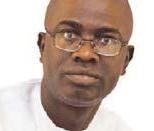
OLUSEGUN ADENIYI Journalist, writer, public speaker and former presidential spokesman, Olusegun Adeniyi is a Fellow of the Nigerian Academy of Letters (FNAL) and a Fellow of Nigeria Institute of International Affairs (NIIA). Author of several books, including ‘Power, Politics and Death: A front-row account of Nigeria under the late President Yar’Adua’, Adeniyi is a Council Member of the Belt and Road News Network (BRNN) in Beijing, China.
(On 6th January 2000, I wrote, ‘Who Dares Impound AA375 SHA?’. What followed, in the ENDNOTE, is why democracy is still very much preferred to other forms of government, despite its own challenges.)
When on Christmas Day (25 December 1999) I informed my departmental leader in Church, Mr Abiola Olatunji that I would be travelling to the village the next day to see my parents, his first reaction was: “With this car?” What many people do not know is that my rickety Peugeot 504 saloon car herein being referred to as AA 375 SHA is more than a vehicle. And it is inconceivable to go to the village without it. I learnt that the hard way.
Two years ago, I had travelled home with a cousin. Since our compound was the first as you enter the village and his happens to be at the other end, I had to drop him first. I then decided there was no point driving back to ours, so I packed my vehicle in his compound and just walked back home, since I had already offloaded all the things I brought before driving down. By midnight, a family meeting was summoned, at the instance of a visiting auntie, who asked me to explain why I did not deem it fit to park AA 375 SHA in our compound. Not only did I apologise for that lapse in judgement, but I also had to go and bring the car to our compound that night.
That experience taught me that AA 375 SHA is more than a means of transport. It is also a political object that reflects the status of some members of my extended family back in the village. Since AA375 SHA was not acquired straight from the factory (I am not calling it ‘Tokunbo’), it goes without saying that it may actually be older than some members of the Lagos State Executive Council, especially if a panel were to visit France to establish its year of manufacture. That, I understand, may be a problem, going by a new directive from the Lagos State government.
Within the two weeks that I was away from the country last month, there was a grand conspiracy against AA 375 SHA that I did not know of until yesterday. It is called the Ministry of Transport (MOT) Test to be conducted by some civil servants. For any vehicle to pass the MOT test, the following must not only be available but also functional: Lighting Equipment-front, brake, reverse and hazard lamps as well as trafficators. The vehicle is also to have efficient braking system, including parking brakes. Others are good tyres, a spare tyre, jack, and wheel spanner as well as working horn, operational wipers, registration plate, c-caution, fire extinguishers, fire escape (commercial vehicles only), ventilation and reflectors.
“The process of obtaining an MOT Test certificate is to pay a N1000 testing fee to any Magnum Trust Bank, proceed to any MOT test centre of your choice for the test. If your vehicle is impounded without MOT test certificate, you would be required to pay N5,000 fine and acquire the certificate before it will be released. In the event of any vehicle not passing the test, a vehicle owner is required to re-appear not later than three days after putting the necessary defects in order… in the event of a lapse of time (more than three days after the first test) another payment would have to be made for conducting another test”, according to a statement signed by Mr Sina Thorpe, Press/Public Relations Officer, Ministry of Transport.
If this is not a conspiracy against AA375 SHA I don’t know what it is. I doubt if any of these things are ever functional in my car for a week. What the governor and his men are really up to with this law I don’t know but one thing I do know is that the conspiracy against AA375 SHA will fail because more than 50 people depend on it for survival and they will not keep quiet. There is Kabiru, my first mechanic in Surulere who still has a retainership on AA375SHA, three years after I relocated to Abesan Estate in Ipaja. He is a specialist in the Propeller Shaft of the car which keeps giving problem every month. Kabiru had to be brought in last December to perform some magic before the millennium visit home. For the two years I lived in Surulere after acquiring the car, Kabiru and I shared the usage. Every week, he had to take delivery of it for at least two days. But Kabiru did
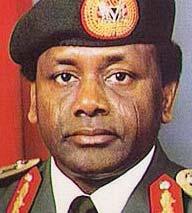
not have the exclusive right to AA375 SHA. There was and still is Tubosun, my all-purpose mechanic near Concord Press. The importance of Tubosun to the car cannot be overemphasised. For he knows all the places where you can procure plugs, adaptor, condenser, and coil on credit and that is done ever so often. Another advantage of Tubosun is the ingenuity in asking you to bring N2,000 for spare parts that he claims go for N5,000. If you don’t pretend to be stupid, how would AA375 SHA still be on the road?
Right there in Abesan Estate, Ipaja, there are Tony and Alfa, both competing for the exclusive rights to the maintenance of AA375 SHA. In my first year in the estate, Tony had to perform some abracadabra on the engine every morning before I leave for the office. The plugs had to be cleaned, the contact set sandpapered, and a whole lot of other things just for a hundred Naira. After Tony came Alfa (that’s the name everybody called him) who defrauded me of N6,000. The unfortunate thing about my relationship with Alfa is that he got me cheap and at the end, took away AA 375SHA for a week to do Kabukabu. The damage done to the car in those few days that raised my blood pressure so high is yet to be fully rectified.
As I reflect on that encounter, I knew if my piece had been written a year earlier under the military, I probably would have ended up in detention with my car confiscated. So, the message is simple: While Nigeria’s democratic journey has not been perfect, considering our experience under military rule, we should never take the freedom we now enjoy for granted.
Very close to my old office in Ikeja is Muyideen (aka AIT) who is an expert in steering rack, big bushing, spider boris and such other engine parts you may not know about AA375 SHA. Sometimes too, he suggests that he be allowed to wash the car at a special place where they charge N100. The problem is that he would often come back with a bill of N150 because “there was no water and had to pay extra money for water. In the last one week, Akeem, my new mechanic, has shown his expertise in shock absorber, gear selector and tie rod. We have not talked of the battery charger, the vulcanizer, the enigine oil seller and petrol attendant, all of whom benefit from the AA375SHA economy. But how could it have survived without the panel beater? There are three actually. One is an expert in silencer which must be repaired every week to make the sound a bit tolerable. The other works on the body which now has more body filler than panel.
On a more serious note, is the MOT directive the solution to the chaotic transport situation in Lagos? At a period when all eyes are on Governor Bola Tinubu to find a permanent solution to the problem of refuse dump and probably bring in his alternative power plant, what concerns the governor, and his men is the strategy on how to reduce the number of car owners in Lagos. Assuming the law is in good faith, how come it is to be enforced with immediate effect like an Abacha decree? How many vehicles are less than five years old in Lagos? What is the essence of the law in our peculiar situation when only few can afford Tokunbo cars? There are several issues begging for attention in Lagos State and some people would rather chase shadows. How would the MOT decree impact on the life of residents? Notwithstanding the conspiracy of the Lagos State government against people like me, no car owner in this state will leave the road for another. Nobody, and I repeat nobody, can impound AA375SHA.
ENDNOTE: On the same day the column was published, I got a call from Alausa that then Governor Bola Tinubu wanted to see me. I honoured the invitation the next day. The moment I arrived at his office, Tinubu said rather jocularly that I had dared him with the last line of my article hence I would not leave Alausa with the car. But what surprised me was that before I was ushered into his office, some officials of the Ministry of Transport were already waiting. He asked them to explain the essence of the policy tome. What followed was an interesting conversation. I was told that the MOT was just the beginning of a process which later culminated in the establishment on 15th July that year (2000), of the Lagos State Traffic Management Authority (LASTMA) with the late Chris Olakpe, a retired Assistant Inspector General of Police as the pioneer CEO.
I am not sure the Tinubu of that period is the same man we now have as the president of Nigeria but that is not the point. As I reflect on that encounter, I knew if my piece had been written a year earlier under the military, I probably would have ended up in detention with my car confiscated. So, the message is simple: While Nigeria’s democratic journey has not been perfect, considering our experience under military rule, we should never take the freedom we now enjoy for granted.
has happened to us traffic wise cannot be explained. And it has been a long time coming. It is time to ponder whether our road rage, reckless driving, drunk driving, over speeding, overloading, juvenile driving and use of cell phones while driving is meant to be on the rise within a democratic system. Is freedom stripping us of discipline on our roads?
It is on the streets of Nigeria that the driver of a car clearly marked National Assembly tried to take with him the leg of a pedestrian before my very eyes, it is on the streets that a four-year-old child of a friend was knocked down dead by a drunk driver while taking a walk with her father in their estate. It is on the streets that young adults play a dangerous game in Abuja driving round and round at a designated location and smashing expensive cars. It is on our streets and roads that we lose our young and old. The report “Burden of Road Injuries in Sub-Saharan Africa” classifies Nigeria as having the highest road injury and death rate [52.4 per 100,000 people] of any country in the world. Of the many causes of road accidents in Nigeria, poor vehicle maintenance, fatigue, and bad driving habits rank very high.
We seem to be disinterested in civility as we make our way on our roads. We are often dismissive, rude and foul mouthed at the slightest obstacle in our way. We are impatient with each other, and an otherwise decent individual suddenly changes in traffic. Is enforcement good enough? I doubt it very much. Are our traffic wardens well placed, well paid, and respected enough to do the job? Not at all.
We now return to traffic and democracy beyond traffic manners
and courtesy to other drivers. After 25 years of democracy, what do we bring to the table in traffic as citizens. Most times, it’s a lack of discipline and a truly disrespectful behaviour towards other drivers. Can we look towards best practices to get where we should be, so that my British friend Dr Arnot does not say all the time that he thinks he might die in traffic in Nigeria between his office and his home, ten minutes between each other? It sounds extreme, but when you see the traffic democracy especially in urban spaces in Nigeria, it is truly insane. What about corruption in the system and implementation and enforcement by traffic agencies?
Conceptualised by Professor Wole Soyinka, Nobel laureate, and Nigeria’s first Corps Marshall, the Federal Road Safety Corps (FRSC) is a brilliant initiative, and subsequent Corps Marshalls have stepped up the game. Other African nations have come to study it. All car papers are now fully digitalised, but there are other agencies in the business of road safety. Has that reduced traffic congestion or even Nigeria’s statistics for injuries and fatalities?
There is still so much to be done as we celebrate 25 years of democratic dispensation. Some studies have indicated that efficient democracies have better traffic management and fewer traffic fatalities, but that’s conversation for another day. More recently, scholars and practitioners in urban planning development and rural infrastructure development have averred that in our cities, towns, and hinterlands, there isn’t a more democratic space than our streets and sidewalks.
As described by urban planner Ken Clark, buildings are exclusive
as homes, but the streets are inclusive, collectively ours to window shop and people-watch. But then cars and traffic have taken over that democratic space. So, town planners, architects, and city administrators are now pushing for more space on the street for humans, for coming together, for eating al fresco, for long time no sees and of course for suya and street food. These scholars are pushing for complete streets, a typology that establishes and solidifies the uniqueness of the street as a democratic public space, where pedestrians matter and sidewalks and nature exist while ensuring that our environment is not designed only to take place behind the wheel.
Dutch Traffic Engineer Hans Munderman in the 1960s posited that overabundance of signs, raised curbs, and myriad traffic signs. He considered this a power structure ruled by people behind the wheel, a kind of vehicular dictatorship. Can you see a Nigerian city fitting into this? Engineer Hans felt this vehicular dictatorship was unsafe for everyone and hoped to recreate a street where motorists would be forced to rely on eye contact and the awareness of others. Some cities across the world are doing this described as “shared spaces” in literature on a limited scale.
Traffic democracy in Nigeria can be better, traffic management can be better, being respectful to other road users is courtesy, and civility is part of democratic growth. In the next couple of years, would Nigeria improve her ghastly traffic road accidents narrative, or can technology make a difference to our shared spaces? As we celebrate democracy day 2024, please keep an eye on your driver, be more civil if you drive, and be kinder to your fellow traveller.

Editor, Editorial Page PETER ISHAKA
Email peter.ishaka@thisdaylive.com
There are more pressing issues in the country that should engage the attention of the lawmakers
Last week, both the Senate and House of Representatives referred to their respective committees a bill to revert to the old national anthem. Sponsored by the Majority Leaders in the two chambers, the bill was given accelerated hearing in a manner that suggests the involvement of some vested interests. “I believe that the old anthem encompasses, contains, exudes the kind of energy, resourcefulness and a sense of vision that is good for Nigeria,” House Leader, Julius Ihonvbere said while leading the discussion at plenary. But the Minority Leader, Kingsley Chinda, countered that the old anthem is a symbol of the past and that there are more pressing issues in the country to engage their attention. “While it is our function to make laws, but for every law there must be a spirit to it. What value will it (anthem) add to us as a nation?”
Chinda asked.
Despite proposing the replacement of the current anthem with the old one, the bill seeks to make “the second stanza of the current national anthem the national prayer.” So, what is being proposed is an amalgamation of the two anthems. But how does changing the national anthem solve any of the many pressing national problems we are faced with today in the country? Besides, the wordings of the old anthem hint at a surfeit of ancient colonialist biases. Whose ‘native land’? And what about the ‘tribes’? Not to talk of the explosive gender controversy that will be set off if we insist on the line about ‘standing together in brotherhood’ as an indication of unity.
While many pertinent questions remain unanswered, the line of reasoning that returning the old anthem evokes “a strong spirit of patriotism” is unconvincing and pedestrian while the argument that the current one is “far less inspirational” is neither here nor there. May we also remind the lawmakers and their collaborators within the executive arm that leading nations did not achieve the feats by a whimsical change of national anthems. Their development is a function of comprehensive policies, faithful
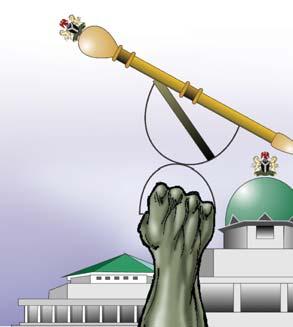




implementation and leadership accountability to for this misplaced nostalgia about the past. We can only conclude, as most people have, that the motivation is more about feeding the personal vanity of some powerful people than any genuine linguistic concerns about the current anthem.

Leading nations did not achieve the feats by a whimsical change of national anthems. Their development is a function of comprehensive policies, faithful implementation and leadership accountability to the people
SUNDAY NEWSPAPER
EDITOR DAVIDSON IRIEKPEN
DEPUTY EDITORS FESTUS AKANBI, EJIOFOR ALIKE
MANAGING DIRECTOR ENIOLA BELLO
DEPUTY MANAGING DIRECTOR ISRAEL IWEGBU
CHAIRMAN EDITORIAL BOARD OLUSEGUN ADENIYI
EDITOR NATION’S CAPITAL IYOBOSA UWUGIAREN
THE OMBUDSMAN KAYODE KOMOLAFE
THISDAY NEWSPAPERS LIMITED
EDITOR-IN-CHIEF/CHAIRMAN NDUKA OBAIGBENA
GROUP
EXECUTIVE DIRECTORS ENIOLA BELLO, KAYODE KOMOLAFE, ISRAEL IWEGBU, EMMANUEL EFENI
DIVISIONAL DIRECTORS SHAKA MOMODU, PETER IWEGBU, ANTHONY OGEDENGBE
DEPUTY DIVISIONAL DIRECTOR OJOGUN VICTOR DANBOYI
SNR. ASSOCIATE DIRECTOR ERIC OJEH
ASSOCIATE DIRECTOR PATRICK EIMIUHI
CONTROLLERS ABIMBOLA TAIWO, UCHENNA DIBIAGWU, NDUKA MOSERI
DIRECTOR, PRINTING PRODUCTION CHUKS ONWUDINJO
TO SEND EMAIL: first name.surname@thisdaylive.com
With angry citizens expressing their frustration about the daily hikes of staple foods, transportation costs, school fees, house rent and other inescapable the lawmakers have their job cut out for them in a nation blessed with enormous natural and human resources, but which has consistently been held down by poor governance at virt ually all levels. The obsession with the old anthem is therefore an indication of their lack of connection to the desperate crises threatening the nation. Ahmad Satomi, a lawmaker from Borno State and member of the ruling All Progressives Congress (APC) spoke for many Nigerians when he asked his colleagues whether changing the national anthem would solve the problem of hunger and general insecurity in the country. But his contribution, along with that of many members, was lost to the leadership of a National Assembly that is fast losing credibility.
At a period when Nigeria is marking 25 years of unbroken democracy amid serious socioeconomic challenges, we expect our federal lawmakers to be more serious than this. To the best of our knowledge, there is no compelling argument on the table so far against the current anthem. Besides, bringing back an anthem that was dumped 46 years ago in a nation in which 71 per cent of the population is under the age of 30 and life expectancy is 55 years means this idea can only appeal to members of a vanishing generation. If some people don’t like the way the current anthem sounds, we do not believe that their musical preference should be imposed on the rest of the country.
Letters in response to specific publications in THISDAY should be brief(150-200 words) and straight to the point. Interested readers may send such letters along with their contact details to opinion@thisdaylive.com. We also welcome comments and opinions on topical local, national and international issues provided they are well-written and should also not be longer than (950- 1000 words). They should be sent to opinion@thisdaylive. com along with the email address and phone numbers of the writer
Mr. Peter Obi’s return of schools to their rightful and original owners in 2011 was a commendable act that resonated with the people and drew accolades to him. However, he erred in that handover exercise by bypassing private school proprietors, who were victims of the seizure of schools by Ukpabi Asika in 1970.
But nothing can obviate the fact that Mr. Peter Obi’s civilian administration in Anambra State played a significant role in revamping Anambra State’s dysfunctional educational system. Being aware that education plays a big role in the development of a country, he carried out reforms in the state’s educational sector.
Among the people, who established schools in the eastern region (part of which is today’sAnambra State) were Chief M.C Awgu, the founder of New Bethel College, Onitsha and Basden College, Isulo; Chief Belonwu, founder and proprietor of Holy Cross College, Umuawulu; Sir P. E Chukwurah, founder of Our Lady’s High School, Onitsha; and countless others.
But unexpectedly, by twist of fate, the proprietors of private schools in what is today’s Anambra State lost the ownership of their schools in 1970. The government of Ukpabi Asika took possession of privately-owned schools and the mission ones in the east. But against the background that the Nigeria- Biafra civil war had just ended, and given the fact that it would be foolhardiness to take on government on the matter, the private schools’ proprietors kept their cool and let sleeping dogs lie.
But when Mr. Peter obi was the governor of Anambra State, and ordered the return of seized schools to their original owners, Anambra school system had suffered colossal damage. The schools were no longer centres of academic excellence. And most of the schools were beset with moral crisis what with teachers and parents aiding and abetting examination malpractice among the students during such examinations as SSCE and NECO. And the quality of education, which students in those schools received, was abysmally poor.
Then, as part of his efforts and plan to reposition schools in Anambra State, and redress the wrong, which was done in 1970 by the Ukpabi Asika led-government, Mr. Peter Obi, who was the Anambra State governor in 2011, returned 1040 schools to their rightful owners, the churches. It was a commendable and judicious deed as mission schools are not known to be lax regarding inculcating good morals into students and offering quality education to them.
The schools, which were returned to the Anglican and Catholic churches, were given the princely sum of N6 billion by Mr. Peter Obi for their maintenance. And Mr Willie Obiano, who succeeded Mr. Peter Obi as the governor of Anambra State, doled out N4 billion to the schools, which were returned to the churches.
And the current governor of Anambra State, Prof. Chukwuma Soludo, had given financial largesse to those schools to ensure that their culture of academic excellence and tempo of growth are sustained.
But there is a lacuna in this matter of Anambra State government’s return of seized schools to their original owners in 2011. Almost all the private schools founded by Anambra natives, which were appropriated by the East Central state government in 1970, are still in the possession of the Anambra State government. And, to make matters worse, compensations were not paid to those private schools’ proprietors. Is the Anambra State government’s continued ownership of those schools not a clear case of daylight theft? Is it not an inhumane, unjustifiable, unconscionable, and anti-democratic act? As what is sauce for the goose is sauce for the gander, the Anambra State government should handle the lingering matter of seized private schools in the same way it handled the matter of seized mission schools.
Chiedu Uche Okoye, Uruowulu-Obosi, Anambra State

The founder and CEO of Imperial Citizenship, Zaid Al Hindi, discovered his true calling in residency and citizenship by investment industry after his family migrated to Canada as Palestinian refugees. Over the past decade, Al Hindi has facilitated the acquisition of residency or citizenship by investment for over 2,000 clients. He tells Vanessa Obioha about his intention to extend the same assistance to Nigerian High Net Worth Individuals (HNWIs) following the recent opening of his office in Lagos.
You would never know that Zaid Al Hindi had barely slept when he came downstairs on a recent sunny afternoon. We were at the posh office of Imperial Citizenship in Ikoyi, Lagos. Dressed in trousers, polo and a blazer, he looked refreshingly composed despite having spent the previous night with his team at a party hosted by a friend celebrating their new office opening in Lagos.
As he sat thoughtfully on the sofa, a member of his team, Kamel Ayache, suggested a cup of coffee to help clear his head. Yet, despite the offer and the previous night’s festivities, no trace of fatigue was evident in Al Hindi’s demeanour as he observed the bustling activity around him. From the PR team organising the interview flow to his own team contributing ideas for the ongoing campaign of their new office opening, Al Hindi remained calm and focused, occasionally offering input or seeking clarifications.
When his coffee finally arrived in a cute little teacup, Al Hindi hardly took a sip. Yet, he remained as sharp as a knife throughout our conversation.
As a naturalized Canadian citizen, Al Hindi discovered his true calling in the residency and citizenship by investment industry after his family migrated to Canada as Palestinian refugees when he was just a young boy. He vividly remembered watching his father apply for citizenship, which sparked his own fascination with the process. This childhood intrigue later evolved into a passion for helping other families obtain second citizenship, a pursuit that he believes has profoundly transformed his life in ways he never imagined.
“It allowed me the freedom of mobility, to live in many countries that I never had the opportunity to do before,” he said. “I liked how it changed my life. And I wanted to get into the industry that helps a lot of people change their lives as well and this is what we’ve been doing, helping a lot of families achieve second residency, citizenship, for mobility reasons, for security, for even having better job opportunities.”
Also known as economic citizenship, CBI is a process where foreign nationals can gain citizenship of a country in exchange for making significant financial contributions to its economy. This is used by many countries to attract investments and boost economic growth. These investments often involve substantial financial contributions in areas like real estate, business ventures, or government bonds. In return, investors are granted full citizenship, which may include benefits like visa-free travel, business opportunities, and tax advantages.
Over the years, Al Hindi gathered experience in the Residency and Citizenship by Investment (CBI) Industry, working with companies that offer CBI such as Henley & Partners where he served as a citizenship investment advisor, and Passport Legacy where he served as a partner. In 2021, he founded Imperial Citizenship, a Canadian-managed firm registered in Dubai, United Arab Emirates, specialized in helping investors obtain a second citizenship or residency through the means of investments. He has so far helped over 2,000 families acquire residency or citizenship by investment.
“We work with 14 different countries that offer either legal residency or citizenship,” he said.
Imperial Citizenship offers investors CBI services in the Caribbean, South Pacific and Europe. They also assist investors to obtain residency in the UAE, Greece, Portugal and Malta.
In the Caribbean, they work with St. Kitts, Dominica, Antigua and Barbuda, Grenada as well as St. Lucia, all of which offer direct CBI.
“That means you can make a contribution to the National Development Fund of that country or you can invest in the tourism sector, to invest basically in five-star resorts that are approved by the government.”
In Europe, he said, there are other CBI programmes such as real estate investment where one can buy property in the country and get a golden visa.
“We have that also in Dubai, the United Arab Emirates. Portugal actually stopped that right now but they have it through a fund investment. You have Spain where with 500,000 Euros, you can buy a property and you get to vote on these also, which means you get to European residency without the need to live there. And Greece also has this option as well, in terms of residency.”
CBI has often fetched criticisms over the commodification of citizenship and the creation
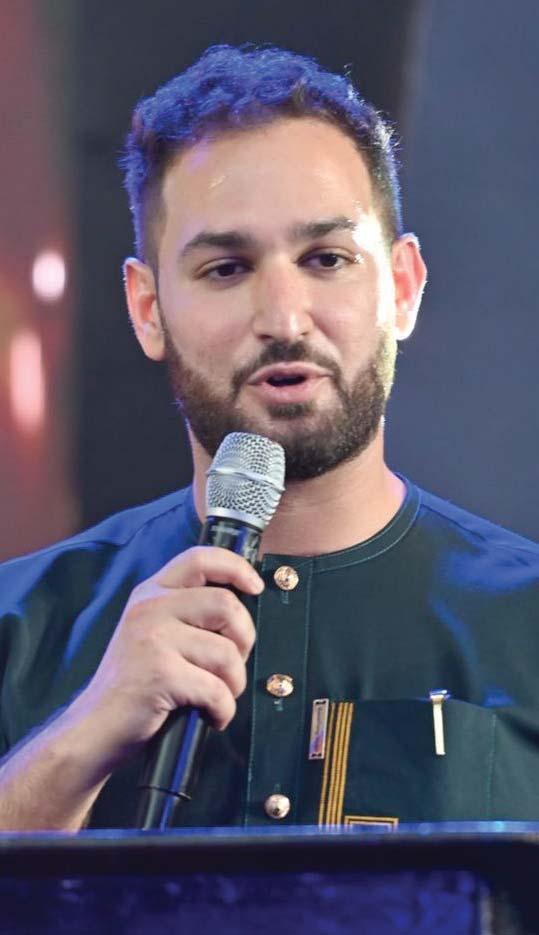
of wealth inequality. Al Hindi however has a different opinion.
“There’s a lot of different angles you can think about this. These programmes are designed to bring foreign investments to their country. They not only help people get citizenship but also help the citizens of the countries that have designed these programmes. There are a lot of infrastructure projects that are being created in these countries such as hotel projects to improve the tourism of the country which in turn improves every sector and creates more job opportunities for the people. A lot of hospitals have been built because of these programmes, so the citizens are actually taking advantage of what these programmes bring to their country, and how they are improving the infrastructure and the economy as well.”
Another concern regarding CBI is the potential for individuals with criminal backgrounds or tax evasion history to exploit it as a means to evade justice in their home country. Al Hindi stressed that compliance is very key in their industry. Therefore, they ensure a transparent process by conducting thorough background checks to verify the legitimacy of funds and to ensure applicants have no past or present criminal records.
Yet, the benefits of CBI far outweigh the downsides.
“It is mainly for security, you know, having a second identity. As I told you, I was born in Syria. I’m from Palestinian origins. Sometimes even opening a
We’ve changed a lot of family’s lives. I have messages from their children, and their families, thanking us for the opportunity and the professionalism of how we got them from A to Z. I think for everyone in our company that’s the most enjoyment we get and we are dedicated to giving more families this opportunity,”
Kong. So it really depends on the family and what they’re looking to achieve.”
For its Nigerian clients, Al Hindi hopes to offer opportunities to get second citizenship in the countries they work with without the need to relocate.
“This is going to improve the Nigerian economy because it gives them more opportunities to travel, source different products and expand their businesses globally, while still living in Nigeria. A lot of the investors that we work with would like to stay and continue their businesses in Nigeria. They don’t have the luxury of packing their bags, relocating for six years to another country and leaving their businesses alone. So this gives them the opportunity to still get what they want while remaining and conducting their business in Nigeria.”
For Al Hindi, people are becoming more aware of global mobility, “and that’s because they want to be free,” he said.
bank account becomes very difficult. This is my second lifeline,” he said, citing the ease of opening a bank account as a Canadian citizen compared to using Syrian identification documents.
Beyond security, mobility and job opportunities, Al Hindi views second citizenship as an investment in future generations.
Recently, Al Hindi opened his new office in Lagos, targeting Nigeria’s high-networth individuals. The event drew wellheeled guests from different sectors of the economy including the Lagos State House of Assembly member representing Lagos Island 1, Hon. Lara Oyekan Olumegbon; Lagos State Commissioner for Tourism, Arts and Culture, Mrs. Toke Benson; Chief Executive Officer, Grenada CBI Unit, Thomas Anthony; Founder and Chairman of Gibraltar Construction Nigeria, Sir Olu Okeowo, among others.
The decision to expand to Africa through Nigeria, according to Al Hindi was fuelled by the data from the CBI industry that shows that over 30 per cent of the applications received were from Nigeria.
“It shows you that there is a very big demand. There are a lot of business people that need second citizenship for mobility. There have been a lot of applications for Schengen and the UK that have been rejected. This gives them the opportunity to actually travel and conduct their business without any limitations. They’re able to travel to the UK and within the Schengen zone. Some countries even offer visa-free to China, Singapore, and Hong
“Freedom is the cost that everyone is looking for. They want to be able to get a second citizenship to travel and expand their business. It’s very important. Before, it used to be a want but now it’s a necessity. You need to be able to travel wherever you want, open bank accounts with ease and not be restricted by the nationality or the country that you were born in.”
As a leader in CBI, Al Hindi has travelled to most countries in the world, and as such sees travel as an opportunity to learn different cultures. For instance, he has been coming to Nigeria since 2014 and even learnt a few pidgin expressions such as ‘how far.’ He has also been to local markets such as the Mushin market — despite objections from loved ones — just to know more about the people.
“I’m the kind of guy that likes to do things myself,’’ he said.
Through his interactions with Nigerians, Al Hindi has come to see Nigeria as a country of friendly people.
“They’re welcoming. When you meet with a Nigerian business prospect, the beginning of the conversation is very serious but at the end, we are laughing and joking. We feel like we’re family. I have a lot of Nigerian friends that I consider family. They invite us to their house and they come visit me in Dubai sometimes as well. I think the people of Nigeria are really really amazing. Very hardworking and dedicated as well.” To date, nothing beats the feeling of handing families their citizenship certificates for Al Hindi. It is simply overwhelming and thrilling akin to purchasing a new car or a new house.
“We’ve changed a lot of family’s lives. I have messages from their children, and their families, thanking us for the opportunity and the professionalism of how we got them from A to Z. I think for everyone in our company that’s the most enjoyment we get and we are dedicated to giving more families this opportunity,” he said.
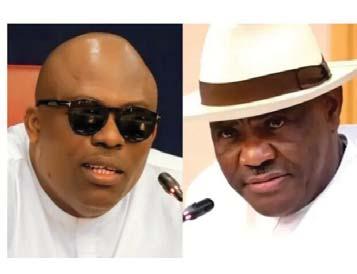
When elephants lock tusks in a grim encounter, neither the grass beneath their feet nor the cubs behind their seeming immovableness can escape the thuds of their repeated collisions. This is the case for Rivers State which is currently embroiled in a bitter political power struggle between Governor Nyesom Wike and his successor, Siminialayi Fubara. This escalating war of words and actions threatens to destabilise the state and derail progress.
The animosity appears deeply rooted. Wike, currently the Minister of the Federal Capital Territory (FCT), faces accusations of bullying from Fubara, who himself is under fire for questionable actions during his tenure. Both men seem more interested in settling personal scores than working for the benefit of the state, as many wellintentioned commentators have angrily pointed out.
At first glance, the problem seems to be Fubara’s legitimacy, which is clouded by allegations of circumventing legislative processes and questionable financial practices. But a second glance would inform the observer that his decision to demolish the state parliament building further does not add any pluses to his oath to uphold democratic principles.
Wike, on the other hand, is accused of heavy-handed tactics and intolerance of dissent. Critics argue that his attempts to influence the political landscape through manoeuvres like blocking investigations into his own administration reeked of hypocrisy.
Ultimately, the constant barrage of accusations and counter-accusations seems like a distraction from the real issues facing Rivers State. Don’t citizens deserve better than a political spectacle fueled by vengeance and self-preservation?
A spirit of compromise is desperately needed. Both sides must step back from the brink, acknowledge their mistakes, and prioritise the well-being of the state. Delaying this reconciliation will only lead to further chaos and hinder progress which, some argue, has had its wheels removed since Fubara arrived on the scene, thanks to the drama with Wike and his loyalists.
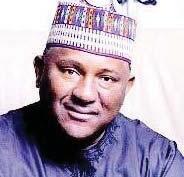
with KAYODE ALFRED 08116759807, E-mail: kayflex2@yahoo.com
...Amazing lifestyles of Nigeria’s rich and famous
The apple should never fall far from the tree. This wisdom rings true as Governor Seyi Makinde of Oyo State celebrates his daughter, Tobi Makinde, who recently graduated from Yale University, Connecticut, USA. The ceremony was filled with joy and pride as Tobi donned the same multicoloured robe of excellence her father wore, symbolising a legacy of achievement and dedication.
Governor Makinde, known for his transformative leadership in Oyo State, took to social media to congratulate Tobi on her significant accomplishment. He praised her hard work and perseverance, noting, “Congratulations, my darling Tobi, on your graduation from Yale University. Your hard work and diligence paid off. Wishing you all the best as you embark on a new chapter of your
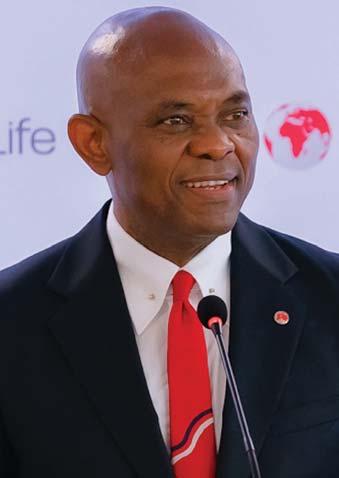
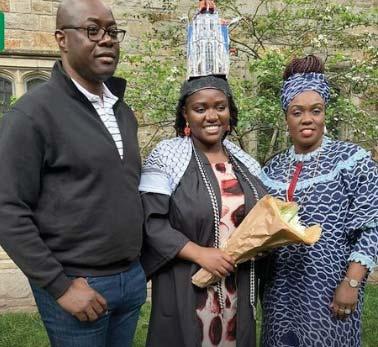
has garnered immense respect and admiration from the people of Oyo. His tenure is marked by numerous achievements that have positively impacted the state. From the prompt payment of salaries and pensions to the improvement of health facilities, infrastructure development, and educational transformation, his governance style is both empathetic and innovative.
Tobi’s graduation from Yale is a testament to the values of diligence and excellence that Governor Makinde embodies and has instilled in his family. With such a distinguished background, the expectations for Tobi are understandably high. As she steps into her future, she carries forward not only her academic achievements but also the legacy of her father’s exemplary leadership and commitment to societal betterment.
The tiger in the heartbeat of the jungle is still a ferocious monarch when strolling on marble tiles. Tony Elumelu is just like this. This visionary chairman of United Bank of Africa (UBA), recently aced a strategic meeting with Sheikh Mohammed bin Zayed Al Nahyan, President of the United Arab Emirates (UAE) and titan of global economics, in Abu Dhabi. But it wasn’t just a visit; it was a testament to Elumelu’s genius for forging partnerships that could transform Nigeria’s economic landscape.
The meeting at the Abu Dhabi Health Leaders Forum became a platform for Elumelu’s brilliance. He impressed Sheikh Mohammed with his ingenious solutions for Africa’s economic progress, leveraging his renown for innovation in banking and philanthropy. Sheikh Mohammed, recognizing Elumelu’s exceptional mind, expressed a desire for stronger economic ties with Africa.
Elumelu, never one to rest, unveiled
Blood is thicker than water. This statement has been declared many times, and so has grown a bit stale. Nevertheless, it is no less true today than it was in the past. When considering the relationships between some of the most prominent individuals to ever emerge from Nigeria, the statement proves itself correct. Consider the case of Oba Sikiru Adetona, the Awujale of Ijebuland, and his good friend and loyalist, Dr. Mike Adenuga, the Chairman of Globacom.
The wisdom of Oba Adetona is as rich as the history he embodies. His reign began in 1960, marking the start of one of Nigeria’s longest and most illustrious tenures. Throughout his journey, from prestigious schools to the Western Region House of Chiefs, he has exemplified dedication and service.
But a defining moment arrived when his telecom tycoon brother and friend , Adenuga, faced adversity in the form of the displeasure of former President Olusegun Obasanjo. Oba Adetona, fearless in the face of hardship, stood as a champion of justice and loyalty.
His intervention, fueled by ancestral wisdom, defied powerful forces and preserved their enduring kinship, resolving the matter.
This act cemented Oba Adetona’s reputation as a leader who transcends simple delegated authority. His unwavering integrity and commitment to his friends earned him universal respect, making his contributions to Nigeria and humanity more undeniable.
It is not weird that Adenuga, another prominent Ijebu indigene, by the way, echoes this sentiment. In times past, he described Oba Adetona as a man of distinction, determined to elevate Ijebuland and dedicated to his people. But Adenuga knows what he is talking about, seeing as he has experienced the boon of the monarch’s exemplary leadership and unwavering commitment. Dr Mike Adenuga, is one Ijebu man the Awujale loves so much. That his company has been sponsoring the prestigious Ojude Oba festival of the Ijebu people for so many years now . Adenuga is currently a member of the Council of the Awujale ‘s Otunbas of Ijebuland . He’s the Otunba Apesin of Ijebuland .
ambitious plans for the future. He passionately advocated for leveraging technology to bridge the gap in Africa, proposing ingenious methods to bring financial inclusion and essential healthcare services to the underbanked populations. His ideas resonated deeply with the UAE’s business community.
The informed reader would recognise that the potential benefits of this meeting transcend mere financial gain. A UAE partnership, born from Elumelu’s strategic brilliance, would bolster confidence in Nigeria’s financial sector as a whole. Back home in Nigeria, there’s already a wave of optimism about the potential for improved banking infrastructure and economic empowerment.
Actually, with Elumelu’s trip in view, Nigeria’s future just got several thousand lumens brighter, ignited by his genius for bringing powerful people together. This collaboration, orchestrated by Elumelu’s brilliance, paves the way for a new era in Africa’s financial system.
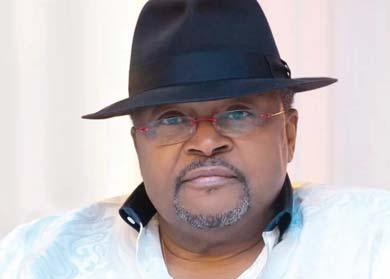
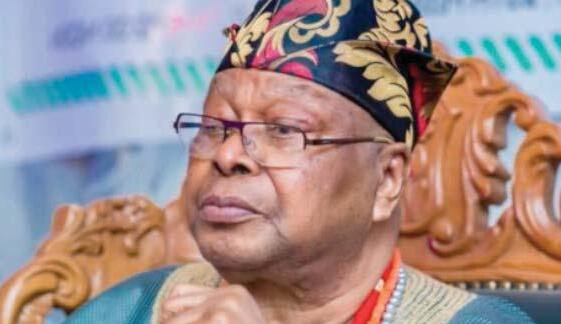
On Friday, May 17, billionaire businessman AbdulSamad Rabiu took a break from his thriving business ventures to attend his son, Khalifa AbdulSamad Rabiu’s graduation ceremony at Georgetown University in Washington, DC. The event was marked by proud moments, as Rabiu and his other children cheered for the McDonough class of 2024, highlighting Rabiu’s dedication to fatherhood alongside his business acumen.
Rabiu, the Chairman of BUA Group, is renowned for his investment prowess and philanthropic endeavours. Unlike many billionaires
who are often perceived as detached from their families due to their financial pursuits, Rabiu embraces his role as a father with pride and commitment. He actively participates in his children’s lives, ensuring he is present for significant milestones and everyday moments alike.
Indeed, Rabiu’s commitment to his family is evident in the way he balances his professional success with his responsibilities as a parent. He celebrates his children’s achievements and supports them through their challenges, embodying the belief that true fatherhood requires unwavering involvement, regardless of circumstances.
It is no wonder that despite his vast wealth and status as one of the richest black men
globally, Rabiu’s children lead modest lives, demonstrating res pect and decency rather than indulging in the ostentatious lifestyles often associated with billionaire offspring.
Ultimately, Rabiu’s presence at Khalifa’s graduation epitomises the essence of leadership, both in the boardroom and at home. It demonstrates the transformative power of familial bonds and the enduring legacy of a father’s unwav ering support. This is why Rabiu will continue to leave his mark on the business world and beyond, with his commitment to family serving as a timeless reminder of the true measure of success.

is a champion of social justice and a tireless advocate for education and empowerment.
Born into privilege as the daughter of the late billionaire Captain Idahosa Wells Okunbo, the queen could have easily lived a life of luxury. Her impressive academic background, with a law degree from the London School of Economics, could have paved the way for a prestigious legal career. Yet, her entrepreneurial spirit led her to co-found a fashion label and a breakfast delivery company, demonstrating her multifaceted talents
The queen’s true passion lies in service. How many programmes bear her marks? There is the Abba’s Jewels initiative, through which she empowers over 60 women to raise funds for community outreach programmes. There is also the Wuwu Ore initiative, established in 2021, which provides free healthcare, education, and skills training for underprivileged children while offering empowering programmes for women and youth.
than just royalty, the queen
Clearly, education is a cornerstone of the queen’s vision for a better future. Whether it is
the Captain Idahosa Wells Okunbo STEM and Innovation Lab, or the Royal Iwere Foundation, the queen’s philanthropic endeavours are as brilliant as her husband’s, Ogiame Atuwatse III.
Expectedly, Olori Atuwatse’s dedication has not gone unnoticed. Her numerous accolades include an appointment to the High Level Advisory Committee on Women Economic Empowerment and Gender in Nigeria by former President Muhammadu Buhari. Her remarkable societal impact was further recognised by the Delta State Government when she was appointed to the Governor-elect’s transition committee.
Thus, as the queen celebrates another year, her legacy of compassion and empowerment shines brightly. She is a true role model, a queen who uses her position and resources to uplift others and create a more just and equitable society. Her unwavering spirit and dedication to service inspire all and sundry.
Olugbenga Agboola’s story is a classic startup dream. In 2016, he co-founded Flutterwave, a Nigerian fintech giant that revolutionised African payments and became a global player. However, the relentless pursuit of success can be a double-edged sword, and Agboola’s journey is not without its complexities.
Flutterwave’s remarkable rise coincides with a series of security concerns that raise questions about its ability to safeguard client funds. In April 2024, reports alleged a staggering N11 billion ($7.25 million) loss due to a security breach. The company vehemently denied these claims, stating they stopped suspicious activity before any theft. This echoes a similar incident in March 2023, where they refuted accusations of a N2.9 billion ($6.3 million) hack.
Earlier this year, a court order mandated Flutterwave recover N19 billion ($12.5 million) lost in unauthorised transactions. The company attributed this to a technical glitch, but the string of incidents is concerning.
So, why might Agboola be so adamant about
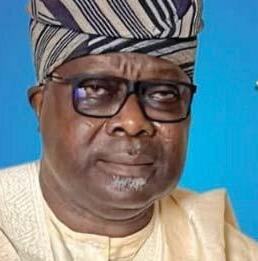
Wahala is when someone has laboured to enter into a position of prestige a “Adversity does not build character; it reveals it.” This saying aptly describes Senator Iyiola Omisore’s political journey. Omisore, a stalwart of the All Progressives Congress (APC) in Osun State, played a
denying any financial losses? It could be because he wants to maintain investor confidence. After all, admitting a security breach could erode confidence, jeopardising future funding and hindering expansion plans.
It could also be that Agboola wants to protect his and Flutterwave’s reputation. Logic states that a public admission of a major breach could damage the company’s good name, deterring potential clients, and hindering its competitive edge.
Actually, Agboola’s ambition is one of the pillars behind Flutterwave’s success. However, the relentless pursuit of financial goals can sometimes blur the lines of ethical conduct, as critics have noted. Thus, while Agboola and Flutterwave continue to deny any wrongdoing, reassuring public confidence requires not just a denial, but a clear explanation of the incidents and a commitment to robust security protocols.
Agboola’s present circumstances with Flutterwave must serve as a lesson to all in business. Let it be known, as previous industry leaders have shown, that true and sustainable
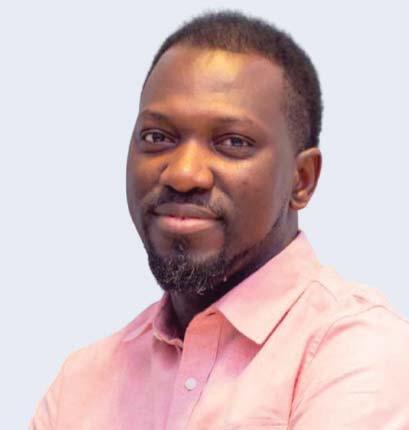
success can only be achieved when influential individuals like Agboola value public trust by striking a balance between achieving financial success and maintaining ethical business practices.
crucial role in strengthening the party, only to be unceremoniously ousted. Now, it is rumoured that he is determined to restore order and integrity within the party.
Despite facing allegations and criticisms, Omisore’s contributions to the APC’s emergence and growth in Osun are undeniable. As a dedicated party member, he significantly bolstered the APC’s influence and organisational structure, ensuring its competitiveness in the political landscape.
Indeed, Omisore’s leadership was pivotal in mobilising support and consolidating the party’s position in Osun. It wasn’t only his efforts that were instrumental in driving grassroots campaigns and securing electoral victories; it was also his strategic acumen and ability to foster unity among diverse party factions that strengthened the APC’s foundation and paved the way for its successes.
The turbulence within the APC, leading to Omisore’s resignation, is believed to be fraught with misinformation. Critics are
Mele Kyari, the Group MD of the Nigerian National Petroleum Corporation Limited (NNPCL), continues to show himself as a transformative figure in the Nigerian energy sector. Since taking the helm at a time when the NNPC was riddled with inefficiency and a lack of transparency, Kyari has spearheaded a series of bold initiatives that are putting things right.
One of Kyari’s key priorities has been to revitalise Nigeria’s moribund refining capacity. Years of neglect had left refineries in a state of disrepair, forcing the nation to rely heavily on imported fuel. Kyari initiated the rehabilitation of crucial refineries like Port Harcourt, Warri, and Kaduna, aiming to significantly reduce fuel imports, saving billions for the government, and reasonably stabilising fuel prices for Nigerians.
Also, critics have commented that NNPC was formerly notorious for its lack of transparency. Then Kyari came on board and made a clean break from the past by implementing a culture of openness,
publishing monthly financial and operational reports and shedding light on the organisation’s revenue, expenditure, and production figures.
What about how Kyari recognises the importance of natural gas as a cleaner and more sustainable alternative to fossil fuels? He has spearheaded a drive to increase domestic gas utilisation, diversifying the nation’s energy mix and reducing its carbon footprint. How else did Nigeria gain its position as Africa’s largest Liquefied Natural Gas (LNG) producer?
Indeed, Kyari’s path hasn’t been without hurdles, facing detractors and navigating a complex industry. The current issue with oil output decline is an ugly gash on his accomplishments. However, Kyari’s unwavering commitment to excellence could see him overcome these challenges, as he has done in the past. After all, the NNPC, under his guidance, is now a more respected and globally competitive organisation.
All in all, Kyari’s story in NNPCL is one of visionary leadership and unwavering
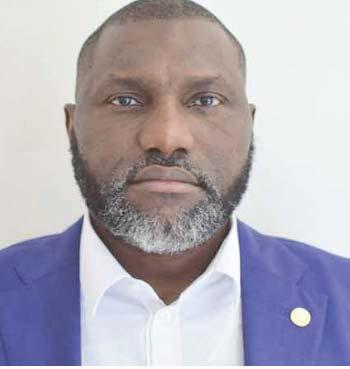
Great times are ahead for the Ship Owners Association of Nigeria (SOAN). This is because Dr. Louis Ekere, the Group Chairman and CEO of Homeland Integrated Offshore Services Limited and Welled Healthcare Limited, has been inducted as the Vice President of the association’s New Executive Council (NEC).
The induction ceremony that saw Ekere rise to be SOAN’s VP was held on April 19, 2024, at the Oriental Hotel in Lekki, Lagos.
Attended by key figures from Nigeria’s maritime sector, it was a recognition of Ekere’s significant contributions to the maritime industry, especially his notable achievements in marine security, offshore construction, and technical manpower services.
alleged to have propagated misleading narratives, even though Omisore eventually stepped down voluntarily, prioritising the party’s stability over personal ambition.
In the face of these challenges, Omisore’s rumoured resolve to restore order within the APC is intriguing. Allegedly, he aims to address the party’s structural deficiencies, promote accountability, and ensure adherence to democratic principles. His vision for the APC is one of inclusivity, where every member’s voice is heard, and decisions are made collectively for the party’s progress.
With Omisore embarking on this speculated mission, expectations are high. With his return, if it is true, the APC in Osun may get a renewed chance at transparency, unity, and strategic growth. And if that happens, the party may be able to look forward to a period of reform and revitalization under Omisore’s guidance.
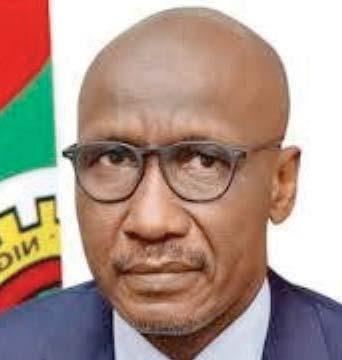
commitment to reform. Given enough time, commentators say that his legacy will shape Nigeria’s energy sector for years to come and inspire future generations to build upon his remarkable achievements.
Ekere’s qualifications are extensive. He holds an MBA from Lagos State University and has completed advanced courses at Harvard Business School, IESE Business School, and Lagos Business School. His innovative and proactive approach to problem-solving has established him as a leader in the maritime sector.
Beyond his professional achievements, Ekere is known for his philanthropic efforts. He has organised free medical testing and outreach programs, offering high-end medical services to indigent patients and supporting educational opportunities for community members.
These initiatives reflect his commitment to social responsibility and community development.
As the new Vice President of SOAN, Ekere is expected to bring his wealth of experience and strategic vision to the organisation. In his previous role as Chairman of the Ethics and Privileges Committee, he demonstrated his ability to navigate complex issues and foster collaboration within the maritime sector, so his colleagues are confident that he will hit greater milestones now.
By every indication, Ekere’s induction as SOAN VP serves as evidence of his exceptional leadership, qualifications, and dedication to the maritime industry. His visionary approach positions him as a transformative leader poised to advance SOAN and the broader maritime community.
It was bound to happen. I had suspected when I had reached out to him to inform him that the media campaign for The Dukes Economic summit was about to break and he asked me to be very subtle about his involvement.
Khalifa’ s removal was one of those things that shook the very fabrics of our land. For an ancient and well-regarded heritage to be sacrificed on the altar of selfish politics really left much to be desired.
The then government was very clear in its decision to abuse its authority due to Khalifa’s insistence on certain reforms. His stance on many issues didn’t sit well with that government and to get their own back, they did the unthinkable.
They decimated the emirate, balkanised it into four and created new Emirs while taking advantage of the divisions
Given the hardship in this country, the new trend now is that, when someone is hungry, they will ask for a meeting at a restaurant so that you feed them. Anyways, that was how they asked me to meet them in this fancy restaurant in Lekki. The man is richer than I am o, by far but na me dey find something abi. So, I landed at the place. Very beautiful place with exceptionally good-looking waitresses.
I ordered chicken wings, he ordered one bowl of rice; I took my bottle of coke and he took one glass of cocktail. I counted my chicken pieces to make sure it was a complete six.
Then the bill came, I was not with my reading glasses so I could not see the total and I asked the very beautiful waitress who had put her breast between me and the bill to read out the figure as I flashed my Access Bank debit card.
My people, what I heard almost made me mad. The girl said, N106,000. I screamed. You know me I don’t have shame, I screamed o. The mumu people who were in the restaurant being defrauded like me, looked up and were doing like I was the poorest man in Babylon. I knew some and I could swear that I was richer than them, but because

within the royal family.
Emir Sanusi took the decision with stoic calmness. I remember sitting with him in his Victoria Island residence a few days after the dethronement and his philosophical disposition and calmness which amazed the large crowd that came to stand with him.
That night, he talked about his unflinching stance on some of those issues that put him at loggerheads with the government and his resolve to remain unbowed and possibly go to his grave without recanting.
Khalifa is indeed a man of destiny as he has been vindicated in his lifetime and within such a short time.
His recall has been met with wild jubilation signposting his huge popularity and wide acceptance. It’s however quite instructive that I just left him a few days ago in
they were with babes, they pretended like I was a nuisance.
I asked for the manager o. Please what did I eat that is N106,000? He started citing the usual suspects – diesel, cost of foodstuff, replacement cost, dollar rate, etc.
I abused him and his owner, abused Tinubu, abused Awolowo, abused every and anybody I could think of because this was just outright theft masking under “harsh economic” times.
I paid o and walked out of the restaurant in anger, leaving my client alone and driving off. Just as I descended the Third Mainland Bridge, the debit alert hit and my balance of N2,345 faced me.
I cursed again and went straight home to my bed.
GENERAL RICHARD DURU: A VERY SAD SONG
For those of you who do not know, General Duru is the Nigerian Army officer who was kidnapped in Imo State over six months ago. Since his abduction, there has been radio silence from his constituency and authorities. But last week, the radio cackled and spewed “crap.” The police in Imo State reportedly announced that its “gallant” officers had apprehended the kidnappers who had sadly killed
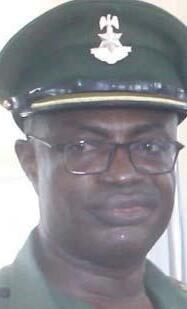
London where he had come to speak at my economic summit and I sha noticed that there was a mischievous look in his eyes, like he was hiding something.
I wanted to ask him and say, ‘ Khalifa this one that you are bouncing, is there something you want to tell me?’ But thought ot herwise since he was with his very beautiful daughter and aides. My own is that I want to thank the Executive Governor of Kano State for not making the announcement last week, because he for scatter my summit o. I’m so grateful that he waited for us to finish the summit before making the announcement. This is what in Shomolu we call ‘Governor wey sabi.’
Please where are they selling the Asoebi o, because this one is not a small celebration. Long live the 14th Emir of Kano.
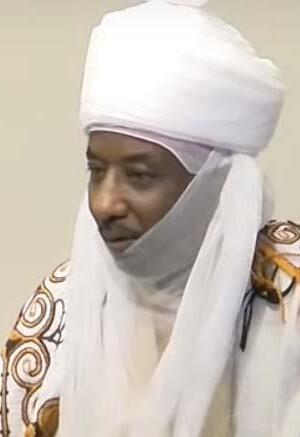
General Duru. The report also went ahead to tell us that the “gallant” officers were able to trace his car to a buyer and seller in Lagos and from there the “dragnet” moved very swiftly to apprehend the whole gang.
In the same report, the police congratulated themselves for doing a fine job on the matter even though the General had been “killed.”
As expected, the public uproar was deafening. People screamed how can such an illustrious Army General be picked just like a chicken and really nothing was done about it except some not-so-well-written press releases once in a while.
Then like thunder from the blue, another report emerged from the authorities refuting the first and issuing helplines to the public to assist in the investigations. They assured us that the General was still alive despite the first report.
See, the public knows for a fact that the Army authorities have not done enough on this matter. They can hide under “security” by not carrying the public along, but we all know as sure as day, that truly this Duru matter is not looking like a priority to his constituency.
Even his immediate family has been pushed off. I know for a fact that the
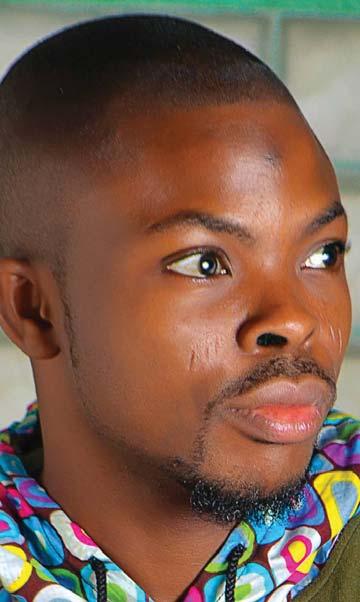
woman has not been able to meet any officer of substance both at the Army and at the Imo State government level who were the ones that dragged him to Owerri in the first place.
General Duru served with no blemish, he gave Nigeria his all, he cannot die like a drunk struck with leprosy. We cannot allow him to be infested by vermin and treated like a bastard. It will remain our eternal shame if we cannot resolve this.
Alive or dead, Major General Duru must be treated with great dignity. He was a Nigerian Army General for God’s sake.
EMDEE TIAMIYU: A CONTROVERSIAL EXIT
I have mixed feelings about this issue. But let me rehash the story, especially for those of us who are not aware.
This young Nigerian went on a BBC interview to state very candidly that Nigerians hid under the cover of student visa to rush into the UK with their families in a bid to escape the harsh reality of life in Nigeria. Not long after, the British authorities released a policy which banned students except those doing a PhD from coming into the UK with their families. This led to a massive uproar within the community and serial backlash against this “squealer.”
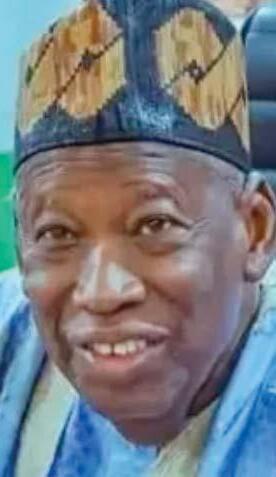
This made him apply for asylum and was immediately awarded a reported sum of 160,000 GBP with which he quickly rushed to his native Ogun State to start building a mansion. He was outed, arrested and finally deported. Now my take: Anybody rushing to the UK or any other country outside of genuine health and educational purposes is a joker. Yes, I have said it. I have spent the last two weeks in the UK for my play ‘AWO-UK’ and I must tell you that what I have witnessed with the lives of Nigerians living there is, to say the least not very impressive. So jumping on any bandwagon with your families to live in matchbox houses, ride the train and dress like South African miners all over the place is not something I will strive to do. Nigeria is a land of opportunity. Only cowards run at tough times. There are more opportunities in Nigeria than in the UK for Nigerians. Even the so-called corruption and inefficient system, can even be used to an advantage like so many people have done. Embarrassing yourselves like this young man and the hordes who have done what he was alleged to have said or rushed to the UK or any other country as economic refugees, na una sabi o.
Me, I am here, make my money, come to that your UK, eat in restaurants you won’t dare to eat in, shop in shops you won’t dare to shop, and when I am through, I will go back to my Nigeria and make my money and come back to taunt you. Be disgracing yourselves over there and saying you are chasing the almighty pounds instead of coming back home and contributing your own quota in changing the system.
Lastly, let me state it here very clearly – anybody above 40 who japa is a fool. Yes, I have said it, come and beat me. Msheww.
LET GANDUJE JUST CALM DOWN
Just about one year in a very tepid administration, this one is already talking about second term. Which second term when you are still struggling with understanding the enormity of the situation you find yourself in?
No wonder, when I heard of that humongous amount reportedly spent on hajj, I just called my neighbour and said, “That is them wanting to buy a second term.” It’s about one year and things are worse than the very clueless Buhari administration. All indices are facing south and the level at which Nigerians now operate is almost at the level of peasantry.
The middle class has been wiped out, and apart from the resurfacing of the Third Mainland Bridge and the hugely controversial Lagos-Calabar road, no meaningful infrastructural development has been recorded. Corruption is at its ingest ever, the government has not been able to curb its expenditure, no real international breakthrough, a cabinet with no real champion and a President who although understands the politics therein has not been able to come to grasp with governance and this one is already screaming second term. Abeg, oga calm down. It’s people like you who are causing confusion and trying to distract our president.
President Tinubu, please ignore all these ones, concentrate on governance and let the economy do well and you will see the second term fall on your laps. Ignore Ganduje. Thank you.
NLC, FG’S WAR OF THE ROSES
I have already concluded that these two people are just “using our heads.” Abi, how do you explain the number of times NLC has called for strike since this administration and how many times it was aborted? If you ask me, they are planning these things together. Me as a person, I have lost faith in NLC since. Let me tell you why. NLC represents about 16% of the total workforce, meaning that their influence has waned.
Even the jailed Bobrisky has more influence than them today. They do not represent the Nigerian workforce, they know. The federal government knows and I know.
Now the federal government needs them to be shouting so that it will look like there is opposition since PDP has been captured and rendered ineffective by Wike – story for another day.
NLC on their part also needs all this noise to maintain a semblance of relevance which they have lost and this
is why their President will run from pillar to post just to generally disturb the system. From being beaten up in Imo to going to fight the Labour Party and now minimum wage, the man is just running around aimlessly. Asking for N600,000 as minimum wage is a clear case of either not understanding basic economic principles and the paucity of government revenues and very importantly, the massive impact of that on inflation on the part of the NLC,
All I see is a phenomenally beautiful woman and that is all. The sector which she presides over is “just there.”
No real policy direction, no real injection in its arm, just wallowing in the smooth nothingness that is its beauty. The risk that this tenure will just come and pass without any major impact is dawning on us very succinctly. All I see Madam do is attend some funny events, deliver beautiful speeches and enter her car and drive away. No real engagement, no major industry-wide push that would provide enough support for serious players to play.
Let me be very clear as to my position. I do not believe in the government’s direct involvement in the space. I do not, like my colleagues, wait or pray for direct government funding but for me, the government must be a
very strong partner in policy initiation, guidelines and support as we try to grow the space.
These things are what I am yet to see in the present ministerial position of dear madam. Surrounding oneself with “aged” practitioners will not do the trick as they will come at you with fecund ideas and with a cry of “no budget” in delivering on projects within the sector.
Madam Minister, you must begin to push for a private sector lead ership of the space; you must also step back while providing ample support in the areas of access, and guarantees in the pursuit of resources within the sector.
There is not much space to write about my suggestions but let me just clearly state that the sector needs much more than a very beautiful lipstick-laced smile. We need purposeful leadership. Thank you.
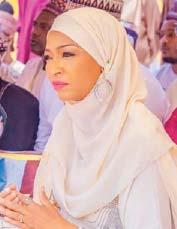
while on the federal government side, you are saying you cannot afford the minimum wage but you are spending billions on Hajj for example and carrying along as if Nigeria is richer than Qatar and you expect the NLC nay Nigerians will take you seriously? So, if I make a request of N600,000 and someone is offering me N56,000 what will that tell me? If NLC cannot see that they are now just a comedy troupe then that is on them.
I think the NLC should clear out or be restructured to reflect the current dynamics of the Nigerian workforce. Let me even help them small – My brother Joe, workforce dynamics have moved from the petroleum tanker drivers, textile workers, health workers and Railway workers amongst others that make up your membership and which held the economy in the ‘80s through the ‘90s to the new economy driven by media, technology, services etc and as such we have a younger work population who carry more weight and are borderless, with a vision far different from yours. Do you honestly think you represent these ones?
Flutterwave for example, has 1,000 workers, and Piggy Bank has about that and more, do you honestly really think you represent the new labour?
Please just go and sit down abeg, let’s hear word. And for you federal government, if you also want to be taken seriously on this minimum wage issue, then restructure your expenditure, reform the civil service, reduce the cost of governance and much more importantly, run a prudent and frugal administration. Thank you.
SEUN ODUWOLE: THE MAN AND THE MUSEUM
If you drive through Onikan, directly opposite the National Museum, you will see a beautiful brown structure with a green grass roof. The imposing structure has changed the layout of the environment which boasts the MUSON Centre, the ECOWAS headquarters and also the Lagos Island Club.
I met Seun in London. He is the architect of the project that is funded by the Lagos State Government, I suppose. This project is the very first Museum built by Nigerians ground-up and with the very best in technology and top-notch design that has brought the preservation of our rare artefacts to another level.
Already, the museum houses some rare and almost priceless artefacts dating back centuries. Seun and his team have built a profound archival prototype that houses our history as a people and personally, I cannot wait for its doors to be opened. I hear there have been enquiries from as far afield as Cuba, America and Brazil from tourists and enthusiasts willing to visit. My brother, why are we not opened yet o, or should I be directing my enquiries to the Lagos State Government? Well done!
TOPE FASORANTI: A BELATED HAILING
My Oga recently retired as an Executive Director at Zenith Bank and I did not have the time to send him a congratulatory piece. Dr. Fasoranti remains a main pillar in the banking sector, one of the pillars of the new wave of banking which has embraced technology, driving impact and penetration much more than ever before.
An extremely brilliant professional, his career was marked with the highest level of clarity and engagement and if you now had his strong sense of self and integrity, you will understand why Zenith Group being limited by CBN tenor limit really did not have a choice but to let him go.
I hear something massive in the fintech space is brewing. He has not told me and I have not asked but at that age and with the power of intuition imbued in one man, this would not be a Caribbean retirement. It’s only just the beginning. Well done sir.
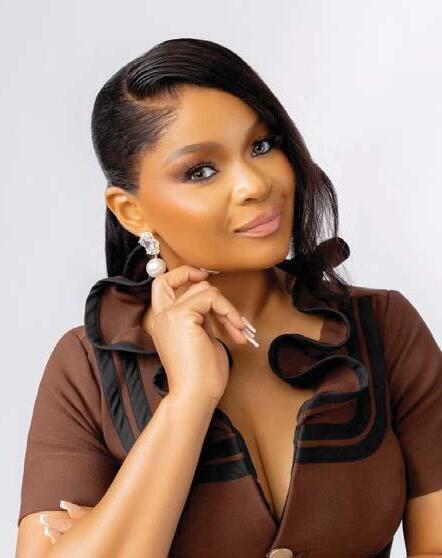
For some years now, Tomi Salami, a former beauty queen and social entrepreneur, has been on a mission of advocacy for clean energy, climate action and environmental protection through her registered not-for-profit organisation, Aurora International Charity Foundation.
Through the Foundation, Tomi has established a solid track record of successfully impacting positively over 30,000 adults, youths and children across the country using various platforms of education, welfare, empowerment and health.
Following the huge successes of her previous projects in Lagos and other states of Nigeria, Tomi is set to unveil another out-of-the-box concept, which would take environmental advocacy to a whole new level in Nigeria and beyond.
On Thursday, May 30, Tomi will be unveiling a new elite project, tagged, ‘Catch Them Young: Environmental Awareness Convention 2024.’ This highly impactful gathering —which aligns with the United Nations Sustainable Development Goals (SDGs) on Sanitation, Clean Energy, Climate Action and Environmental Protection— targeted at high school students in Lagos, holds at the J.F Ade Ajayi Auditorium, University of Lagos.
According to Tomi, who is the Project Coordinator, Lagos maintains a strong position as one of Africa’s top destinations for business, culture, tourism, politics, entertainment, hospitality, sports and more. Thus, “it is imperative that we engage in activities that creatively and succinctly educate and inspire citizens to become environmentally conscious, thereby fostering a sense of responsibility to our planet.
“Our focus for the ‘Catch Them Young’ campaign is geared towards the highly impressionable younger generation as we strongly believe that pioneering an environmentally conscious foundation for children early in life will bring about far-reaching success that will spread further and last longer thus establishing children as young Environmental Ambassadors for their various communities,” the ex-beauty queen added.The epochmaking environmental convention will include engaging interactive sessions by experts, speakers and stakeholders in the industry, environmental activists, celebrities and major inspirational figures in Nigeria.
Adebayo Adeoye
bayoolunla@gmail.com; 08054680651
Until his death in May 2023, Otunba Subomi Balogun was a colossus in the Nigerian money market. He was a man of excellence and integrity; a trailblazer in the sector, and an authority who came, saw and conquered all that was to be conquered!
Although he was trained as a lawyer, he came into the financial sector just when the country was in dire need of top intellectuals like him. And in no time, he reshaped the industry and became a household name.
So when he breathed his last, an avalanche of tributes poured in. He would be eternally remembered as one of those who rewrote the story of the country’s financial sector and launched it onto the global map.
The barrage of tributes didn’t come from Nigeria alone. They flowed in from far and wide beyond the shores of Africa, signalling his influence.
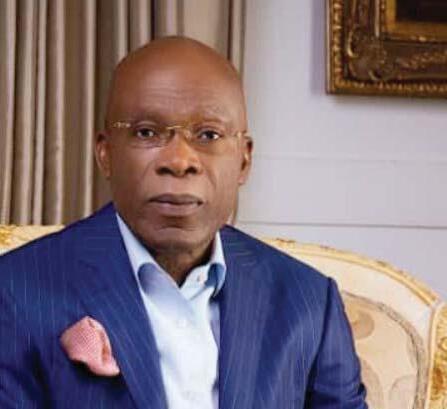
Anyone who had watched billionaire businessman and Chairman of Zinox Group, Dr. Leo Stan Ekeh and his adorable wife, Chioma, closely will agree that they were created for each other. Their union exemplifies the popular saying ‘marriage made in heaven.’ The e-commerce mogul tells whoever cares to listen that his wife is his jewel of inestimable value.
Indeed, his love for his beautiful wife beggars description. The high-flying mogul has
And just as the deathless quote of H.W. Longfellow “When a great man dies, for years the light he leaves behind, lies on the paths of men,’’ last weekend, many converged once again to remember the late banking titan whose contributions to Nigeria’s financial sector remained unsurpassed.
Society Watch gathered that top dignitaries were at the Cathedral Church of Our Saviour, Ijebu Ode, on Saturday, May 18, 2024, for a year remembrance of the late high-flying business guru.
The A-list guests at the remembrance include Governor of Ogun State, Prince Dapo Abiodun; former Governor of Bayelsa and now Senator Seriake Dickson; Otunba Gbenga Daniel, billionaire business mogul, Rasak Okoya (Eleganza); Ogbeni Oja of Ijebuland, Chief Sonny Kuku; Senator Musiliu Obanikoro; wife, children, family members and other personages.
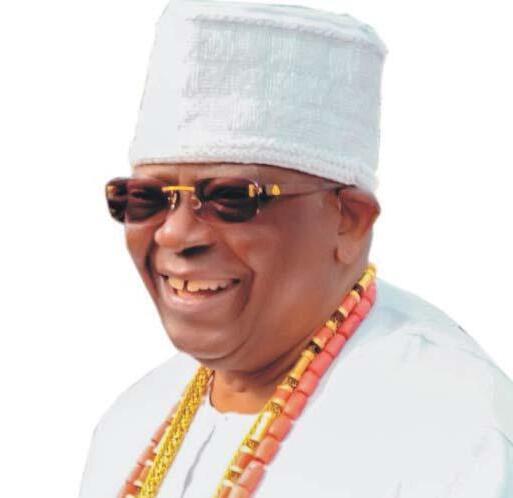
always showcased his love for her anywhere and anytime. This, he demonstrated recently when his beloved wife hit the diamond age.
Ekeh, known for having an eye for luxury, extended this to the birthday bash. The Zinox Group Chairman pulled out all of the stops and splashed out a seven-figure buck for a four-day all-expenses-paid 60th birthday exclusive soirée held at his London multimillion pound magnificent tech mansion situated on five-acre prime land at St. George’s Hill in Surrey, UK.
As gathered, the Weybridge suburb, a reserved resort area populated by an elite group of Jewish, Arabian and Russian billionaires, was lit and came alive.
According to our sources, 60 couples, including Nigerians, British and Asians, were invited to the soiree. Those guests couldn’t have had a better host than Ekeh who ensured that every one of them had a memorable good time. For about 72 hours, Ekeh’s VIP guests balled. Party planners, security, lighting
engineers and caterers had already arrived days earlier to set up.
The new ‘diamond girl’, Chioma Ekeh, was all glam and beaming as she was surrounded by her hubby and children, as well as her siblings. There was a torrent of heartfelt speeches, praises and encomium for the celebrant, who on her own merit, has become a beacon of inspiration for women in technology.
To make his sweetheart’s day truly special, the billionaire flew in two international gospel artistes, Sinach and Ada, to entertain their rich chums. The two singers’ uplifting performances set a joyful tone and resonated with the high spirits of the select VIP guests.
The highlight of the birthday soiree was when the 68-year-old billionaire businessman, Ekeh, took up the role of the disc jockey from DJ ChoplifeIhama and displayed his deft skill behind the turntable, dishing out well-mixed oldies and contemporary Afrobeats at the spectacular party.
What would have happened to Nigeria’s aviation sector if Allen Onyema did not come into the industry at the time he did? This is the question on the lips of many Nigerians who have been wowed by the gigantic and monstrous contribution of the aviation guru.
That the Air Peace Chairman is a blessing to the nation’s aviation sector is no longer contestable. His emergence into the industry heralds a monumental gift for the sector, and this is no gainsaying. It is on record how the man single-handedly revolutionised the aviation sector in Nigeria and changed the landscape even when not many believed he could. When the company was birthed, little did he know that in no time it would redefine the aviation industry. Before his eyes, the company has grown to become one of the most successful airline companies in Africa.
Onyema’s journey epitomises strength, reliability, and consistency, and resulted in establishing Air Peace as a source of national

Aderonke Ademuluyi-Ogunwusi, wife of the Ooni of Ile-Ife, Oba Adeyeye Enitan Ogunwusi, has added another beautiful feather to her already studded cap.
The beautiful Olori of the Àrólé Oòduàfin Àdìmúlà, last Friday received the Outstanding Leadership Award bestowed on her by the ItireIkate Local Community Development Area (LCDA) as part of the activities to mark its 2024
pride for Nigerians.
However, the voyage was never a smooth one, every step of the way, both here and abroad, he has endured insults and encountered countless obstacles that have been thrown across his path by hostile enemies of progress and envious competitors.
Since he founded Air Peace, things have never been the same in the industry, he has launched the nation’s aviation sector onto the global map and has grown astronomically in the last 10 years beyond the imagination of many.
Apart from his business wizardry, the aviation top shot, for the umpteenth time, has proven that his love for his fatherland appears inextinguishable.
Last Friday, the trained lawyer once again stood tall and shone brightly when he received the Vanguard Personality of the Year 2023 award at the prestigious Eko Hotels and Suites. It was a night of honour, torrents of encomium for the quintessential aviation guru. It was indeed a well-deserved award.
Artisans Day.
While she is not a stranger to awards, with her shelf filled with an array of honours, this one fits so well coming from a group she had helped to nurture to maturity. Olori AdemiluyiOgunwusi, who is also the creative director, Ile Oodua Adire Textile hub in Ife Grand Resorts, Osun State, has contributed a great deal to the founding and development of Adire hubs across the South-west states and beyond. For her, it was a beautiful and joyful moment. And sharing her joy, the brilliant Olori commended the organisers of the event, particularly Ibrahim Lawal, chairman of the group, for their efforts to improve the fortunes of the artisans association in the LCDA and Lagos in general.
Speaking further, she promised to sponsor some of the artisans, especially the Adire makers to this year’s African Fashion Week 2024 edition in London, while also encouraging all female artisans to be productive in their various
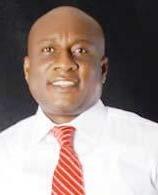
vocational skills.
Lawal, who spoke on her selection for the award, said it was in recognition of her exceptional leadership and dedicated services to the Yoruba Race. Lawal said the group is dedicated to mentoring young artisans, collaborating with industry partners and creating a community of artisans that thrives on mutual support and growth. Over the years, the Olori, who is generally seen as a very resourceful woman of substance has become the darling of all as a result of her undying love for the upliftment of Yoruba culture and traditions. Her relentless work ethic has taken her across the globe in her quest for excellence. A philanthropist par excellence, she has tried to amplify her famed legacy of benevolence and generosity, as she always makes conscious efforts to put smiles on the faces of the less privileged in society.
An imminent solo exhibition in Abuja celebrates the prodigious talent of Ifeanyichukwu Obingene, a young artist who, as a child, was diagnosed with autism and ADHD. Okechukwu Uwaezuoke reports
EvenastheAbujaartcommunitystill grapples with the mind-boggling paintings of teenage prodigy Kanyenyachukwu Tagbo-Okeke, who was recently named a fellow of the Society of Nigerian Artists, whispers about another specialneeds artist are making the rounds.
The talent, whose name is Ifeanyichukwu Obingene and who possibly draws from the same creative fount as Kanyenyachukwu, beckons with the expressions of his enchanting brushstrokes. With his solo exhibition, titled Worlds Within (Art and Autism), which opens on May 30 at 6 p.m. at the BNL Club House on Alex Ekwueme Way, Abuja, this artist is set to lead his audience into the unseen realms of imagination, echoing the unseen cosmos in vibrant hues.
His story somehow began, not unlike that of parents, Georgina and Emmanuel, upon noticing his inability to talk at the age of two, had cause to be concerned. They were initially assuaged by a paediatrician’s soothing, reassuring words, to the children. However, more reasons to be worried began to manifest, attesting to the fact that their child was at odds with the world around him. “We actually noticed a few other abnormal behaviours,” she recalls. One was the fact that he was always quiet, and the nursery teacher observed that he could not answer questions in the class or respond to most activities like other children. “Sometimes he [would go] under the teacher’s table, as he also did at home.”
Events soon took a more worrisome turn after he was abruptly uprooted from Divine Love Nursery and Primary School in Enugu to St.Aloysius Nursery and Primary School in Garki, Abuja. That sudden relocation, spurred by his parents' move to the federal trait that had been unnoticed until then, when he was just over three years old.
Restlessness seemed to possess him, a relentless force egging him on to constant motion. In class and attention. As if this and his inability to speak weren’t enough causes for concern, he started exhibiting repetitive and constrained behaviours. Academics failed to engage him, adding to the growing mystery. Enrolling him at Premier International School in the bustling Wuse area of Abuja, alongside his siblings, felt like the elusive solution they had been school, this new chapter seemed to hold the promise of a brighter academic future. Credit for this goes to the dedicated and knowledgeable Mrs. Joann Anokwuru, the then-school head, who displayed
Additional insights into their special-needs child’s problems came from publications, friends, and parents of similar challenged children. “We met Mrs. Anokwuru almost every morning to review Ifeanyi’s work both in the school and at home in relation to his individualised education plan (IEP), which she designed,” Mrs. Obingene recollects. Later, as the Obingene couple continued to observe their son’s behaviour closely, they noticed objects. Perplexed, they observed him meticulously write and illustrate each letter fromAto Z, matching them with corresponding objects. Every available surface, whether plain book or paper, would soon become a canvas for his ceaseless outpouring of meticulously crafted drawings. Subsequently, Ifeanyichukwu progressed to add-
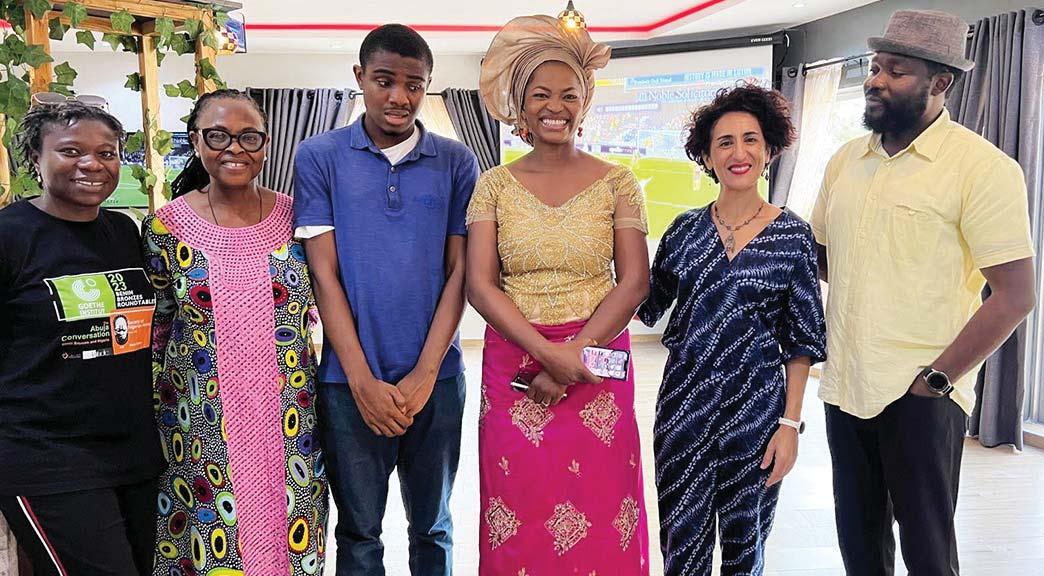
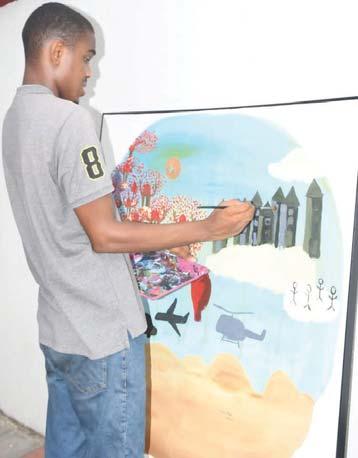
guise of cartoon characters and became fervently devoted to shaping malleable plasticine into forms. All this while, his parents remained oblivious to the profound artistic prowess burgeoning within him.ding talent and unique way of expressing himself through art, recommended a visit to the Autism Awareness and Care Training Centre in Ghana, where he could spend two weeks of his vacation under the guidance of the dedicated special needs head teacher, Mr. Mawusi. Upon their return, Mr. Mawusi urged the Obingene couple to value and nurture his artistic skills—a message that resonated
creative pursuits. Sadly, the school, prioritising academic improvement, overlooked his artistic abilities, viewing them as just another subject to

the deeper, untapped artistic potential within him remained dormant, awaiting the nurturing environment it deserved.
and ADHD. Thus began a new chapter in his life. Despite the hurdles he faced, his journey took a beautifully unexpected turn as he discovered a hidden talent—his impeccable handwriting. With diligent practice, he got better and better at sketches in pencil to intricate ink creations. Guided by the gentle hand of his occupational therapist, Mrs. Eniat Elias, Ifeanyichukwu ventured deeper into the world of art—a realm where his vivid imagination thrived. Through Mrs. Elias’s unwavering support and guidance, he crossed paths with a skilled sculptor living in the Bwari community of the federal
capital territory and a mosaic artist, unlocking new dimensions of creativity and fostering his growth in ways both profound and transformative.
The spark of creativity in him eventually got the attention it deserved during his secondary years, opening a vent to his freely expressing himself in the visual arts. This passion blossomed into a remarkable journey of artistic discoveries, leading to his exceptional achievements in both the WAEC and NECO exams, where he secured a commendable
discerning eyes of the British High Commission during a prestigious exhibition at the British Council inAbuja, which featured art by special needs students.
works graced the pages of his school’s magazine and were hailed as the best student artwork. This was after having appeared several times in the school’s yearbook.
Through the Award Scheme Development Accreditation Network (ASDAN) programme, his artistic, photographic, and computer studies abilities under this comprehensive UK-developed curriculum, starting a life-changing path that would pave the way for a bright future.
“We continued encouraging him at home by organising art lessons,” Mrs. Obingene discloses.
“During his long vocations, he attended lessons at the Arts Centre at Cyprian Ekwensi’s House, Abuja. At the end of his second year in the ASDAN exhibition at the Premier International School with the assistance of his art instructors at the school and his private art teacher. It was a huge success, which generated handsome revenue for him through the sale of some of his works.”
Currently, Ifeanyichukwu is fully immersed in the creative ambiance of the Arttitude Art and Design Studio, fervently honing his skills under the director’s meticulous supervision. Concurrently, he also takes graphic design courses at Aptech Computers and Kani Computer Technologies Ltd.
Africa is terra cognita for positive and negative things in international politics. It is well known as reservoir of strategic raw materials and platform for competitive international politics. Former President Valéry Giscard d’Estaing of France suggested a trilateral collaboration among Europe, America, and Africa. Europe and America were to fund and provide equipment. Africa was to enable the exploitation of its natural resources. Africa being a major concern of Nigeria’s foreign policy, as cornerstone and then as centrepiece as from 1976, Dr Okoi Arikpo, Nigeria’s Commissioner for External Affairs under General Yakubu Gowon, adopted the policy of non-acceptance of the exploitation and use of Africa’s raw materials only for the development of Europe, but to the detriment of development in Africa. When Nigeria made the exploitation of Africa’s mineral resources a major foreign policy issue in Africa, France explained that she was in Africa on the kind invitation of other sovereign states like Nigeria. In other words, it is not the foreign interventionists that should be blamed. Very good and logical self-defence. And true, if African leaders allow the exploitation of their resources to the detriment of their own future development, why should any other country be blamed for Africa’s policy remissness? Africa is a very critical problem unto itself. It is against this background that the many problems of non-development in Africa, and particularly, the recidivist coups d’état in Africa should be explained and understood. Apart from the issue of Africa’s non-development, there is the question of growing insecurity in many regions of Africa. In the Sahel sub-region of West African region, the insurrection and thuggery of the Touaregs, terrorism of the Al Qaeda-supported ISIS, etc. is inflicted on the peoples, and must be addressed. It is because most Francophone countries rely heavily on France’s help to contain terrorist challenges, but to no avail, that a situation of mésentente has developed. In fact, the misunderstanding led to the declaration of the French ambassador to Mali a persona non grata and, fortunately and unfortunately, to the withdrawal of French and US troops from Niger Republic. In light of this, can African leaders really govern themselves well? Has Africa any good development future in spite of its Agenda 2063?
Since King Leopold II of Belgium acquired rights over the DRC (Democratic Republic of the Congo), at the 1885 Berlin Conference that partitioned Africa on paper into European zones of influence, the DRC, variously referred to as Zaire under Joseph Seseko Mobutu’s policy of authenticity and as Congo-Kinshasa, to differentiate it from Congo Leopoldville, cannot be said to have known enduring peace. Belgian colonisation was very brutal and brutish in administration, very inhuman in focus, and most barbaric in strategic focus. This factor has hardly been duly investigated to explain why the DRC has remained a victim of its own making in the post-independence era.
First is the exploitative foundation of the country. King Leopold II made the DRC a private property, meaning that the governance of the country was largely dictated by the whims and caprices of the Belgian king. Secondly, he named the country ‘Congo Free State.’ In the words of the Wikipedia, ‘in the Free State, colonists coerced the local population into producing rubber, for which the spread of automobiles and development of rubber tires created a growing international market.’ Perhaps more importantly, Wikipedia also has it that ‘rubber sales made a fortune for Leopold, who built several buildings in Brussels and Ostend to honour himself and his country. To enforce the rubber quotas, the Force Publique (Public force) was called in and made the practice of cutting off the limbs of the natives a matter of policy.’ In fact, ‘during 1885-1908, millions of Congolese died as a consequence of exploitation and disease. In some areas, the population declined dramatically…’ The point being made here is that the foundation of political governance in the Congo-Kinshasa was that of bitterness-driven exploitation of the people on which growth and development has been predicated since then.
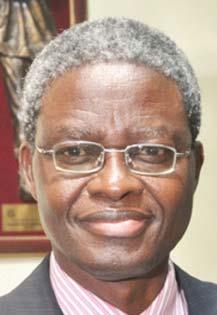
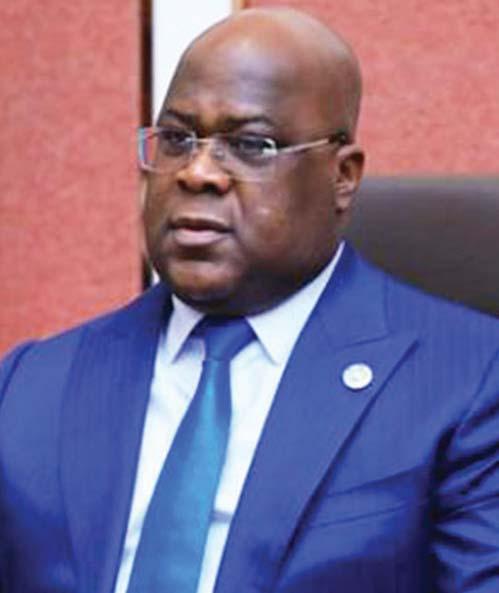
And true enough again, the annexation of the Congo Free State, on October 18, 1908, thanks to the Belgian parliament which voted for it to become a Belgian colony, only served further as a catalytic legitimation of the exploitation. In this regard, why is it difficult for the Congolese to sit back and reflect on the foundations of their political history, in order to stop self-killing, and to reject being used to kill themselves? Why should the conflict in eastern Congo be allowed to trend for too long? Why should there be no regional good neighbourliness? Congo’s relationships with Rwanda and Uganda are not good and are therefore impediments to AU’s continental objectives of integration, sustainable growth and development, as well as peaceful co-existence. If Belgium laid an exploitative foundation, must the Congolese also continue to sustain such a foundation?
In a review of The Trouble with the Congo: Local Violence and the Failure of International Peacebuilding, published on November 1, 2010, Nicholas van de Walle says that ‘the internal culture of the United Nations and the socialisation of its diplomats have blinded the MONUC from properly emphasizing the local causes for the conflict in eastern Congo.’ More importantly, he said that ‘favouring a top-down approach – the kind for which diplomats are trained – the international community has focused on national agreements and processes such as elections, ignoring the peace-building efforts that are necessary at the local level to
And perhaps most disturbingly, it is now a truism that the policy of zero tolerance for unconstitutional changes of government in Africa is more of sloganeering than a policy for action. One major reason for this is the dualist attitudinal disposition of the AU to it. When the constitutional provision in Chad required the President of the National Assembly in Chad to succeed the president in the event of his death or incapacity or unavailability and to organise election within 60 days, the AU kept quiet and allowed the Chadian military to install the son of the late President Idris Derby. Democracy only grows in the absence of double standard. Double standard is chicanery. It is recklessness in attitude, self-mockery in image, and self-defeatist in outcome. It is a mockery of democracy. This is why coup-making has become recidivist and why the people unknowingly also support coupists. Consequently, there should be greater caution in the election of leaders in Africa. In other words, any African with a foreign nationality should not be eligible to contest in presidential elections. In the context of Malanga’s US and DRC nationalities, which of the nationalities is most effective for purposes of juridical and analytical evaluation? Whatever is the case, the conflicts in the DRC and its region are nothing more than self-destruction and one way of killing Africa softly, in terms of destruction of continental unity, continental integration, and continental cooperation
mediate the festering conflicts over identity and land.’
The MONUC is the UNO Mission in Democratic Republic in the Congo, which was put in place after the signing of the Lusaka Ceasefire Agreement by the DRC and five other regional States (Angola, Namibia, Rwanda, Uganda and Zimbabwe) in July 1999. The MONUC was changed on 1st July 2010 to MONUSCO on the basis of UNSC resolution 1925 of 28 May, 2010 in order to assist the Congolese government in its efforts at political stabilisation and peace consolidation efforts.
With the objectives of the MONUSCO, rather than uniting to address the conflicts militating against growth and development in the DRC, Congolese politicians have been unnecessarily engaging in squabbles over power. And the United Nations, as revealed by de Walle, has not helped matters. Who will now really bring help to the DRC if the people of the DRC refuse to help themselves?
Secondly, the May 19, 2024, failed coup, led by Christian Malanga Musumani, a Congolese-American politician and businessman, generally referred to as Christian Malanga, raises several issues at the organisational level, international law level, and at the level of the self-adopted policy zero tolerance for unconstitutional changes of government in Africa. As regards the level of organisation, Michelle Gavin of the Council on Foreign Relations raised three questions in her write-up, “A Puzzling Attempted Coup in the DRC,” that are very thought-provoking: who convinced Christian Malanga, the leader of the coup plotters that this effort would succeed? How did the amateurish putchists manage to access the presidential palace? Whose agenda was advanced by this spectacle? The questions ought to be answered.
On who might have convinced the chief coup plotter, the answer cannot be far-fetched: it is himself à priori. He must have strongly believed in the success himself without qualms. There would not have been any good reason for him to know, on the one hand, that the mission is a failure ab initio and still accept, on the other hand, to give it a trial. Giving it a trial cannot but carry capital punishment if he fails. He must have factored this into the risks of trial. Since it also takes two to tangle, Malanga cannot but have relied heavily on domestic support, especially on his acquaintances. Additionally, Christian Malanga is a Congolese by ius sanguinis in origin and American either by ius soli, naturalisation, or otherwise. All in all, engaging in coup that fails has the potential of death penalty either after court trial or during the exchange of fires. Malanga already lost his dear political and business life to nothingness. There cannot be any disputing the likely roles of the neighbours of the DRC and the United States ambassador to Kinshasa, Lucy Tamlyn in the coup saga: the DRC (FDLR: Forces démocratiques de libération du Rwanda) has been in tension since March 27, 2022 with the Rwanda March 23 Movement which enjoys a controversial support from Uganda, but which is flatly denied by Uganda. If there is any actor fighting the DRC government, it cannot but be in the interest of both Uganda and Rwanda. And true enough again, the Congolese conflict dates back to 1996 when the Zairean leader then, Seseko Mobutu, was accused by Rwanda of hosting the Hutu perpetrators of genocidal crimes, as well as arming the Rwandan rebels. The first Congo War began on October 24, 1996 when ‘the Tutsi-dominated AFDL (Alliance of Democratic Forces for the Liberation of Congo-Zaire in Kivu and troops of the Rwandan army launched offensives in eastern DRC.’ The acronym, AFDL, also refers to the coalition of Rwandan, Ugandan, Burudian, and Congolese dissidents, disgruntled minority groups that brought Laurent-Désire Kabila to replace Mobutu Seseko). But Kabila never accepted to be controlled by foreign backers, hence the coalition fell apart and the 2nd Congo war began in 1998. Consequently, one cannot rule out help coming from the neighbourhood. If there is no help from the neighbourhood and also from within, from where came the weapons used? Could they have been imported by air or by sea without the government discovering them at the ports of entry? Were the weapons used imported through diplomatic bags? Did Malanga get them as an American or as a Congolese? Was Malanga living in the United States or in the DRC few months before the coup attempt? He was born in Kinshasa on 2nd January, 1984, in other words, he was about 41 years old before he was killed in the coup attempt. Besides, he founded the United Congolese Party (UCP) in 2012 to serve as a platform for independent opposition candidates, and the Congolese in the Diaspora. In 2012, he was only about 28 years. Where did he get the funding for the establishment of a UCP, a centre-right political party in exile? What could have been the nature of agreement between Christian Malanga and his other host country, the United States, in terms of support for coup against the Tshekedi government in the DRC?
Global attention is already focusing on the coup from different dimensions. It is useful to first investigate the easiness with which the coupists had access to the presidential palace. Without any whiff of doubt, the input of an insider cannot at all be ruled out. The mere fact that the coupists met a stiff resistance can only suggest a division amongst the presidential guards. If support for the coup had a military support, as it was in the case of the Tchiani coup in Niger, the coup would have been a success and the story would have been a fait accompli and different.
Read full article online - www.thisdaylive.com
The recent sanctions imposed on two judges by the National Judicial Council for breaches of judicial process are too insufficient to serve as a deterrent to compromised judges responsible for the rot in the judiciary, Wale Igbintade writes
The National Judicial Council (NJC) penultimate week penalised two judges in the country when it barred them from elevation to the Court of Appeal. The council, which took the decision at its 105th meeting, said the action was taken based on the judges’ breaches of judicial process.
Those sanctioned are Justice Inyang Ekwo of the Federal High Court who was barred from being promoted to the appellate court for two years, and Justice Godwin Brikins-Okolosi of the Delta State High Court who got three years ban.
While Justice Ekwo was found culpable of abusing his discretionary power by wrongly granting an ex-parte order, Justice Brikins-Okolosi was penalised for failure to deliver judgement within a stipulated period after parties had filed and adopted their final written addresses.
The case that earned Justice Ekwo sanction, marked FHC/ABJ/C/626/2023, was filed by Juliet Gbaka and two others against Seplat Energy Plc and 12 others. The judge issued the controversial ex-parte order on May 11, 2023, suspending the Managing Director and Chief Executive Officer of Seplat Energy Plc, its chairman and other members of the company’s board from office. About two weeks later, the Court of Appeal in Abuja reversed the order.
Ekwo’s ex-parte injunction against Seplat was seen as an embarrassment which sent a damning impression to foreign investors that a Nigerian court, based on a frivolous petition, could remove a chief executive officer from office instead of first requiring the applicant to put the respondents on notice.
On the other hand, Justice Brikins-Okolosi was said to have wasted seven years in Joseph Anene Okafor Vs Skye Bank’s case, a suit marked A/94/2010, after parties had filed and adopted their final written addresses. At this stage, the stipulated period for judgment to be delivered is within three months.
Many legal experts feel that the punitive measures taken against the judges are insufficient, considering the embarrassments their actions have caused the judiciary and the country at large. For many of them, the actions of Justices Ekwo and Brikins-Okolosi clearly show that judges in the country do not learn from the mistakes of other judges.
Apart from the ex-parte order which Justice Ekwo was penalised for, he has been in the eyes

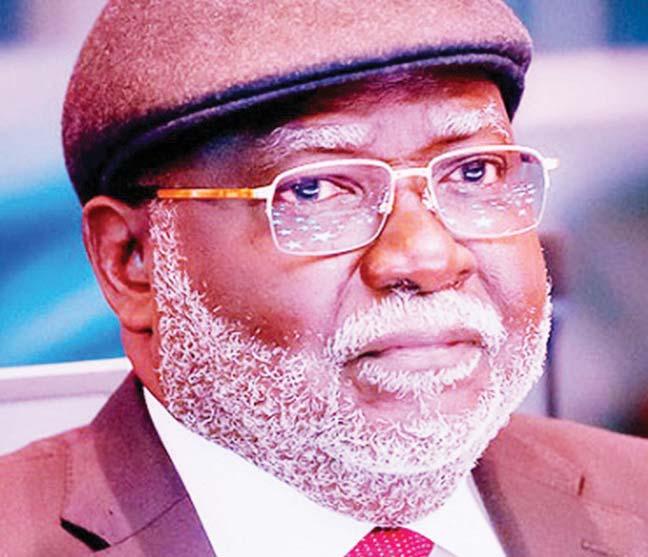
of the public for granting frivolous orders and delivering controversial and incongruous judgments. In March 2022, the judge, without any legal backing, sacked the then Governor Dave Umahi of Ebonyi State and his deputy, Kelechi Igwe, from office for defecting from the Peoples Democratic Party (PDP) to the All Progressives Congress (APC).
The judgment was in sharp contrast to several decisions of the Federal High Court, particularly that of the Gusau Division of the court which a month before, ratified the defection of the then Governor Bello Matawalle of Zamfara State, who similarly dumped the PDP, on whose platform he became governor, for the APC in 2021.
The most ridiculous sanction by the council was the mere caution it gave to a judge of the Yobe State High Court, Justice Amina Shehu, for issuing Writ of Possession Conferring Title on the defendant when there was no subsisting judgment of any court to enable her to issue the writ.
What the judge basically did was to issue a warrant to collect somebody else’s property with no judgment underlying it, which by all standards,
amounts to burglary or theft.
It was shocking to many Nigerians that a judge who abused her power for the purpose of converting other people’s property under the colouration of rule of law should be written and cautioned.
At the minimum, this infraction is supposed to fetch her a jail term either as a pre-trial detainee or a convict. But the NJC merely cautioned her.
With the infractions of the judges, the council destroyed discipline and accountability in the judiciary. Ordinarily, the judges should not have any reason to remain in office. But unfortunately, the NJC gave them a slap on the wrist.
This is why in 2022, a retiring justice of the Supreme Court, Justice Ejembi Eko, accused the council of applying double standards in the discipline of erring judicial officers. He said while some judges found culpable of misconduct were barred from getting promotions, others that committed similar breaches, had their promotion stalled for some years.
Also at the NJC meeting, the council said it considered two reports of its two Preliminary Complaints Assessment Committees that filtered 35
ThereisnodoubtthatRiversStateGovernor, Siminalayi Fubara, has been blowing hot lately and putting on constant edge his estranged godfather and Minister of the Federal Capital Territory (FCT), Mr. Nyesom Wike, due to the complete breakdown of their relationship.
The two gladiators are engaged in a feud over the control of the political structure in the oil-rich state, leading to the polarisation of the state House of Assembly.
Before he became governor, Fubara was the state’s Accountant-General underWike’s administration.
He was declared wanted by the Economic and Financial Crimes Commission (EFCC) in May 2022 over an alleged N435 billion fraud.
In fact, there are allegations thatWike opted for Fubara to succeed him because of the immunity that would shield him from standing as a prosecution witness if the EFCC arrests him (Wike) for corruption.
Early this month, the governor had said a judicial panel of inquiry would be set up to investigate the management of the state’s resources and affairs under Wike.
Manyanalystssaidtherewasnowaythejudicial panel of inquiry would not find him wanting as the former accountant-general.
But responding lastTuesday while inaugurating Egbeda internal roads, Fubara said he was not scared as he acted on approvals by Wike, who was the chief accounting officer of the state. He
petitions written against judges of the Federal and State High Courts, and decided to empanel eight committees to further investigate the petitions that were found meritorious by the committees. Many fear that nothing reasonable would come out of the petitions.
Some Nigerians are wondering why the council did not sanction the Court of Appeal justices who heard and delivered judgment in the appeal filed by the New Nigeria Peoples Party (NNPP) to challenge the nullification of the election of Governor Yusuf of Kano State and the various panels that heard and delivered biased judgments at the tribunals and Appeal Court against the Peoples Democratic Party (PDP) lawmakers in Plateau State which caused them their seats in the state House of Assembly and National Assembly respectively.
Since Nigeria enthroned democracy in 1999, judges are increasingly being derided because observers feel that justice is given to the highest bidder. The resultant effects, according to them, are the vague, contradictory and incongruous judgments that emanate from the courts. Hardly are judgments or orders in sensitive business and political cases delivered without allegations of bribery.
Many Nigerians are disappointed that corruption has tainted the judiciary. What they have seen over the years is that instead of the third arm of government to use their judgments and orders to straighten the path of progress for the country, judicial officers themselves want to deep their hands into the cookie jar.
It’s been argued several times that justice administration is a very serious business, and the judiciary as an institution derives legitimacy from the implicit confidence reposed in it by the masses over whom it sits in judgement. When the impression, real or perceived, is created that high net-worth individuals can approach the courts to procure judgments and orders at the expense of less-privileged members of the public, then the foundations of the justice system would have been eviscerated.
This, perhaps, was why the presidential candidate of the Labour Party in the 2023 election, Peter Obi, recently described the judiciary as the biggest danger to democracy in Nigeria. At the fifth memorial of the late Justice Anthony Aniagolu in Enugu, he reiterated the urgent need for the revitalisation of the Nigerian judiciary, adding that all other institutions depend on it for the country to thrive.
added that he has records of all his activities under the past administration.
“Everything we are doing is in my white paper. I carry it along. There is no issue of any manipulation. Call me any day, any time it is there,” he said.
”Even the ones I did before this time, I still have all the records. If you call me any day, I will bring my records of all myactivitiesingovernment.Iknowthat,asacivilservant, whatismostimportantisrecord-keeping.Iamnotscared of anything. Anybody who calls me up any day, any time, I have my records to show. I have all the approvals to show thatIactedbasedonapprovalsandnotpersonaldecisions. We are not going to rest until we make everyone happy in Rivers State,” the governor boasted.
With Fubara’s comments, there is no doubt that he has further rattled Wike and his camp.
History was made in the ancient city of Kano last Thursday when the dethroned Emir of Kano, Alhaji Muhammadu Sanusi II, was reinstated by Governor Abba Yusuf after he signed into law, the Kano State Emirate Council (Repeal) Bill 2024, which dissolved the four new emirates created by former Governor Abdullahi Ganduje’s administration. However, a court order seeking to stop Sanusi’s reinstatement has created uncertainty, Ejiofor Alike reports
Four years after Muhammadu Sanusi II was deposed as the 14th Emir of Kano under controversial circumstances, Governor Abba Yusuf of Kano State on Thursday reinstated him to the throne of his forefathers as the 16th Emir of the ancient city.
Emir Sanusi II returned to the throne after Governor Yusuf signed the Kano State Emirate Council (Repeal) Bill 2024 into law, which repealed the law that split the Kano emirate into five emirates – Kano, Rano, Karaye, Gaya and Bichi.
The year-long move to reinstate Emir Sanusi II, a former governor of the Central Bank of Nigeria (CBN), also known as Lamido Sanusi before becoming king, had created anxiety in Kano State.
Former Governor Abdullahi Ganduje’s administration in 2019, enacted a law that created four additional emirates from the Kano emirate, bringing the number of first-class Emirs in the state to five.
After splitting Emir Sanusi II’s Kano emirate into five emirates to whittle down his influence, Ganduje currently the National Chairman of the All Progressives Congress (APC), sacked the emir on March 9, 2020, and banished him to Loko, a remote community in Nasarawa State.
However, Justice Anwuli Chikere of the Federal High Court, Abuja, in December 2021, declared his banishment as unlawful and unconstitutional, awarded N10 million compensation to him, and ordered that apology to him should be published in two national dailies.
Ganduje was not the first governor of the state to split the Kano emirate.
Following his sour relationship with the then Emir Ado Bayero, the late Governor Abubakar Rimi had on April 1, 1981, created four new emirates of Gaya, Rano, Dutse, and Auyo, in a bid to whittle down the power of the highly revered emir.
But Rimi did not dethrone Emir Bayero.
However, when he lost his reelection bid, his successor, the late Governor Sabo Aliyu Bakin Zuwa, reversed the creation of the four new emirates in 1983.
Sanusi’s return to the throne also bears similitude with the dethronement and return to the throne of the late Olowo of Owo, Sir Olateru Olagbegi.
Olagbegi was off the throne for 21 years and had to return to the throne when Oba Ogunoye with whom the Western regional government replaced him died under the administration of the old Ondo State Governor, Mr. Bamidele
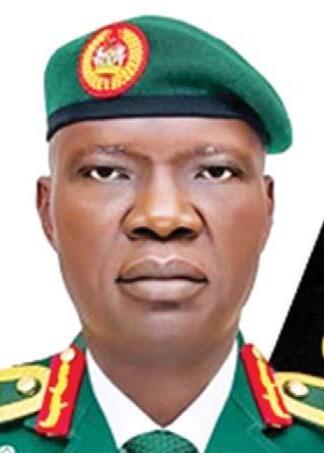
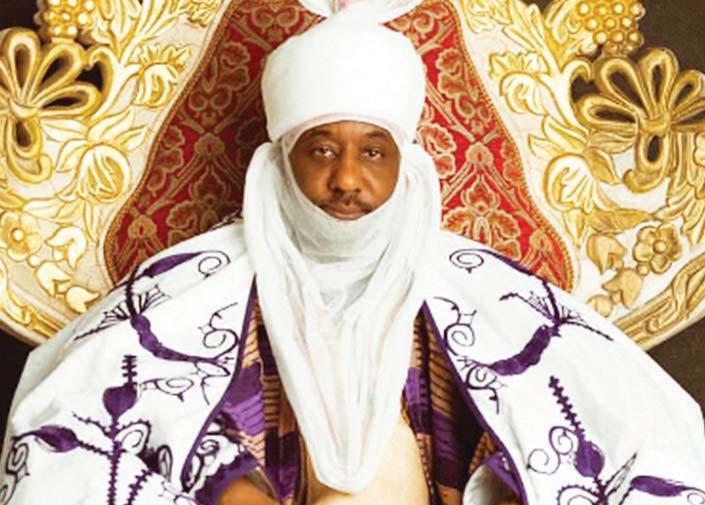
Olumilua.
Both the late Olagbegi and Sanusi were caught up in the intricate webs of politics in their respective intersections.
Indications that history might repeat itself emerged weeks to the May 29, 2023 handover when the presidential candidate of the New Nigeria People’s Party (NNPP) in the 2023 general election, Senator Rabiu Kwankwaso declared that the incoming administration of Governor Yusuf would revisit the dethronement of Emir Sanusi II, and the balkanisation of the emirate. Kwankwaso’s revelations heightened speculations of the likely return of Emir Sanusi II to the throne.
Sanusi became emir during Kwankwaso’s second term as governor, when Ganduje was the deputy governor.
But when Ganduje became governor, his loyalists accused Sanusi of supporting the PDP, especially when the governor was seeking a second term on the platform of the APC in the 2019 elections, and the current governor, Yusuf, was the PDP governorship candidate.
Sanusi was also perceived by Ganduje’s allies to be too critical of the state government’s policies.
But reacting to Kwankwaso’s comments, Ganduje had told workers in his speech to mark the 2023 Workers’ Day at Sani Abacha Stadium, that God would not allow anybody to destroy the four new emirates, insisting that the new emirates were permanent.
“And anybody that will destroy them, God Almighty will not bring him to Kano State,” Ganduje reportedly added.
One year after he removed Sanusi, Ganduje had at the presentation of a book on former President Goodluck Jonathan, which was authored by a journalist, Mr. Bonaventure Melah, argued that Sanusi was not the best man for the throne, but was chosen by Kwankwaso to spite former President Jonathan.
Sanusi had declared in a viral video after his dethronement that he was not going to fight to return to the throne.
The video was shared in March 2020 by Ibrahim Adam, the personal assistant to Yusuf as the then PDP governorship candidate in the 2019 elections.
However, Governor Yusuf reinstated Sanusi last Thursday after signing the Kano State Emirate Council (Repeal) Bill
2024 into law.
In signing the new law, which replaces the Kano State Emirates Council Law, 2019 and also dissolves the emirate councils created by Ganduje, the governor gave the five emirs 48 hours to vacate their palaces.
Handing over the letter of reinstatement to Sanusi at the Government House in Kano on Friday, Governor Yusuf said: “By the powers conferred on me by the Kano Emirate Council Law of 1984 and 2024, and supported by the recommendation of the kingmakers, I have the singular pleasure of confirming the reappointment of Muhammadu Sanusi II as the Emir of Kano and the head of the Kano Emirate Council.” Yusuf noted that Sanusi’s reappointment was “based on his competence, credibility and popularity,” urging the new Kano Emir to be guided by the principles of Islamic teachings and to use his position to unite the emirate, and also foster harmony among the Islamic sects in the state.
On his part, Emir Sanusi II described his reinstatement as God’s will, and thanked the state government for the “rescue mission.”
However, Justice Mohammed Liman of the Federal High Court, Kano, had on Thursday, granted an ex-parte order against reinstating Sanusi, pending the determination of a substantive suit filed against the reinstatement, and adjourned the case to June 3, 2024, for hearing.
But the governor ignored the order, alleging that the judge was in America when he made the order.
The governor, who vowed to report the matter to the governors’ forum, noted that he signed the law reinstating Sanusi at exactly 5:14 pm on Thursday, after which the court orders were issued.
On Saturday, the reinstated 16th Emir of Kano, moved to the Emir’s Palace, in his full traditional regalia, and sat for the first traditional court session alongside Kano kingmakers who showed solidarity to the monarch.
But Ado Bayero, also defied the governor, and moved into the second emir’s palace, also in the metropolis, amid tight security.
The state Commissioner for Police (CP) Mohammed Usaini Gumel and heads of other security agencies in the state, backed Ado Bayero, insisting on obeying the court order that stopped the governor from reinstating Sanusi.
As all the parties await the next line of action, it is hoped that Kano, which is notorious for its volatility, won’t go up in flames.
TheNigerianArmyhasagaindemonstrated its utter disregard for the rule of law in a constitutional democracy with its recent audacious closure of Banex Plaza in Abuja.
A free-for-all broke out between some military personnel and some traders at the popular electronics and ICT market penultimate Saturday.
Confirmingthedevelopment,theFCTPolice Command,inastatementbyitsspokesperson, Josephine Adeh, said: “Preliminary investigation revealed that one Suleiman Ahmed who had earlier gotten a phone from one Suleiman Ibrahim, a shop owner at New Bannex, went with four soldiers to persuade the seller for replacement upon the discovery that the phone was faulty, which met the resistance of the shop owner.”
This development, she added, led some
irate mobs to attack the military personnel.
“All parties were invited for questioning; the military personnel have been handed over to their organisation for necessary action to be taken.
“While normalcy has since been restored in Bannex and its environs, the Commissioner of Police FCT, Benneth Igweh, urges residents to peacefully go about their lawful businesses without fear from any quarters,” Adeh added.
But despite the intervention of the police authorities,whicharetheonlyconstitutional authorities empowered to handle such a case, personnel of the Nigerian Army took laws into their hands and stormed the Plaza, beating passersby and guards in a brutal show-of-force against unarmed civilians.
In the army’s characteristic manner of
being the accuser and the judge in its own case, its spokesperson, Major General Onyema Nwachukwu exonerated its personnel, and announced the shutdown of the plaza on Tuesday, after military personnel had apparently intimidated the traders to submission. In a democracy, such incidents are supposed to be investigated by the police who would then prosecute those found culpable.
If the military authorities considered the plaza a security threat, they should have approached the civil authorities such as the Abuja Municipal Council Area, which could have announced the shutdown.
Without a court order or the order of civil authorities, the army shut down the plaza and claimed to be leading an investigation on the own case.
This is impunity taken too far and a threat to democracy, rule of law and the civilian population.
The Nigerian Army usurped the functions of the police and the judiciary by closing the market.
By May 29 this year, it will be exactly one year that President Bola Tinubu took over the mantle of leadership as Nigeria’s president. During the swearing in of Tinubu as Nigeria’s 16th President about a year ago, his agenda for the economy was loud and clear to target a higher Gross Domestic Product growth rate and to significantly reduce unemployment
To achieve these, one of the things the president listed in his inaugural speech that he would do was to pursue an industrial policy that will utilise the full range of fiscal measures to promote domestic manufacturing, stimulate investments and lessen import dependency.
The energy sector was at the heart of his agenda when the president took over the office a year ago.
According to Tinubu “Power generation should nearly double and transmission and distribution networks improved. We will encourage states to develop local sources as well.”
Nigeria is endowed with large oil, gas, hydro, and solar resources, and it has the potential to generate 12,522 MW of electric power from existing plants. On most days, however, it is only able to dispatch around 4,000 MW, which is insufficient for a country of over 200 million people.
Under Kyari’s transformative leadership of the Group Chief Executive of the Nigerian National Petroleum Company Limited, the company conceived the idea of monetising Nigeria’s huge gas resources through independent power projects.
For a man who has transformed the NNPCL within the last four years despite the mounting opposition to some of his reforms initiatives, it is gratifying to know that the President believes in his capacity to implement energy policies that will enable the federal government to monetize all available oil and gas resources of today while paving the way for the total exploitation of new and cleaner energy sources of tomorrow.
To demonstrate this commitment to transforming the Nigeria’s power sector, the NNPCL, spearheaded by Kyari entered into a turnkey Engineering, Procurement and Construction (EPC) contract with China Machinery Engi- neering Corporation (CMEC) to construct the Gwagwalada Independent Power Plant project.
The project, which was flagged off in August by President Bola Tinubu, has been described as a game-changer in Nigeria’s power sector.
It is a 1,350MW Combined Cycle Power Plant with auxiliaries and Balance of Plant to be situated on 547 hectares of land already acquired at Gwagwalada, in the Federal Capital Territory (FCT), Abuja.
The project is expected to generate between $700m and $800m annually within the first ten years of operations.
The GIPP was necessitated by the need for delivering gas towards additional power generation capacity in Nigeria. Under the plan, gas supply to the plant will be through the Ajaokuta- Kaduna-Kano (AKK) Gas Pipeline Project, which is currently at its advanced stages of construction.
The GIPP’s fuel requirements will be satisfied under a long-term gas sales, purchase, and aggregation agreement with Shell Petroleum Development Company Joint Venture (SPDC JV).
The GIPP project consists up of three power train blocks of 450MW each. Each block will include two General Electric (GE) gas turbine generators, two heat recovery steam generators (HRSG), one steam turbine electric generator, one direct air-cooling condenser, balance of plant equipment and a black start diesel generator.
On completion, the GIPP Project will generate an aver- age of 10.3 million Megawatt hour (MWh) of electricity per year for sale to the Nigerian Bulk Electricity Trading Plc (NBET).
The sales of the generated power will be through the Power Purchase Agreement (PPA) with the NBET to distribution companies (Discos) under long-term agreements. and direct sales to major off-takers.
Before the GIPP, the NNPCL had commissioned a 50mw Maiduguri Emergency Power plant (MEPP), which is a power generation project aimed at providing reliable and sustainable electricity to the city of Maiduguri, the capital of Borno State, and its environs.
The project was necessitated by the extended power outages experienced in the region in the last nine years. These outages, caused by vandalism and insurgency attacks on power supply infrastructure, had resulted in a decline in economic activities in the region.
The power generation project, aside from providing reliable and sustainable electricity to the city of Maiduguri, and its environs will also be a significant addition to the many initiatives aimed at ensuring domestic gas
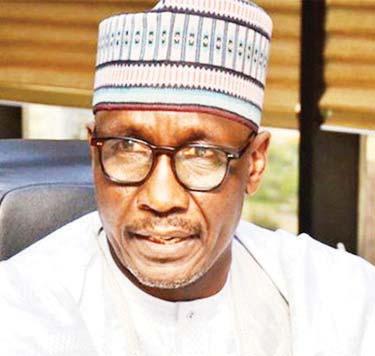
utilisation.
Under Kyari’s leadership, the NNPC has invested heavily in domestic gas footprint expansion projects through the delivery of the trans-Nigerian gas pipeline projects which includes the escravos project, the Lagos pipelines system, and the Ajaokuta-Kano Gas Pipelines.
As a national oil company, the NNPC is cooperating with its partners to solve the energy challenges facing the country.
The footprints of Kyari in the oil and gas sector were also felt when he led the NNPCL to secure a $7bn fresh investments from India for Nigeria’s petrochemical industry.
Kyari had accompanied President Bola Tinubu to India, where the deal was announced Tinubu had departed Abuja, Nigeria’s capital, for the G20 summit, which was held from September 9 to 10 last year in New Delhi, the Indian capital.
The president’s visit to India was focused on attracting investments to Nigeria with lucrative opportunities for investors, but most importantly, jobs for Nigerians and new revenue opportunities for the country.
India is one of the growing markets for Nigeria’s Liquified Natural Gas, and through this deal, the government will be able to create job opportunities for Nigerians.
Indian businesses serve as significant investments source in the midstream, downstream, and upstream sectors of the oil and gas industry.
In the area of gas infrastructure, Kyari is also leading the NNPC to implement the AKK Gas Pipeline contract.
The AKK Gas Pipeline is an integral part of the Trans-Nigeria Gas Pipeline (TNGP) with a capacity to transport about 2.2 billion cubic feet of gas per day.
NNPC Ltd had announced that the project’s completion date is now December 2024.
The project, when completed, is expected to ease natural gas transportation from Ajaokuta in Kogi State to Kano through several states.
In demonstration of his support to the agenda of the President, Kyari had, shortly after the removal of fuel subsidy and in line with the directive of Tinubu to provide alternative fuel option, led the NNPCL to enter into partnership with NIPCO Gas Limited to develop Compressed Natural Gas stations across the country.
The move is part of the NNPCL’s commitment to reducing carbon footprint and providing cheaper alternative fuel to motorists.
The current initiative is in addition to the phased deployment of 56 CNG stations planned by NNPC Retail across the country.
This landmark collaboration aims to expand the country’s CNG infrastructure, improve access to CNG, and accelerate the adoption of cheaper and cleaner alternative fuel for buses, cars, and Keke NAPEP.
This will significantly reduce the cost of transportation and engender sustainable national economic growth. Under the NNPC-NIPCO strategic partnership, 35 stateof-the-art CNG stations will be constructed nationwide, including three mother stations.
Once fully operational, the stations can service over 200,000 vehicles daily, thereby significantly reducing carbon emissions and associated impact on climate.
At the height of the foreign exchange liquidity challenges faced by Nigeria last year, Kyari led the NNPCL to secure a $3bn facility from Afreximbank to enable the Federal Government to stabilize the foreign exchange market and boost the value of the naira against the dollar.
The $3bn emergency loan from the bank was to ease pressure on the naira. The deal provided the federal government with dollars to aid liquidity to stabilise the naira via incremental releases based on the government’s needs.
The funds for the loan were released in tranches based on the specific needs and requirements of the federal government.
One can go on and on to highlight the remarkable impact Kyari’s leadership has brought to Nigeria’s oil and gas sector which appeared to be well known to the president, and which is probably responsible for the president’s seeming confidence in Kyari’s leadership of the NNPCL.
vote counts, at least in most places. Elections, by and large, reflect the wishes of the majority. Democratic institutions, such as the legislature and judiciary, function without being subservient to the executive. There is freedom of association. State institutions do not make themselves available to be used to persecute citizens because of political affiliation. There are enough in-built guarantees of independence in the system, faithfully and patriotically implemented by the operators. There is freedom of speech. The voice of the people is heard loud and clear. Press freedom is recognised and respected as a major plank of democracy.
May I swiftly add here that liberal democracy is not perfect — we can all see how President Donald Trump is stretching American democracy to the limit — but the system is robust enough to take care of the shenanigans. Moreover, the concepts of separation of powers (in a presidential system) and checks and balances allow democracy to self-correct its own ills. The good thing is that the people have a voice that cannot be stifled and the elected representatives are constantly on their toes. Everyone with power knows that it comes with responsibility. Above all, there is rule of law and constitutional order. These are not the sort of practices under dictatorships or military rule.
Like millions of Nigerians, I looked forward to the propagation of democracy in our land with the exit of military dictatorship in 1999. Regrettably, what we ordered was not what we got. Nigeria started descending into Afrodemocracy during
GAME OF THRONES
Alhaji Muhammadu Sanusi II has been controversially restored to his throne as Emir of Kano, four years after he was deposed by Dr Abdullahi Ganduje, then-governor of Kano state. I pity Alhaji Aminu Ado Bayero, his now deposed successor. He was a pawn on the chessboard. I think Ganduje went too far when he broke the Kano emirate into pieces clearly for political reasons. But the restoration of Sanusi could have been tidier given that there was a court injunction stopping it. No matter how bad an injunction is, it has to be obeyed until vacated or quashed. Ordering Bayero’s arrest, as Governor Abba Kabir Yusuf did, baffles me. I wonder what these governors will do with state police. Scary.
the first term of Obasanjo, who started taking a number of unilateral actions, disobeying court orders and infiltrating the National Assembly to install and uninstall the leadership. During his second term in office, he found a legal leeway for repression by setting up the Economic and Financial Crimes Commission (EFCC) to witchhunt those who were not in his camp. Dissenting governors were regularly removed — against the constitutional order.
The EFCC template became a tool for subsequent administrations: going after political opponents or those considered to be politically expendable. This sits well with many Nigerians who love media trial and jungle justice, even if the corruption allegations are weak or spurious. It also helps that the politicians themselves are not above board, so everything done to them is kosher in the eyes of many Nigerians. Afrodemocracy takes root under such circumstances, as a despotic president will simply cow opposition into submission. It is not uncommon for opposition figures to defect to the ruling party — some for economic reasons, some out of fear of being targeted by the EFCC.
Persecution, repression and co-optation weaken competitive democracy because of the likely absence of robust opposition. This can, in turn, deprive the citizens of good governance since the basic elements of accountability and transparency will be virtually non-existent. How then can democracy dividends be delivered to the people? In most cases, citizens are reduced
to nothing and they are ever ready to trade their dignity for crumbs from the table of power. What should be their right will be passed to them as a privilege. Politicians, unable to use their track record to win support, will prey on the citizens by playing up sectional interests to good effect, especially at election times.
The good news is that what we call “liberal democracy” today also had elements of Afrodemocracy — such as rigging, vote buying and political violence — centuries ago. It has evolved to what it is today. That is why democracy is often described as a journey, a continuum. And that is why we should celebrate our progress in 25 years. For one, Nigerian presidents have not been able to reduce the federal judiciary and legislature to mere rubber stamps. This is a glimmer of hope. There is still the occasional nudge to put the executive in its place, even if often cosmetic. But that the nudge exists at all shows that we can yet liberalise our democracy. We can fan the flame into fire.
Another landmark to celebrate: in 2006, we survived a sinister self-succession scheme by truncating an amendment to the constitution. It was designed to give the president — and, accidentally, the governors — a third term in office. On the surface, the plan was to award Obasanjo an extra term of four years since the constitutional limit is two terms of four years each. But, as it goes with Afrodemocracy, changing the constitution is the first step to life presidency — one step at a time. The failure of
ANNEXING BANEX
The Nigerian military has virtually relocated to the Banex Plaza, a favourite market for phones and computers in Abuja, after some traders assaulted two soldiers in uniform following a disagreement over a faulty mobile phone. I will say this again: under no circumstances should anyone assault uniformed officers. It is an attack on the state. If any civilian is wronged by soldiers, there are processes of seeking redress. But the same thing applies to the military: why shut down dozens of businesses because of the offence of a few? The culprits could have been fished out. For those canvassing a return to military rule, that is just a taste of the tyranny we suffered for decades. Brutal.
continent by increasing its inclusion quotient. Dr Ebrima Sall of Trust Africa pointed out the incongruence of demographic majorities that have become political minorities, a point echoed by Dr. Kole Shettima of MacArthur Foundation in his short intervention. Such incongruence, which is visible across the continent, is a subversion of the very idea of democracy.
For example, those under 35 years constitute 74% of Nigeria’s population while women account for 49% of the population. But the youth and the women barely have 5% each of elective positions, even with a Not Too Young to Run Act and the National Gender Policy. People with disability (PWD) fare significantly worse—and they represent more than 20% of the population. It is difficult to continue to guarantee overwhelming support for representative democracy when those who make decisions are not representative of the population of the countries. It should be noted that the concern here goes beyond mere representation. It is also about ensuring that governance reflects the priorities and needs of the vast majority. This is a good segue to my third takeaway.
With reference to why people put their lives on the line to fight for self or civil rule, Mr. A.B. Mahmood, SAN (a member of the board of trustees of the SMYF) reminded the summiteers of a famous quote by Amilcar Cabral, the Guinea-Bisau/Cape Verde nationalist and revolutionary poet: “Always bear in mind that the people are not fighting for ideas, for the things in anyone’s head. They are fighting to win material benefits, to live better and in peace, to see their lives go forward, to guarantee the future of their children…”
In short, democracy as an idea or ideal is great, but the ideal is only useful and enduring when it translates to tangible material benefits for citizens across the board. Democracy must yield dividends, and the dividends must be concrete and, in some instances, edible.
the third term agenda was a major victory for the current democratic order. When we complain about how slow the democratisation project has been, we should not forget this win. Without a doubt, the Nigerian people deserve better than what they are getting. Democracy is built around the people. In fact, the people are the object and subject of democracy. Conversely, Afrodemocracy is built around the political elite. They lord it over us. They become tin gods when they get into office and make themselves extremely comfortable first before remembering the purpose for which they were elected into office. But we still have the right to ask questions and we have used our power to vote them out in the past, be they president, governor, lawmaker, councillor or council chair. That is some comfort. We had no such authority or privilege under the military.
As we commemorate 25 years of democracy in Nigeria, our biggest challenge is how to make it work for the people. How can we demand and entrench good governance at all levels — federal, state and local? Our focus is always on elections, so our energies peak when it is time to vote. Thereafter, we switch off and begin to groan. Yet, we have to consciously organise ourselves to hold democratic institutions accountable and responsible on a daily, not seasonal, basis if we are going to help the process grow to our own benefit. It shouldn’t matter if our preferred candidates win or not. Nigeria belongs to us all. Good governance is not a gift to be homedelivered to us — we must demand it.
I know I am getting ahead of myself, but since we are already discussing the 2027 presidential election (evidently, Nigerians were created for elections), I am here to predict that it will be a rematch of 2023: Bola Tinubu vs Atiku Abubakar vs Peter Obi. Atiku has just said he will run for president for as long as he is healthy. He recently denied plans to endorse Obi in 2027. Obi himself is already playing retail politics in the core north, where he fell short in 2023. And Tinubu’s associates are openly talking about mobilising the president’s re-election. It will not be the first rematch. We watched Goodluck Jonathan vs Muhammadu Buhari in 2011 and the rematch in 2015. Intriguing.
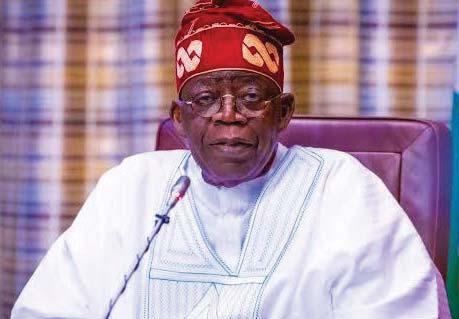
This takes us back to the fine distinction that Amartya Sen (the economics Nobel laureate) and others have made about the intrinsic and instrumental values of democracy. With its suite of guaranteed freedoms, democracy extends the voice, the agency and the innate the worth of the human. This is the intrinsic value of democracy. By itself, democracy is thus valuable.
But it is also widely expected that democracy should also translate to citizens having the kind of life that they have reason to value—in short, to a marked improvement in their material conditions. In ‘Democracy as a Universal Value’, ‘Development as Freedom’ and other seminal works, Sen has argued that the checks and balances, the freedoms, and the power to change governments imbue democracies
with incentive to deliver economic growth and prosperity. This is the instrumental value: democracy serving as an instrument, a means to a larger end that is more concrete and more meaningful to citizens. It must be said that this instrumental link is at best tenuous. For a start, the strongest incentive in this conception—the possibility of changing a non-performing government—does not exist equally in all democracies. Also, there are no guarantees that free and fair elections, respect for rule of law, and the presence of accountable governance will automatically translate to economic growth or to shared prosperity. You can have a decent democracy and not have a decent economy, and you can sadly be deficient in both. True, the countries that rank highest on
Hurray! The house of reps has passed the bill to return to the old national anthem: “Nigeria we hail thee/Our own dear native land…” The speed with which it was passed showed a sense of urgency and patriotism. The senate is still working on its own version. According to the proponents, ‘Arise O Compatriots’ has not helped Nigeria develop since 1978 when it was introduced. I am so excited by this development. Soon, ‘Nigeria We Hail Thee’, from my projections, will stop budget padding, blackmail, extortion, banditry, terrorism, kidnapping, unemployment and poverty in Nigeria. It will lead to a stronger naira (probably N1/$) and grow the GDP at 20 percent per annum. Wonderful.
measures of freedom/democracy are also the frontrunners in economic development. But this may just be another case of correlation not necessarily being the same as causation. What it takes to have a sound democracy is not necessarily what it takes to have a sound economy. Sometimes, the complexities and demands of a democracy may even stand in the way of economic development.
For us in Africa, the challenge then is how to deepen both the intrinsic and the instrumental values of our democracy. We are backsliding on the first as is evident from the growing gap between the demand for and the supply of quality democracy in most African countries. But more disturbingly, democracy is not translating to more jobs, better educational and health facilities, improved security of lives and property, higher standards of living etc., for a majority of our people. This instrumental deficit is what puts democracy at risk the most in Nigeria and the rest of the continent.
When people do not see a marked improvement, or when they experience a sharp deterioration, in their material conditions, they are unlikely to remain wedded to the idea of democracy for democracy’s sake. They become open to alternatives, and they can be easily seduced not just by military adventurists but also by those who hawk religious utopias and separatist designs. We have ample evidence from post-colonial Africa that the seductive alternatives rarely deliver the goods either.
To sustain democracy in Nigeria and other parts of Africa, we therefore need to work deliberately and conscientiously on two areas. The first is to improve the quality of democracy on the continent, and to use legislated quotas and participatory mechanisms to compensate for some of the observed lapses of representative democracy. The second is to build more prosperous and equitable economies. We need more democracy, no doubt. But we need greater and more evenly spread prosperity too. And we don’t have the luxury of prioritising one over the other.
email:Duro.Ikhazuagbe@thisdaylive.com
Red Devils sneak back into Europa League via 2-1 victory at Wembley
Duro Ikhazuagbe M
anchester United produced their best performance of a mediocre season to upset Manchester City 2-1 in the
Kobbie Mainoo put Unitedthe break to win the trophy Champions City, bidsuccessive seasons, were when Garnacho tapped home after a defensive

as
Tthe remainmatchdays of the Referees to stay true toimproved performances of competitiveness of thecontroversy and unneces-
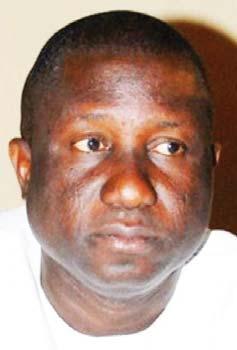
Elegbeleye
Rohr Lists Benin Republic Squad to Face Eagles Manchester United defeated Manchester City 2-1 to lift the English FA Cup at the Wembley...on Saturday evening City woke up in the sec-87th minute for substitute for next season’s Europa It however remains to be seen if this victory
enyan runners made a of prizes at stake in the men and
winner of the men’s race, to match the course record
the 2nd Vice President of incompetence and bias in “The NPFL and the NFF have shown from the start of the season that
Referees as a way of the House Committee on The season was paused after Matchday 32 to in the CAF Confederationthe front-runners for the
Duro Ikhazuagbe was another Kenyan Top Three -
Ebenyo, the champion was out to watch the race with his rewarded with the top price

In the squad are 19 profesRohr said at a press conferThe team is expected to on Monday and train on the some of their matches at the K
Head Coach the opposition, Gernot Rohr has named his Benin





“We need to remind the Tinubu administration that Kano State is known for peace and harmony, spanning thousands of years and any attempt to destablise the peace of the Land of Commerce shall be resisted” – Former Vice President Atiku Abubakar accusing President Bola Tinubu of providing security cover to the deposed Emir of Kano, Aminu Ado Bayero to return to Kano.
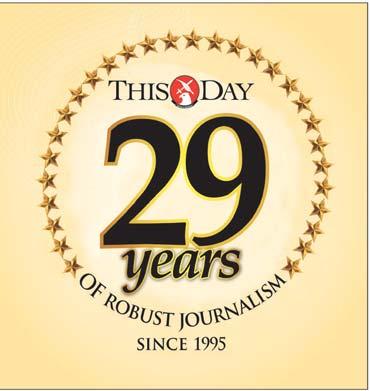
simon.kolawole@thisdaylive.com, sms: 0805 500 1961

Time flies. It does. Our latest experience of democracy is almost a quarter of a century old. I was in Abuja on May 29, 1999 when Gen Abdulsalami Abubakar handed over power to Chief Olusegun Obasanjo. Well, I was not at the Eagle Square. I was in the THISDAY backroom team that coordinated the coverage. From a hotel room, we monitored proceedings on TV. That was the second military-to-civilian transition, the first having taken place on October 1, 1979, when Gen Olusegun Obasanjo handed over to Alhaji Shehu Shagari at the Tafawa Balewa Square, Lagos. The parade commander at the 1979 handover ceremony was a certain Lt Col Abdulsalami Abubakar. You can’t make that up! I was born under military rule and started primary school under military rule. Although Shagari was president when I entered secondary school, the military was soon back in power and I spent my teenage years as a subject of military dictatorship. I did my national service under military rule. I started my journalism career under military rule. The long and short of it is that for most of my life until 1999, I had known no other form of government apart from military rule. I was brought up hearing command-and-control expressions like “order” and “with immediate effect”. I was used to seeing Nigerians being
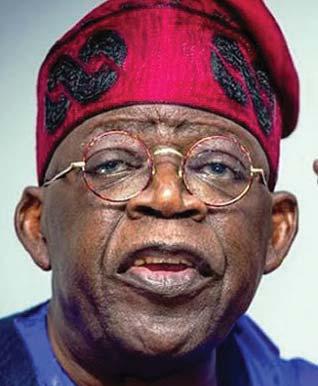
chased off the road for convoys. I was used to curfews on election days. At the handover, which the CNN took live, Obasanjo promised to fight corruption. I liked the determination on his face, but that
was probably where he, or we, began to get it twisted. Whereas the president, as the country’s leader, has to set the right tone and signal in the anti-corruption war, it cannot be entirely on his shoulders. In a country that has 36 governors, 469 federal lawmakers, 993 state legislators and 8,809 councillors as well as thousands of federal and state judges, how did fighting graft become the duty of one person? It was probably because of the “strongman” mindset that we had. This later became a powerful weapon that helped install Afrodemocracy in Nigeria.
Afrodemocracy is the pseudo democracy widely practised in many African countries. It imitates core features of popular democracy such as elections and representation. In reality, Afrodemocracy is a glorified monarchy, with the president sometimes referred to as “Baba” — roughly translated “father” or, more appropriately, “demigod”. This “babarism” enables despotism. Afrodemocracy easily falls under what Steven Levitsky and Lucan A. Way, political science scholars, call “competitive authoritarianism” where “formal democratic institutions are widely viewed as the principal means of obtaining and exercising political authority” but is effectively a diminished form of authoritarianism.
I have quoted Levitsky and Way a number of times in this column because their words are so spot on, and I will do it again: “Although
incumbents in competitive authoritarian regimes may routinely manipulate formal democratic rules, they are unable to eliminate them or reduce them to a mere facade. Rather than openly violating democratic rules (for example, by banning or repressing the opposition and the media), incumbents are more likely to use bribery, co-optation, and more subtle forms of persecution, such as the use of tax authorities, compliant judiciaries, and other state agencies to ‘legally’ harass, persecute, or extort cooperative behaviour from critics.” Touche!
In Afrodemocracy, elections are mostly superficial. They are meant to impose legitimacy. Elections are patently incomplete without rigging, vote buying and varying degrees of violence, including killing. State institutions often compromise the process, based on either “instructions from above” or financial inducement, or both. Many voters expect some form of inducement or reward too. The electoral system is stained from start to finish. Virtually all the political parties rig in their strongholds. Indeed, the competition is always about not being outrigged. But we have successfully deceived ourselves into thinking it is only the winner that rigs and the losers are saints. So it goes. Conversely, in a mature democracy, every

The major conclusion of a midweek summit in Abuja was that Nigeria and the rest of Africa need to deepen the practice of democracy, not abandon it. This is a timely and important message in the context of the recent rash of coups in West Africa and as Nigeria marks 25 years of unbroken civil rule this week. It is a message I fully endorse. The summit, which focussed on the state of democracy in Africa, was organised by the Shehu Musa Yar’Adua Foundation (SMYF) and the Olusegun Obasanjo Presidential Library, and supported by Ford Foundation and Trust Africa. It was a well-organised, inter-generational event, with speakers and participants drawn from within and outside the continent. Interestingly, the first president of Nigeria’s 25-year-old republic, Chief Olusegun Obasanjo, delivered the keynote address while the current president, Asiwaju Bola Tinubu, delivered a special address through his deputy, Senator Kashim Shettima.
As expected, the summit served as a forum for ventilating ideas—some fresh, some stale; some complementary and some clashing. On the whole, however, there seemed to be
a consensus: that Nigeria and Africa need a democracy that works for, and delivers prosperity to, the vast majority of their citizens, not just a few. This consensus aligns with my conclusion on this page three weeks ago when I wrote on the quarter of a century of continuous civil rule in Nigeria.
I will share my three key takeaways from the summit, then conclude by expanding on my earlier points on democracy and development.
My first takeaway, supported by data, is that the growing frustration with democracy on the continent is not necessarily synonymous with support for military rule or any other form of autocracy. Rather, it is an earnest yearning for improvement in the content and the value of democracy itself. Professor Gyimah Boadi, co-founder of Afrobarometer, underscored this point with the latest data from his reputable polling organisation.
The majority of those polled by Afrobarometer in its 2021/2023 series rejected one-man rule, one-party rule and military rule by 80%, 78% and 66% respectively. On the contrary, 66% preferred democracy to any other kind of government. Also, there was overwhelming support for what can
be classified as proxies for the norms of democracy such as regular elections (75%), presidential compliance with court rulings (73%), constitutional term limits (72%), parliamentary oversight of president (66%) etc.
“When some African leaders say their people do not want democracy, I know they are lying,” said Boadi. “Ordinary citizens across Africa desire to live under governments that are democratic and accountable. These aspirations have persisted overtime though aspects of the data portend danger. Delivery by leaders/governments has typically fallen short of citizens expectations.”
The last sentence is the real crux of the matter. Afrobarometer’s data shows a 7% drop in the support for democracy in Africa between 2011 and 2023. The decline is evident overtime in the gap between the demand for and the supply of democracy in the polled countries. So, while there is still a high preference for democracy in Africa, the perception about the quality of democracy practised is declining. For example, the percentage of those who think their countries operate a democracy (either full democracy or democracy with minor problems) declined from 54% in 2011 to 46% in 2023 and the proportion of those
who think recent elections in their countries were free and fair fell from 66% in 2011 to 59% in 2023. In the same vein, the percentage of those who believe they are free to say what is on their minds declined from 75% to 69% over the same period.
To be sure, the decline in the support for democracy and in the opposition to military rule should be of grave concern. But a nuanced reading will show that the dip is actually a protest against the perceived fall in the quality of the practice of democracy in those countries. So, what to do is to improve the quality of elections, the respect for freedoms and sanctity of the rule of law etc. Interestingly, these norms are not guaranteed by military rule or other forms of autocracy, which a majority of polled Africans reject. As Leena Hoffman, an associate fellow of the Africa Programme at Chatham House, succinctly captured it: Nigeria and Africa just need more democracy to cure the observed decline in the quality of their democracy. Touche!
My second takeaway is that we need to further risk-proof democracy on the
Continued on page 70